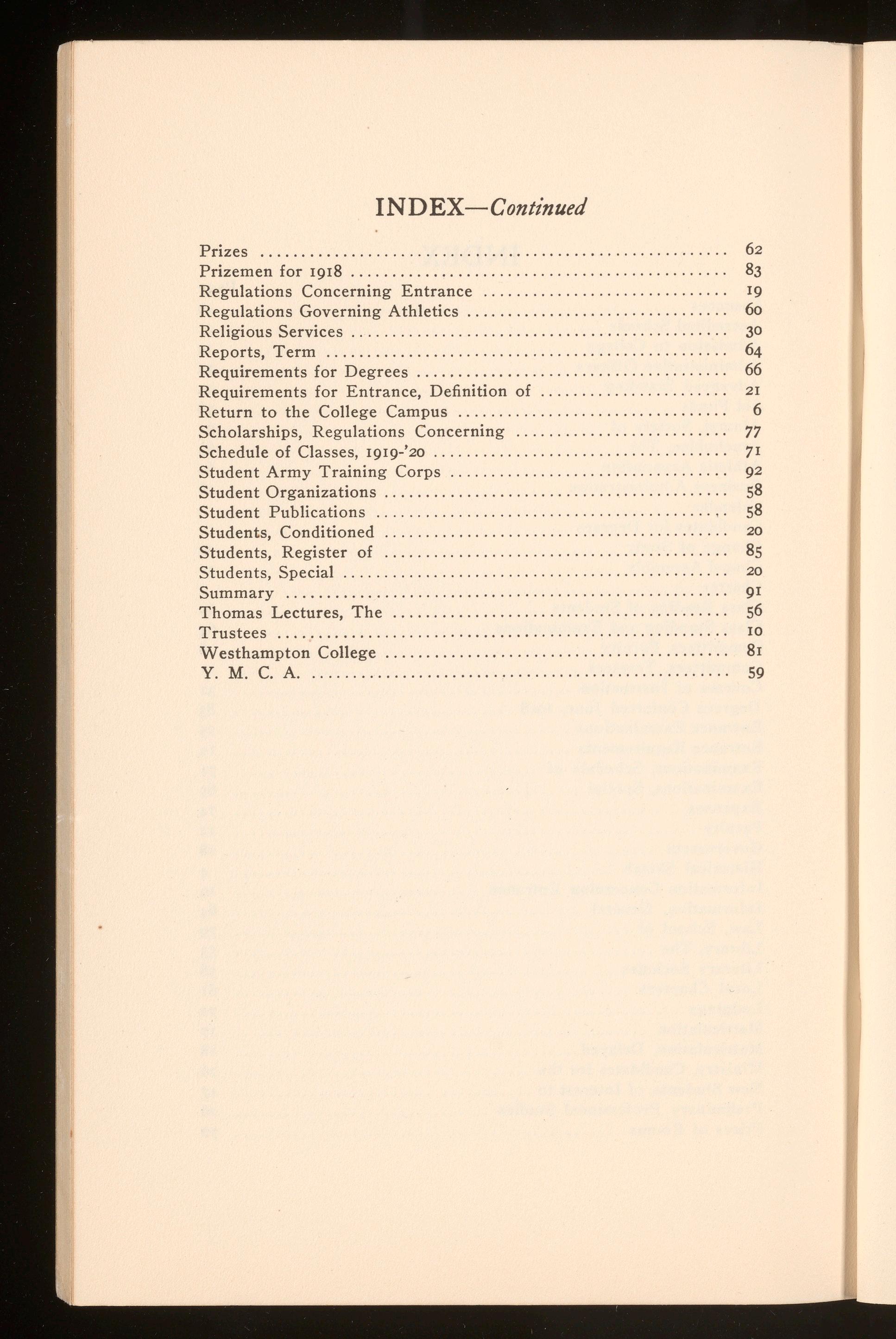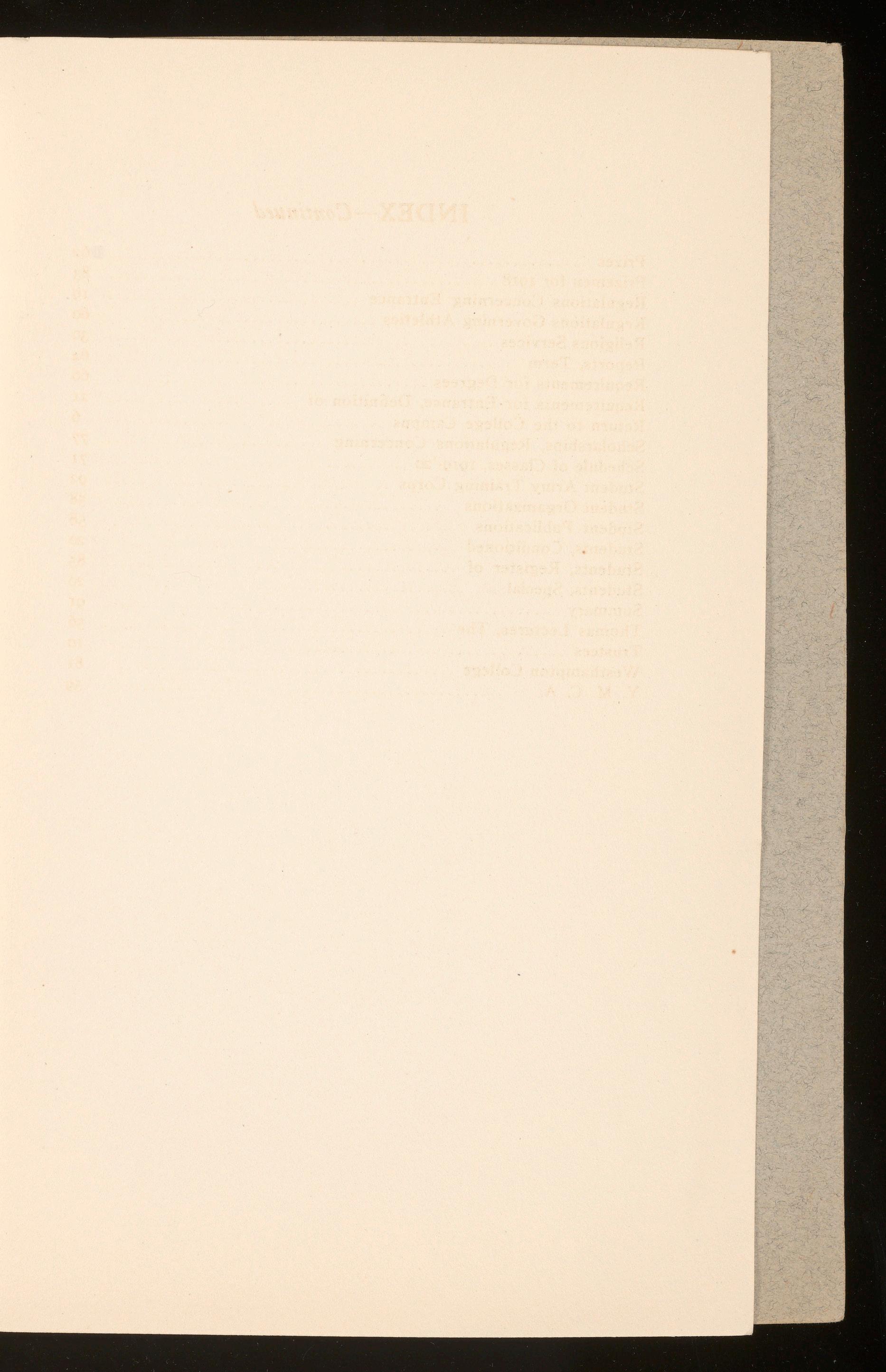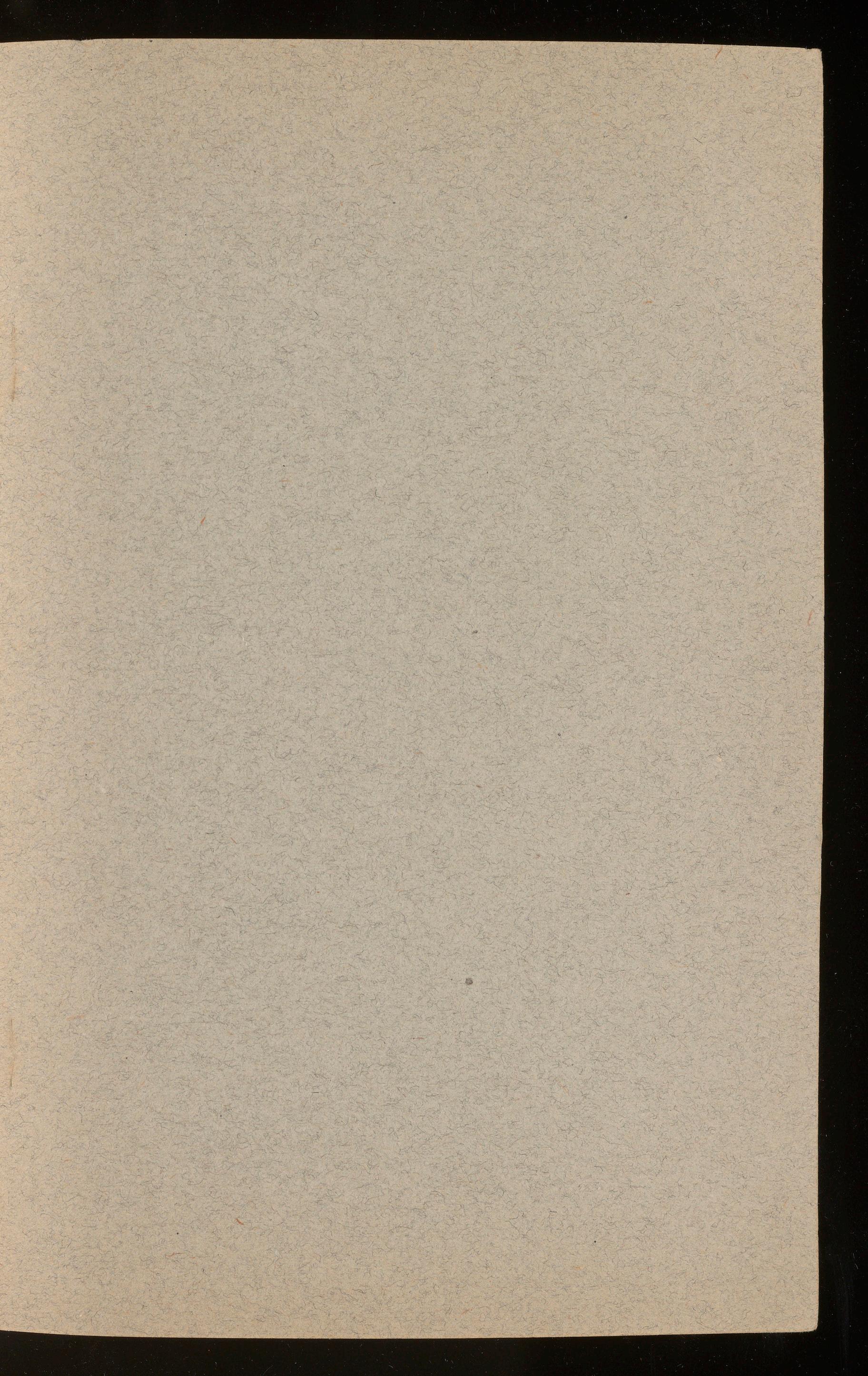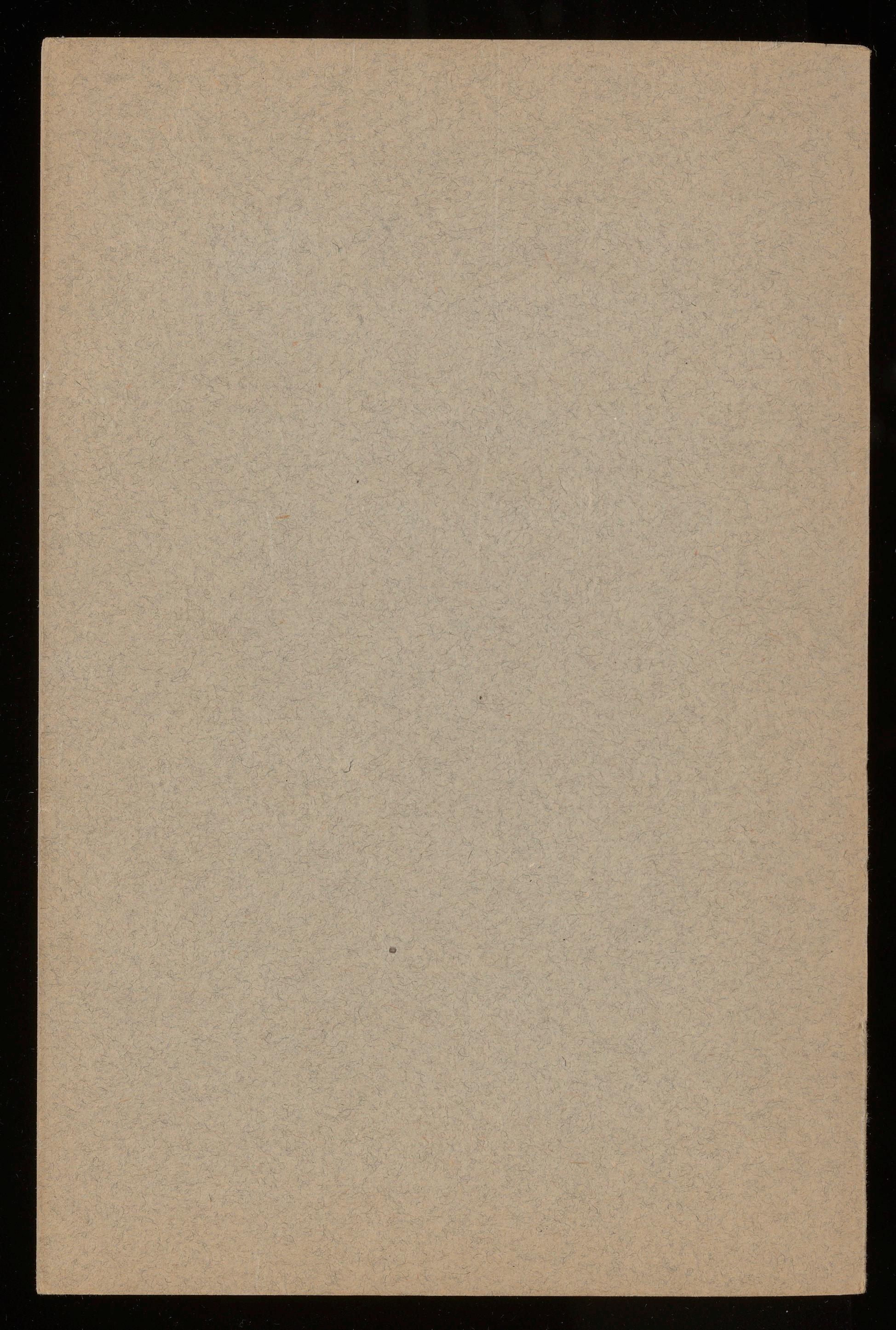




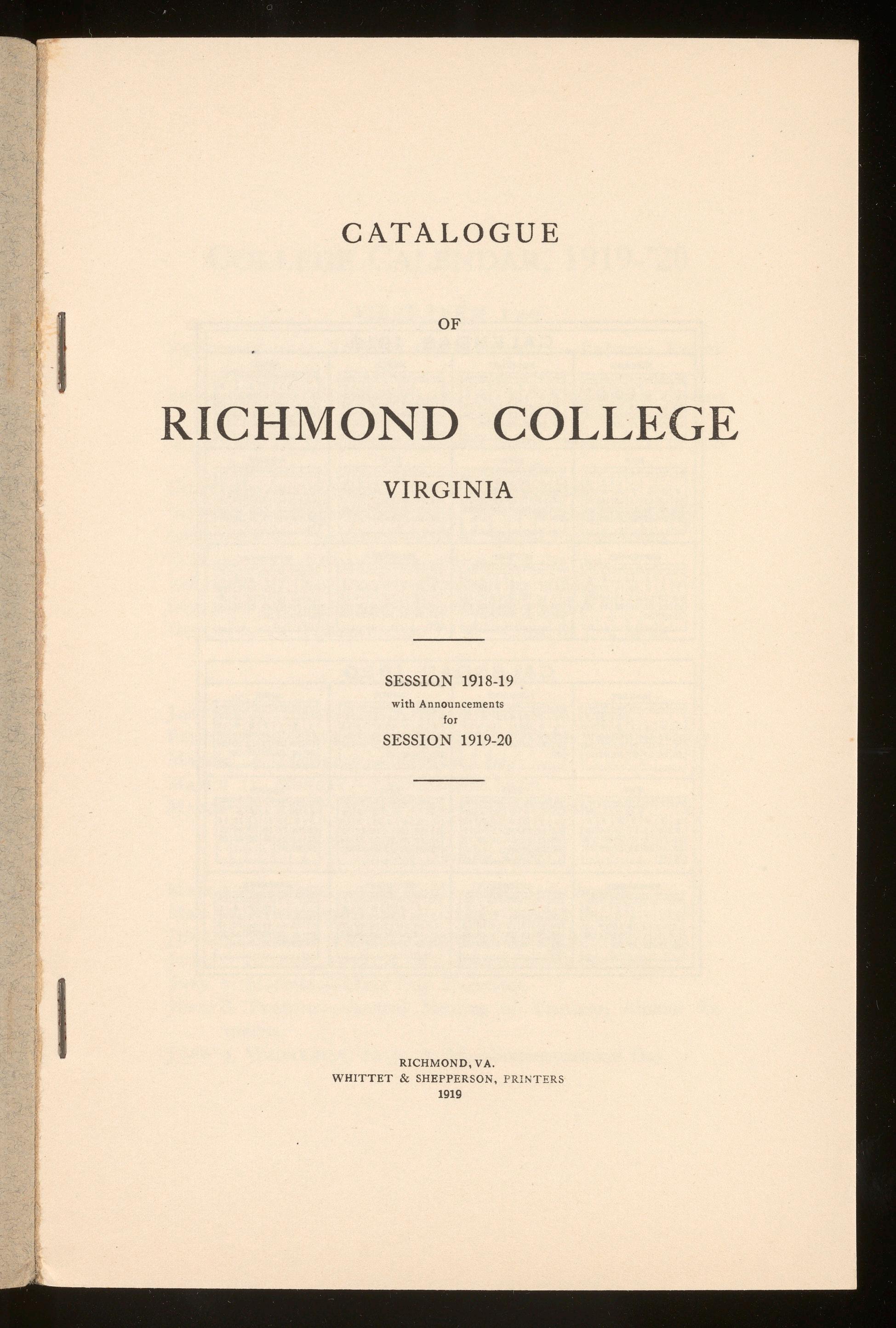
SESSION 1918-19 with Announcements for SESSION 1919-20
RICHMOND, VA.
WHITTET & SHEPPERSON, PRINTERS 1919

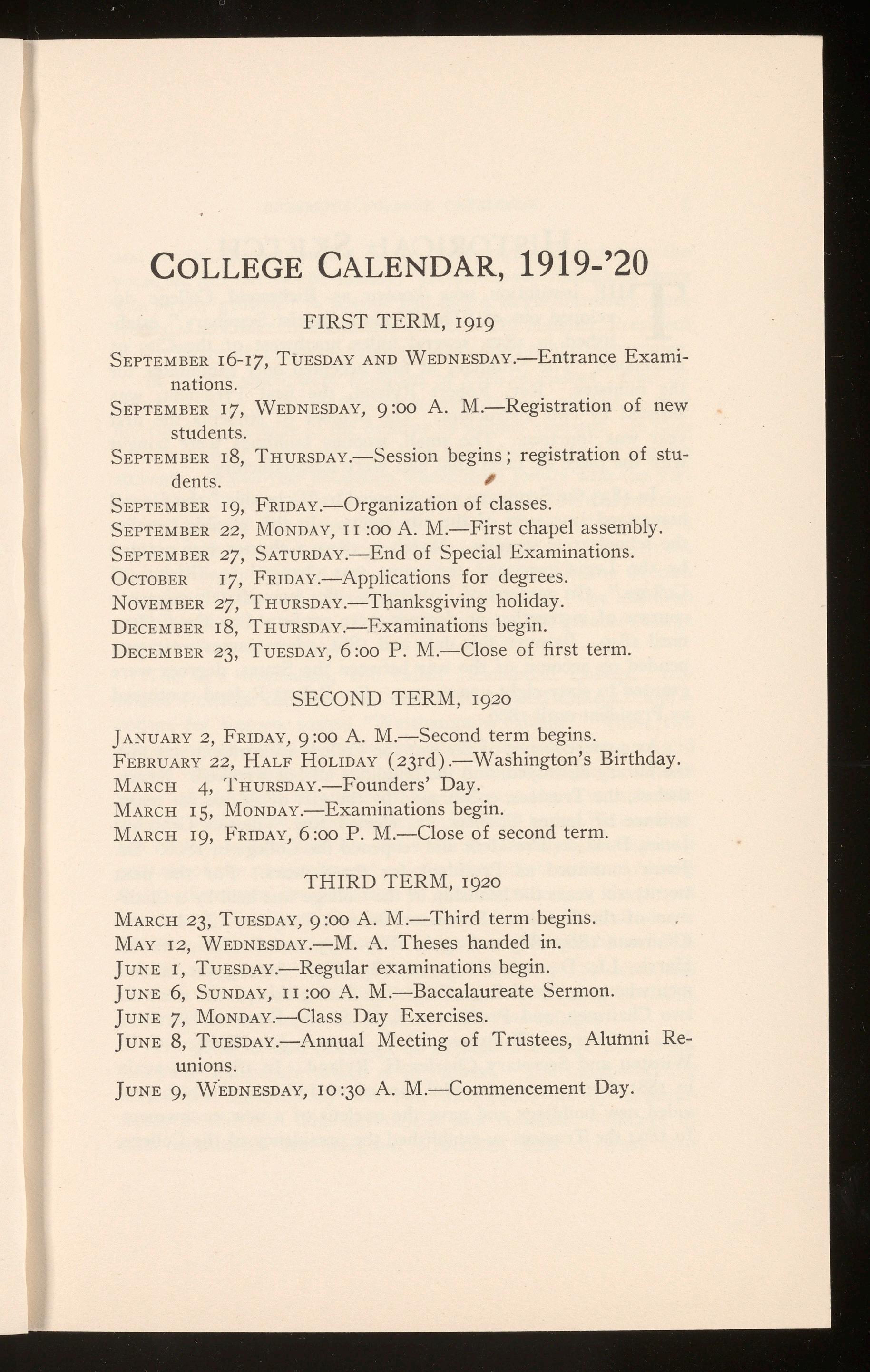
FIRST TERM, 1919
SEPTEMBER16-17, TUESDAYANDWEDNESDAY.-Entrance Examinations.
SEPTEMBER17, WEDNESDAY,9 :oo A. M.-Registration of new students.
SEPTEMBER18, THURSDAY.-Session begins; registration of students. ,
SEPTEMBER19, FRIDAY.-Organization of classes.
SEPTEMBER22, MoNDAY,r r :oo A. M.-First chapel assembly.
SEPTEMBER27, SATURDAY.-End of Special Examinations.
OCTOBER 17, FRIDAY.-Applications for degrees.
NOVEMBER27, THURSDAY.-Thanksgiving holiday.
DECEMBER18, THURSDAY.-Examinations begin.
DECEMBER23, TUESDAY,6 :oo P. M.-Close of first term.
TERM, 1920
JANUARY2, FRIDAY,9:00 A. M.-Second term begins.
FEBRUARY22, HALF HOLIDAY(23rd) .-Washington's Birthday.
MARCH 4, THuRSDAY.-Founders' Day.
MARCH 15, MoNDAY.-Examinations begin.
MARCH 19, FRIDAY,6 :oo P. M.-Close of second term.
TERM, 1920
MARCH 23, TUESDAY,9 :oo A. M.-Third term begins.
MAY 12, WEDNESDAY.-M. A. Theses handed in.
JUNE l, TuESDAY.-Regular examinations begin.
JuNE 6, SuNDAY, rr :oo A. M.-Baccalaureate Sermon.
JUNE 7, MoNDAY.-Class Day Exercises.
JuNE 8, TuESDAY.-Annual Meeting of Trustees, Alutnni Reunions.
JuNE 9, WEDNESDAY,10:30 A. M.-Commencement Day.

THE institution now known as Richmond College developed out of "The Virginia Baptist Seminary," established in 1832, several miles northwest of the City of Richmond. The Seminary at first accepted only candidates for the ministry. Rev. Robert Ryland, the first President, was assisted by two instructors. The number of students the first year was fourteen. The small, wooden buildings were bought with the piece of farm land and were unsatisfactory.
In 1833 the Seminary was removed to "Columbia," the Haxall homestead just west of the city limits. In this eligible location the school grew steadily. March 4, 1840, a charter was granted by the Legislature and the name was changed to "Richmond College." On account of inability to offer immediately adequate courses of instruction no degrees were conferred by the College until 1849. Between this date and 1861, when classes were suspended on account of the war between the States, degrees were granted to sixty-eight young men. Dr. Robert Ryland continued as President until 1866.
As a consequence of the war the College endowment was lost, the library destroyed, and the buildings all but wrecked. Nevertheless, the Trustees, encouraged by the gift of $5,000 for maintenance by James Thomas, Jr., elected Rev. Tiberius Gracchus Jones, D. D., as President and reopened the College in 1866. Dr. Jones continued as President for three years. For the next twenty-six years the headship of the College was held by a Chairman of the Faculty. Professor Bennett Puryear, LL. D., was Chairman 1869-1885 and again 1889-1895, and Professor H. H. Harris, LL. D., was Chairman 1885-1889. Among the notable men who gave the College distinction during this period were the two Chairmen, and Professors E. B. Smith, Edmund Harrison, J. L. M. Curry, A. B. Brown, W. D. Thomas, John Pollard, C.H. Winston and Secretary Charles H. Ryland. In 1873 and again in 1881 there were successful campaigns for money which provided new buildings and gave the nucleus of a new endowment. In 1894 the Trustees re-established the presidency of the College,
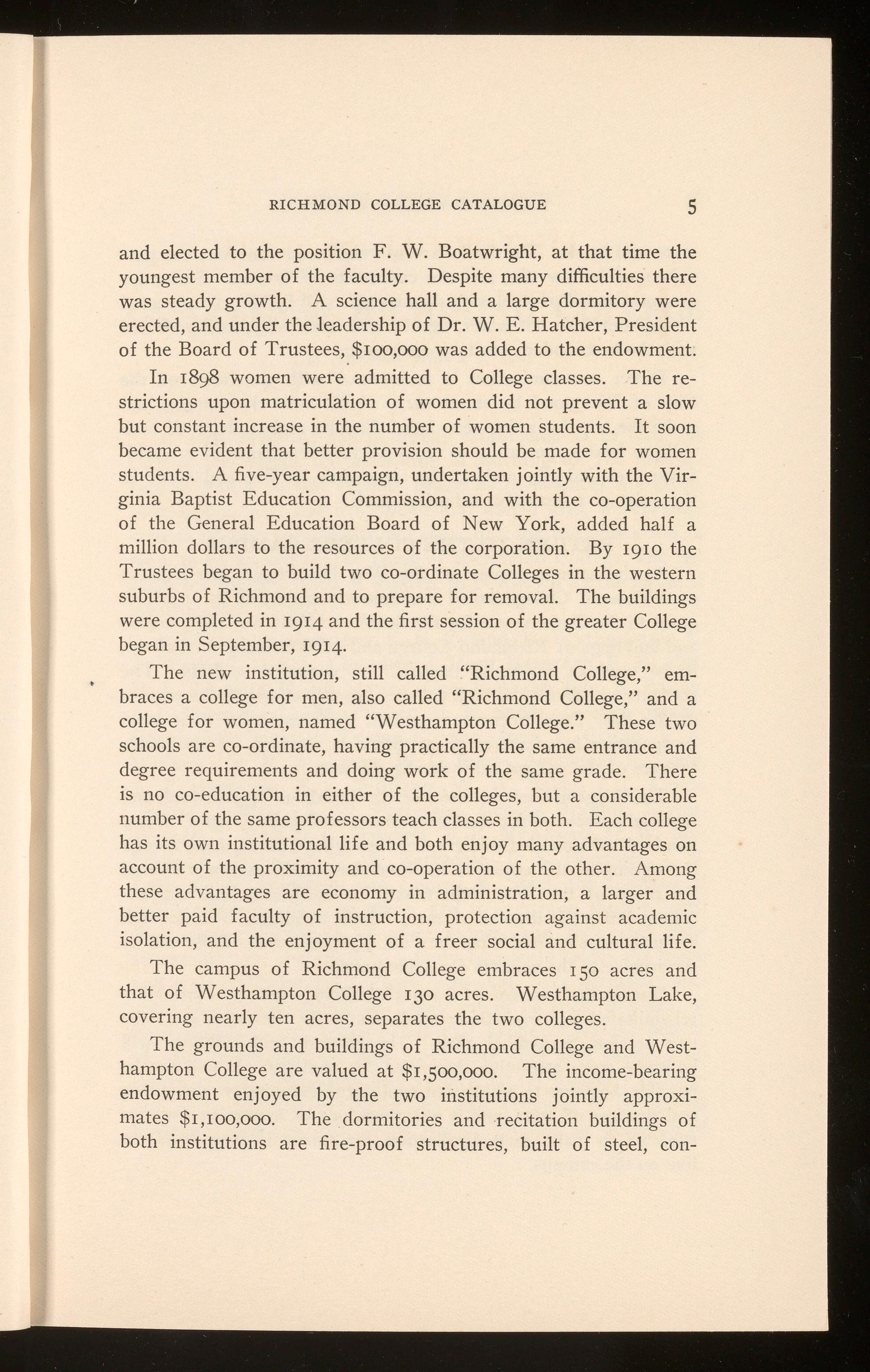
and elected to the position F. W. Boatwright, at that time the youngest member of the faculty. Despite many difficulties there was steady growth. A science hall and a large dormitory were erected, and under the leadership of Dr. W. E. Hatcher, President of the Board of Trustees, $100,000 was added to the endowment.
In 1898 women were admitted to College classes The restrictions upon matriculation of women did not prevent a slow but constant increase in the number of women students. It soon became evident that better provision should be made for women students. A five-year campaign, undertaken jointly with the Virginia Baptist Education Commission, and with the co-operation of the General Education Board of New York, added half a million dollars to the resources of the corporation. By 1910 the Trustees began to build two co-ordinate Colleges in the western suburbs of Richmond and to prepare for removal. The buildings were completed in 1914 and the first session of the greater College began in September, 1914.
The new institution, still called "Richmond College," embraces a college for men, also called "Richmond College," and a college for women, named "Westhampton College." These two schools are co-ordinate, having practically the same entrance and degree requirements and doing work of the same grade. There is no co-education in either of the colleges, but a considerable number of the same professors teach classes in both. Each college has its own institutional life and both enjoy many advantages on account of the proximity and co-operation of the other. Among these advantages are economy in administration, a larger and better paid faculty of instruction, protection against academic isolation, and the enjoyment of a freer social and cultural life.
The campus of Richmond College embraces r 50 acres and that of Westhampton College 130 acres. Westhampton Lake, covering nearly ten acres, separates the two colleges.
The grounds and buildings of Richmond College and Westhampton College are valued at $1,500,000. The income-bearing endowment enjoyed by the two institutions jointly approximates $r,roo,ooo. The dormitories and -recitation buildings of both institutions are fire-proof structures, built of steel, con-
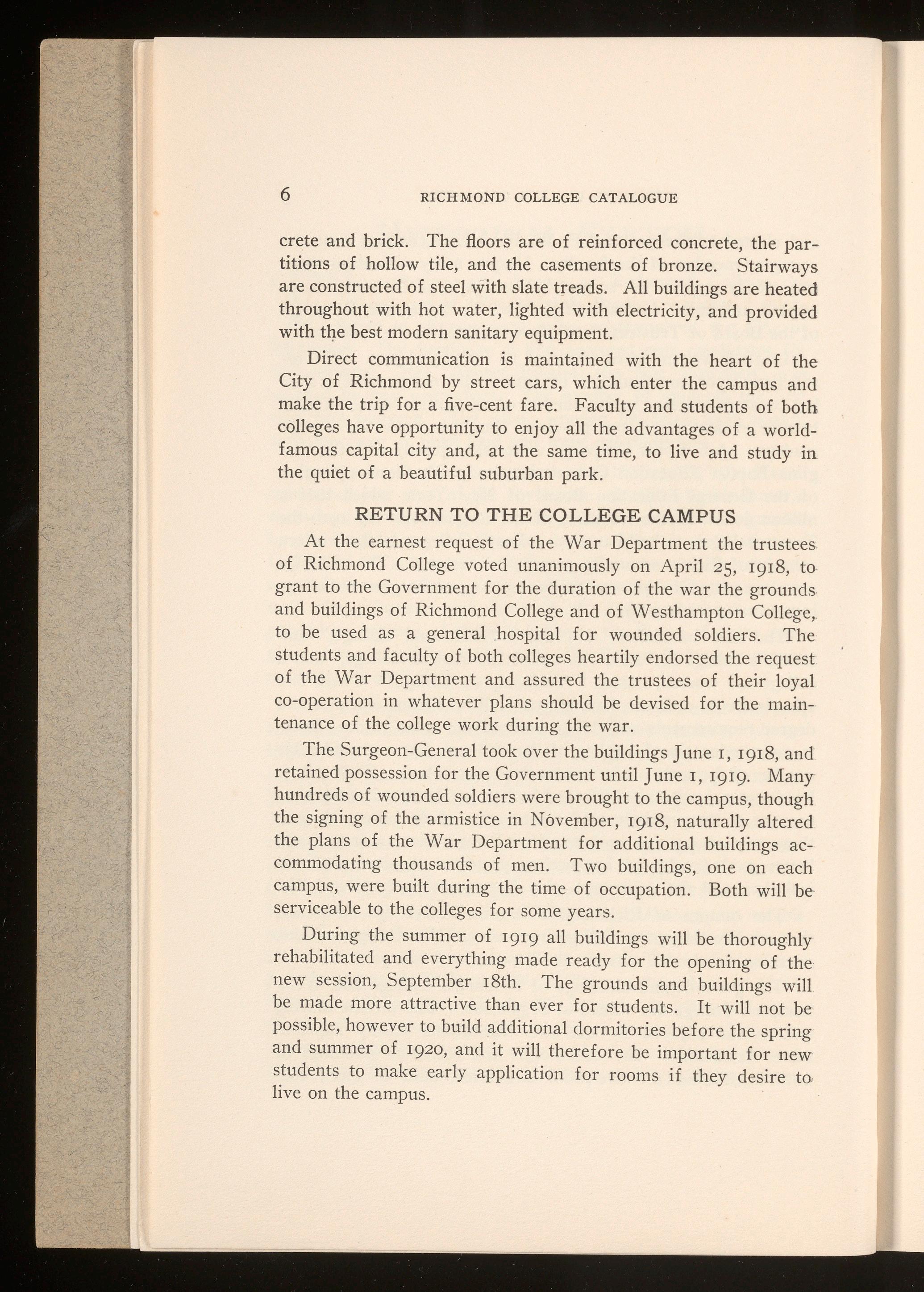
crete and brick. The floors are of reinforced concrete, the partitions of hollow tile, and the casements of bronze. Stairways are constructed of steel with slate treads. All buildings are heated throughout with hot water, lighted with electricity, and provided with tl).e best modern sanitary equipment.
Direct communication is maintained with the heart of the City of Richmond by street cars, which enter the campus and make the trip for a five-cent fare. Faculty and students of both colleges have opportunity to enjoy all the advantages of a worldfamous capital city and, at the same time, to live and study in the quiet of a beautiful suburban park.
At the earnest request of the War Department the trustees of Richmond College voted unanimously on April 25, 1918, to grant to the Government for the duration of the war the grounds and buildings of Richmond College and of Westhampton College, to be used as a general hospital for wounded soldiers. The students and faculty of both colleges heartily endorsed the request of the War Department and assured the trustees of their loyal co-operation in whatever plans should be devised for the maintenance of the college work during the war.
The Surgeon-General took over the buildings June 1, 1918, and retained possession for the Government until June I, 1919. Many hundreds of wounded soldiers were brought to the campus, though the signing of the armistice in November, 1918, naturally altered the plans of the War Department for additional buildings accommodating thousands of men. Two buildings, one on each campus, were built during the time of occupation . Both will beserviceable to the colleges for some years.
During the summer of 1919 all buildings will be thoroughly rehabilitated and everything made ready for the opening of the new session, September 18th. The grounds and buildings will be made more attractive than ever for students. It will not be possible, however to build additional dormitories before the spring and summer of 1920, and it will therefore be important for new students to make early application for rooms if they desire t0, live on the campus.
(As AMENDED MARCH 3, 1914)
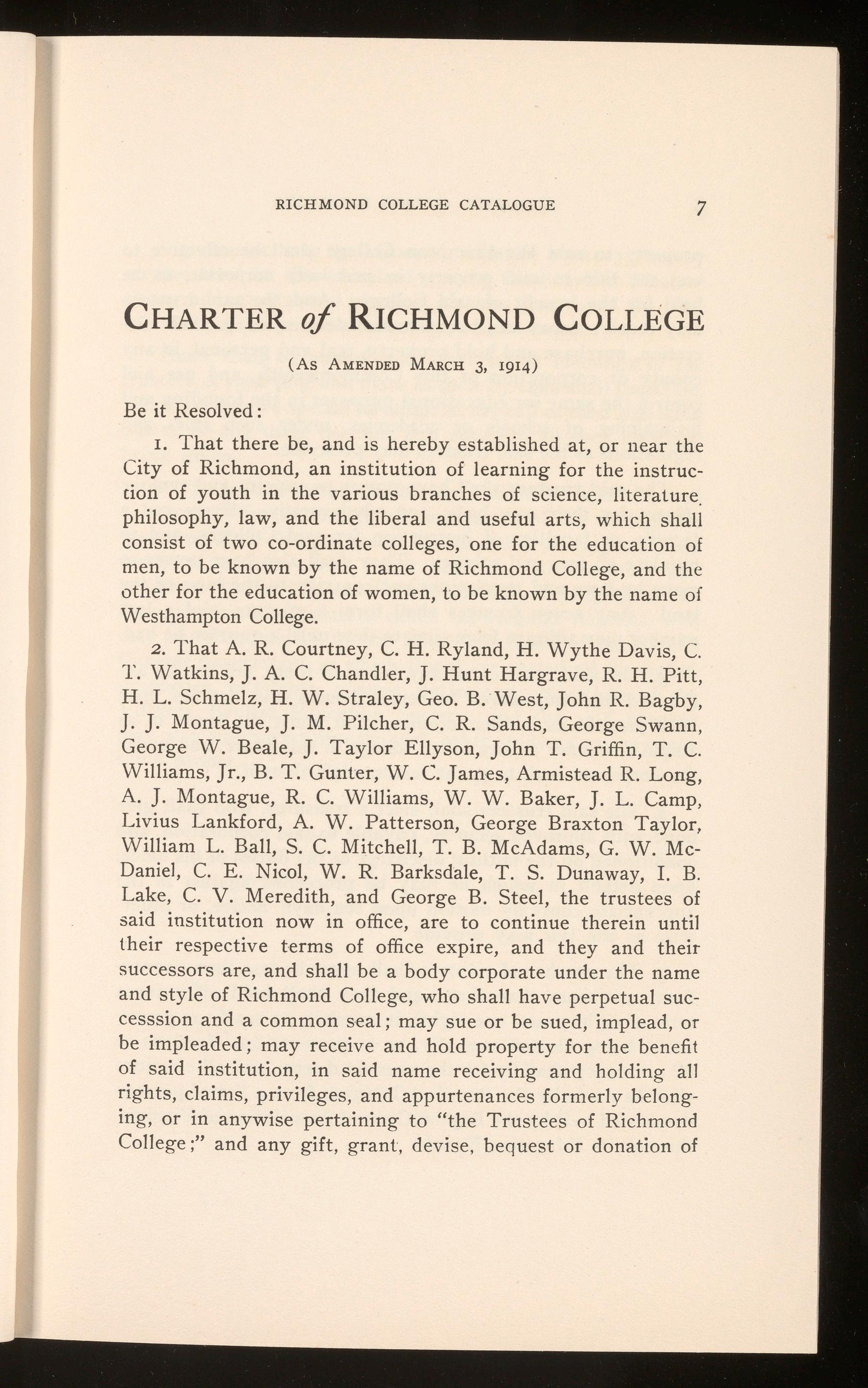
Be it Resolved:
I. That there be, and is hereby established at, or near the City of Richmond, an institution of learning for the instruction of youth in the various branches of science, literature. philosophy, law, and the liberal and useful arts, which shall consist of two co-ordinate colleges, one for the education of men, to be known by the name of Richmond College, and the other for the education of women, to be known by the name of Westhampton College.
2. That A. R. Courtney, C.H. Ryland, H. Wythe Davis, C. T. Watkins, J. A. C. Chandler, J. Hunt Hargrave, R. H. Pitt, H. L. Schmelz, H. W. Straley, Geo. B. West, John R. Bagby, ]. J. Montague, J. M. Pilcher, C. R. Sands, George Swann, George W. Beale, J. Taylor Ellyson, John T. Griffin, T. C. Williams, Jr., B. T. Gunter, W. C. James, Armistead R. Long, A. J. Montague, R. C. Williams, W. W. Baker, J. L. Camp, Livius Lankford, A. W. Patterson, George Braxton Taylor, William L. Ball, S. C. Mitchell, T. B. McAdams, G. W. McDaniel, C. E. Nicol, W. R. Barksdale, T. S. Dunaway, I. B. Lake, C. V. Meredith, and George B. Steel, the trustees of said institution now in office, are to continue therein until their respective terms of office expire, and they and their successors are, and shall be a body corporate under the name and style of Richmond College, who shall have perpetual successsion and a common seal; may sue or be sued, implead, or be imp leaded; may receive and hold property for the benefit of said institution, in said name receiving and holding all rights, claims, privileges, and appurtenances formerly belonging, or in anywise pertaining to "the Trustees of Richmond College;" and any gift, grant, devise, bequest or donation of
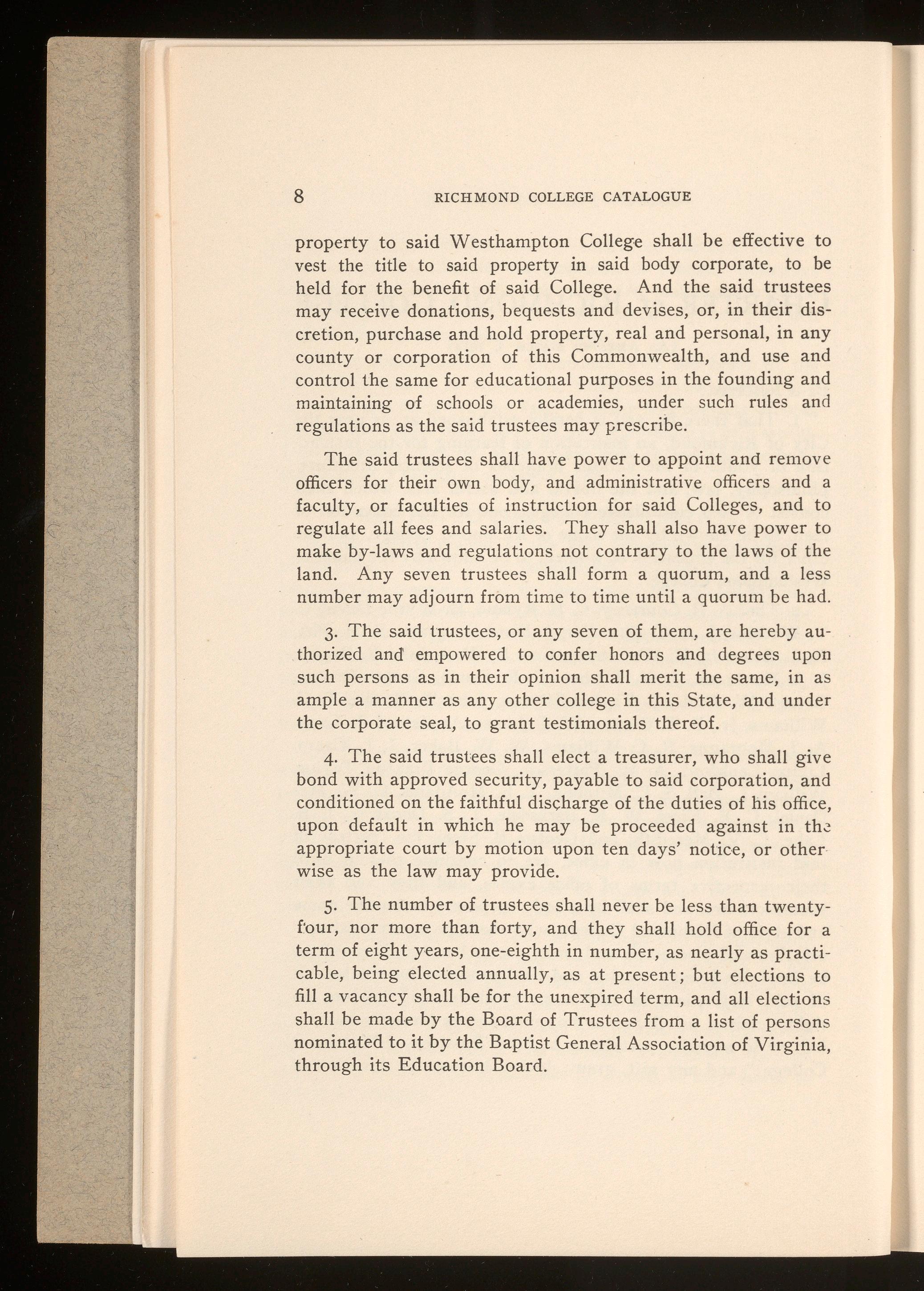
property to said Westhampton College shall be effective to vest the title to said property in said body corporate, to be held for the benefit of said College. And the said trustees may receive donations, bequests and devises, or, in their discretion, purchase and hold property, real and personal, in any county or corporation of this Commonwealth, and use and control the same for educational purposes in the founding and maintaining of schools or academies, under such rules and regulations as the said trustees may prescribe.
The said trustees shall have power to appoint and remove officers for their own body, and administrative officers and a faculty, or faculties of instruction for said Colleges, and to regulate all fees and salaries. They shall also have power to make by-laws and regulations not contrary to the laws of the land. Any seven trustees shall form a quorum, and a less number may adjourn from time to time until a quorum be had.
3. The said trustees, or any seven of them, are hereby authorized and empowered to confer honors and degrees upon such persons as in their opinion shall merit the same, in as ample a manner as any other college in this State, and under the corporate seal, to grant testimonials thereof.
4. The said trustees shall elect a treasurer, who shall give bond with approved security, payable to said corporation, and conditioned on the faithful dis<;:harge of the duties of his office, upon default in which he may be proceeded against in th~ appropriate court by motion upon ten days' notic -e, or otherwise as the law may provide.
5. The number of trustees shall never be less than twentyf'our, nor more than forty, and they shall hold office for a term of eight years, one-eighth in number, as nearly as practicable, being elected annually, as at present; but elections to fill a vacancy shall be for the unexpired term, and all elections shall be made by the Board of Trustees from a list of persons nominated to it by the Baptist General Association of Virginia, through its Education Board.
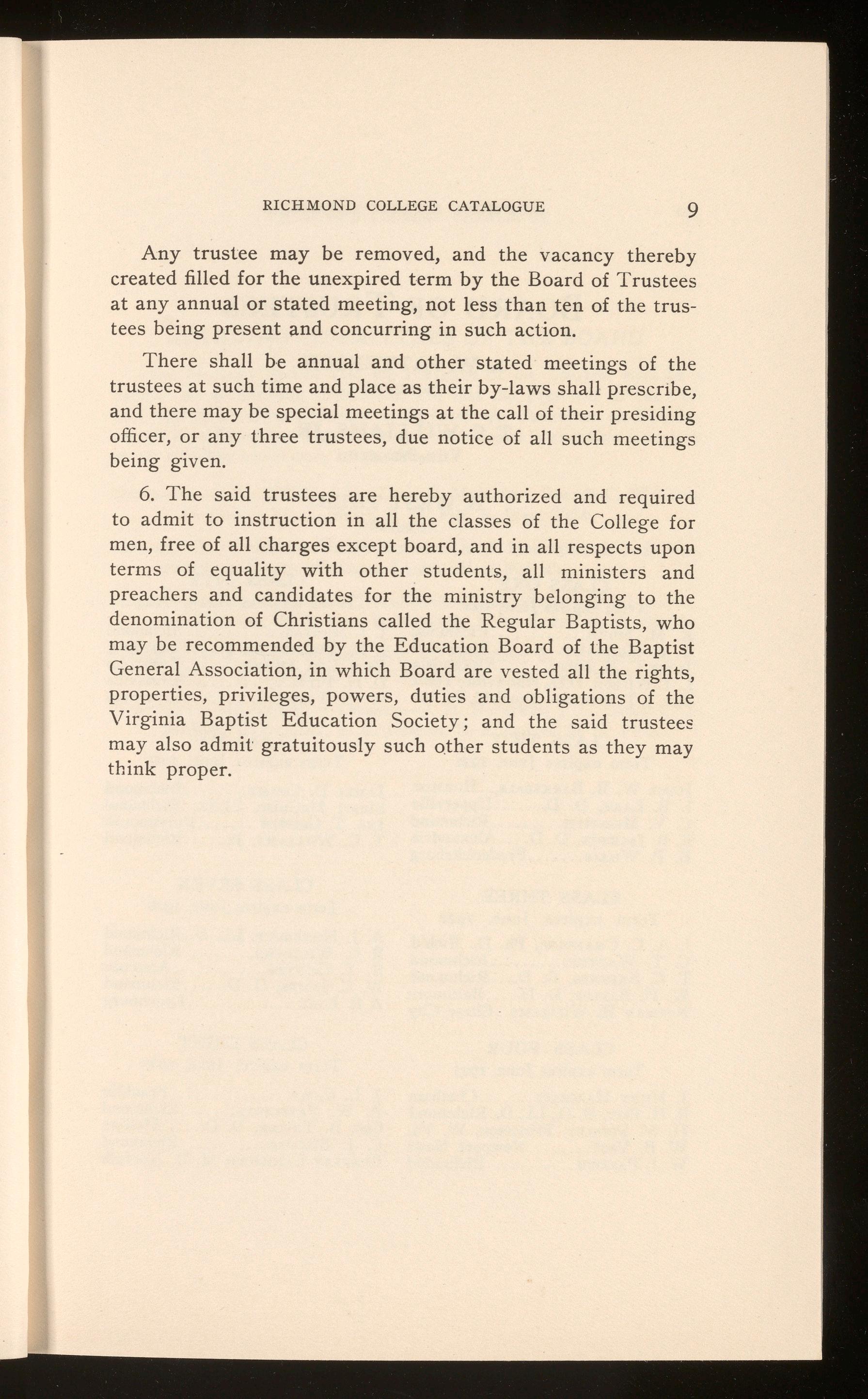
Any trustee may be removed, and the vacancy thereby created filled for the unexpired term by the Board of Trustees at any annual or stated meeting, not less than ten of the trustees being present and concurring in such action.
There shall be annual and other stated meetings of the trustees at such time and place as their by-laws shall prescribe, and there may be special meetings at the call of their presiding officer, or any thr •ee trustees, due notice of all such meetings being given.
6. The said trustees are hereby authorized and required to admit to instruction in all the classes of the College for men, free of all charges except board, and in all respects upon terms of equality with other students, all ministers and preachers and candidates for the ministry belonging to the denomination of Christians called the Regular Baptists, who may be recommended by the Education Board of the Baptist General Association, in which Board are vested all the rights, properties, privileges, powers, duties and obligations of the Virginia Baptist Education Society; and the said trusteeo: may also admit gratuitously such o.ther students as they may think proper.
RICHMOND COLLEGE CATALOGUE
A. W. PATTERSON PRESIDENT
T. C. WILLIAMS, JR. VICE-PRESIDENT
B. WEST TABB SECRETARY
CLASS ONE
Term expires June, 1920
R. M. Smith ..... Richmond
T. B. McADAMS. Richmond
JuDGE C. E N1coL... . .. Alexandria
L. T WILSON, D.D., Knoxville , Tenn.
REV.J. T. STIN SON,Bluefi eld , W Va
CLASS TWO
Term expires June, 1921
JUDGEw. R. BARKSDALE, .. Houston
I. B. LAKE, D. D ..... . Upperville
C. V. MEREDITH . ..... . .. Richmond
E . B. JACKSON,D D .... Alexandria
B P. WILLIS ....... Fredericksburg
CLASS THREE
Term expires June, 1922
J. A. C. CHANDLER,Ph. D., Rich'd
C. T. WATKINS . Richmond
T. C. SKINNER, D. D .... Richmond
W. H. BAYLOR , D. D ..... Baltimore
NoRMAN H. WILLIAMS.. Chase City
CLASS FOUR
Term expires June, 1923
J . HUNT HARGRAVE .. .... Chatham
R. H. PITT, D. D., LL. D., Richmond
H . W. STRALEY,Princeton, W. Va.
W. B VEST... .... Newport News
W. J. PARRISH ... Richmond

CLASS FIVE
Term expires June, 1924
J . J . MONTAGUE...... ... Richmond
J. M. PILCHER, D. D .... Petersburg
PROF. GEO. SWANN. .... .. Trenholm
D. H. PITTS......... .. Scottsville
W. S. FORBES . ...... Richmond
CLASS SIX
Term expires June, 1925
]AMES D. CRUMP.. . .. .. . Richmond
Stuart McGuire, LL.D., Richmond
JNo. T. GRIFFIN ...... Portsmouth
T. C. WILLIAMS, JR .. Richmond
CLASS SEVEN
Term expires June, 1926
A . J . MONTAGUE,LL. D .. Richmond
R C. WILLIAMS......... Richmond
B. T. GUNTER . .......... Accomac
W. C. JAMES, D. D .. . ... Richmond
A R. Lo NG . Lynchburg
CLASS EIGHT
T e rm expire s June , 1927
J. L. CAMP ........ Franklin
A W PATTERSON....... Richmond
GEo. B. TAYLOR,D. D ...... Hollins
C. J. BILLUPS........... Richmond
BURNLEY LANKFORD,M. D .. Norfolk

The By-Laws provide that the President of the Trustees shall be a m ember of all st'anding committees, and that the President of the College shall be ex-officio a member of all except the Committee on Nomination of New Trustees. The Secretary of the Board is ex-officio Secretary of all standing committees of the Board.
ExECUTIVE.-T. C. Williams, Jr., Thos. B. McAdams, Russell C. Williams , J. D. Crump, W. C. James, R. H Pitt, B West Tabb.
LIBRARY.-T. C. Skinner, Stuart McGuire, A. J. Montague, C. J. Billups , Professor Handy, Professor Lough, W. J. Parrish.
Am FUNDS (Scholarships and Donafions) -J. M. Pilcher, W. H . Baylor, J. T. Stinson, W. B. Vest, B. P. Willis, R. M. Smith, H. W. Straley .
NOMINATIONOF NEW TRUSTEEs.-W. R. Barksdale, B T. Gunter, A. R. Long, G. B . Taylor, N. H. Williams, I. B . Lake, John T. Griffin.
NOMINATIONFORHONORARYDEGREES.-]. H. Hargrave, J. L. Camp, C. T. Watkins, C. E. Nicol, E. B. Jackson, R. E. Gaines, D. H. Pitts.

FREDERICKWILLIAM RoATWRIGHT,M.A., LL. D., r Memorial Hall
President
ROBERTEDWARDLOVING,M.A., Ph. D., 3 Memorial Hall Acting Dean
WILLIAM PORTERSTONE, 4 Memorial Hall
Commanding Officer S. A. T. C.
BENJAMIN WEST TABB, B. A., 2 Memorial Hall
Treasurer and Registrar
MARION GARNETTRYLAND, B. A., B. S. Librarian
FACULTY OF INSTRUCTION
FREDERICKWILLIAM BOATWRIGHT,M. A., LL. D., Professor of Modern Languages. r Bostwick Lane.
M. A. Richmond College, 1888; LL. D. Mercer University, 1895; LL. D. Georgetown College, 1913; Assistant in Greek, Richmond College, 1887-'89; Student University of Halle and of the Sorbonne, 1889-'90; Professor of French and German since 1890; Student University of Leipsic, 1892; President since 1894.
ROBERTEDWIN GAINES, M. A., Litt. D., Professor of Mathematics. 3 Bostwick Lane, Campus.
M. A. Furman University, 1886; Litt. D. Furman University, 1go8; Student Johns Hopkins University, 1887-'88; Instructor in Wright's University School, Baltimore, 1888-'89; Harvard University, 18991900; Professor of Mathematics since 1890.
WILLIAM ASBURYHARRIS, M. A., Ph. D., Professor of Greek. 2 College A venue.
Fellow J_ohns Hopkins University, 1891-'92; Ph. D., ibid., 1892; M. A. Richmond College, 1886; Ph. D. Johns Hopkins University, 1892; Professor of Greek, Baylor University, 1893-1901; Professor of Greek smce 1901.
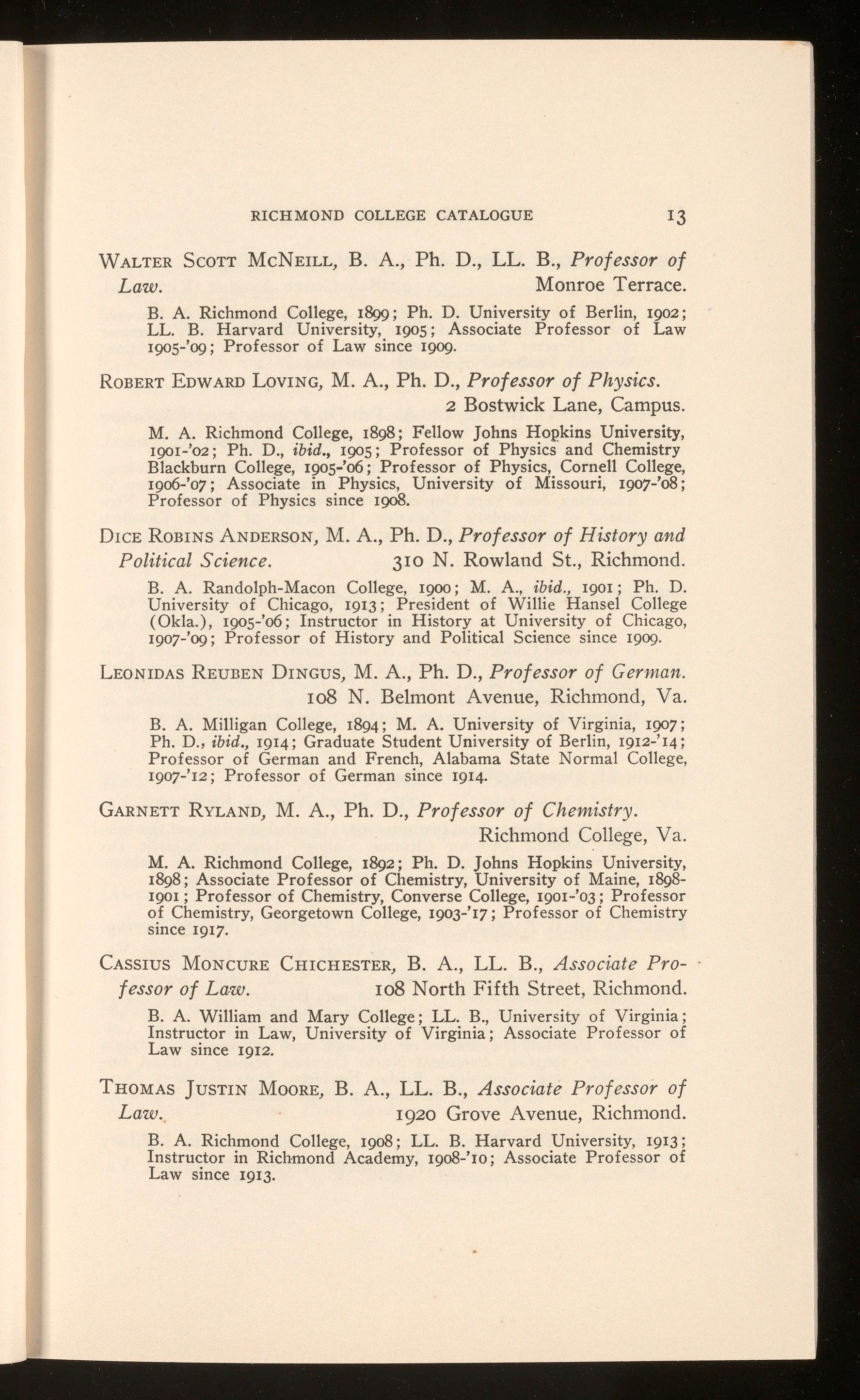
WALTER ScoTT McNEILL, B. A., Ph. D., LL. B., Professor of Law. Monroe Terrace.
B. A. Richmond College, 1899; Ph. D. University of Berlin, 1902; LL. B. Harvard University, 1905; Associate Professor of Law 1905-'09; Professor of Law since 1909.
ROBERTEDWARDLovING, M.A., Ph.D., Professor of Physics. 2 Bostwick Lane, Campus.
M. A. Richmond College, 1898; Fellow Johns HoP.kins University, 1901-'02; Ph. D., ibid., 1905; Professor of Physics and Chemistry Blackburn College, 1905-'o6; Professor of Physics, Cornell College, 19o6-'07; Associate in Physics, University of Missouri, 1907-'oS; Professor of Physics since 1908.
DrCE RoBINS ANDERSON,M. A., Ph. D., Professor of History and Political Science.
310 N. Rowland St., Richmond.
B. A. Randolph-Macon College, 1900; M. A., ibid., 1901 ; Ph. D. University of Chicago, 1913; President of Willie Hansel College (Okla.), 1905-'o6; Instructor in History at University of Chicago, 1907-'09; Professor of History and Political Science since 1909.
LEONIDASREUBEN DINGUS, M. A , Ph. D., Professor of German. 108 N. Belmont Avenue, Richmond, Va.
B . A. Milligan College, 1894; M. A. University of Virginia, 1907; Ph. D., ibid., 1914; Graduate Student University of Berlin, 1912-'14; Professor of German and French, Alabama State Normal College, 1907-'12; Professor of German since 1914.
GARNETT RYLAND, M. A., Ph. D., Professor of Chemistry. Richmond College, Va.
M. A. Richmond College, 1892; Ph. D. Johns Hopkins University, 1898; Associate Professor of Chemistry, University of Maine, 18981901 ; Professor of Chemistry, Converse College, 1901-'03; Professor of Chemistry, Georgetown College, 1903-'17; Professor of Chemistry since 1917.
CASSIUS MONCURE CHICHESTER, B. A., LL. B., Associate Professor of Law. 108 North Fifth Street, Richmond.
B. A. William and Mary College; LL. B., University of Virginia; Instructor in Law, University of Virginia; Associate Professor of Law since 1912.
THOMAS JusTIN MooRE, B. A., LL. B., Associate Professor of Law. 1920 Grove Avenue, Richmond.
B. A. Richmond College, 19o8; LL. B. Harvard University, 1913; Instructor in Richmond Academy, 19o8-'ro; Associate Professor of Law since 1913.
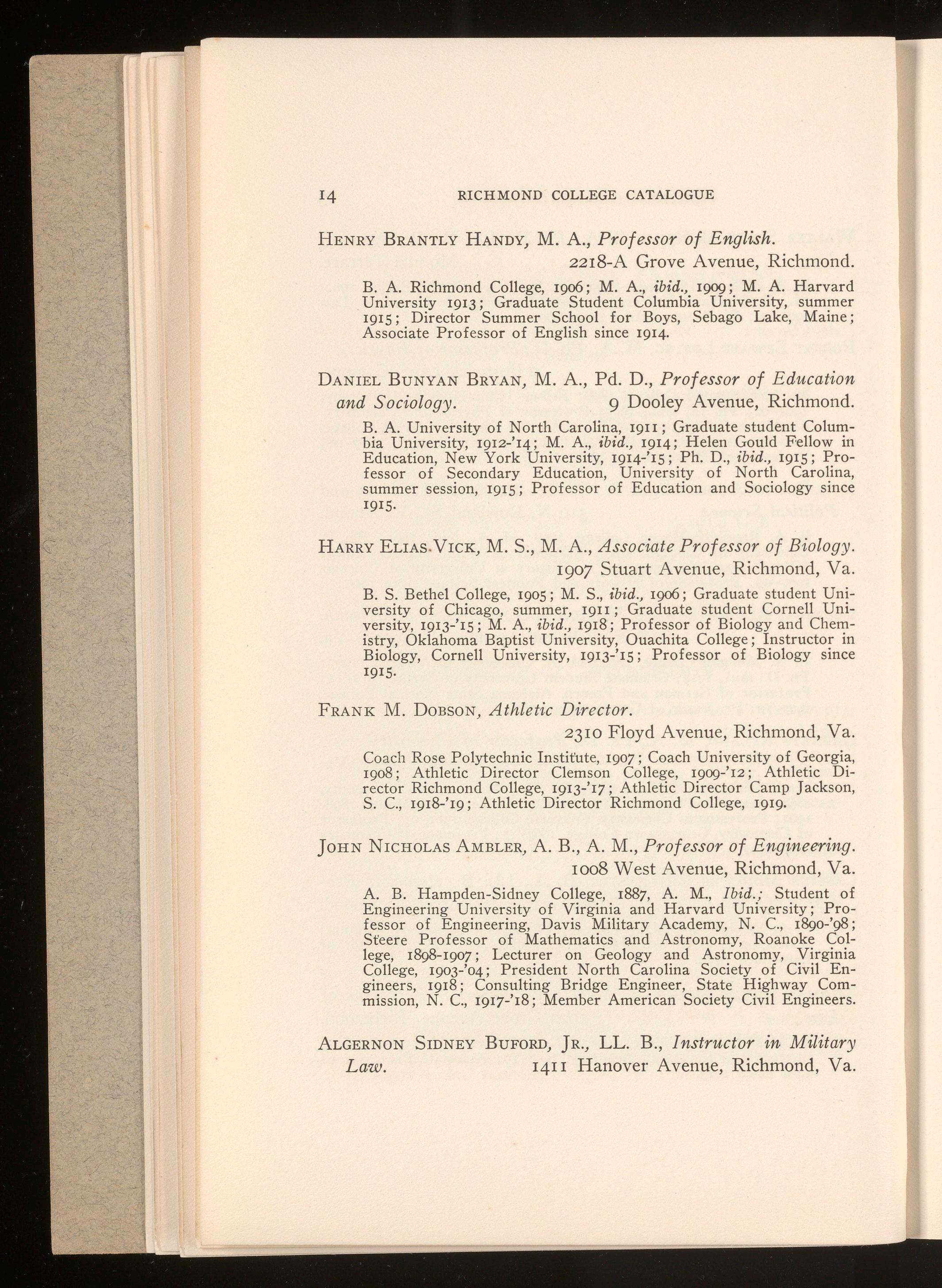
RICHMOND COLLEGE CATALOGUE
HENRY BRANTLY HANDY, M.A., Professor of English. 2218-A Grove Avenue, Richmond.
B. A. Richmond College, 1900; M. A., ibid., 1909; M. A. Harvard University 1913; Graduate Student Columbia University, summer 1915; Director Summer School for Boys, Sebago Lake, Maine; Associate Professor of English since 1914.
DANIEL BuNYAN BRYAN, M. A., Pd. D., Professor of Education and Sociology. 9 Dooley Avenue, Richmond.
B. A. University of North Carolina, 1911; Graduate student Columbia University, 1912-'14; M. A., ibid , 1914; Helen Gould Fellow in Education, New York University, 1914-'15; Ph. D., ibid., 1915; Professor of Secondary Education, University of North Carolina, summer session, 1915; Professor of Education and Sociology since 1915.
HARRY ELIAS VICK, M. S., M. A., Associate Professor of Biology. 1907 Stuart Avenue, Richmond, Va.
B. S. Bethel College, 1905; M. S., ibid., 1900; Graduate student University of Chicago, summer, 1911; Graduate student Cornell University, 1913-'15; M. A., ibid., 1918; Professor of Biology and Chemistry, Oklahoma Baptist University, Ouachita College; Instructor in Biology, Cornell University, 1913-'15; Professor of Biology since 1915.
FRANK M. DOBSON, Athletic Director.
2310 Floyd Avenue, Richmond, Va.
Coach Rose Polytechnic Instifute, 1907; Coach University of Georgia , 19o8; Athletic Director Clemson College, 1909-'12; Athletic Director Richmond College, 1913-'17; Athletic Director Camp Jackson, S. C., 1918-'19; Athletic Director Richmond College, 1919.
JOHN NICHOLAS AMBLER, A. B., A. M., Professor of Engineering. 1008 West A venue, Richmond, Va.
A. B. Hampden-Sidney College, 1887, A. M., Ibid.; Student of Engineering University of Virginia and Harvard University; Professor of Engineering, Davis Military Academy, N. C., 18go-'g8; Sfeere Professor of Mathematics and Astronomy, Roanoke College, 18g8-1907; Lecturer on Geology and Astronomy, Virginia College, 1903-'04; President North Carolina Society of Civil Engineers, 1918; Consulting Bridge Engineer, State Highway Commission, N. C., 1917-'18; Member American Society Civil Engineers.
ALGERNON SIDNEY BUFORD, JR., LL. B., Instructor in Military Law. 14n Hanover Avenue, Richmond, Va.

LAWRENCE TAYLOR PRICE, M. D., Instructor in Military Sanitation and Hygiene. 1823 West Grace Street, Richmond, Va.
Associate Instructor Medical College of Virginia since 1903.
E. BELFORT S. DE MAGALHAES, Ph. B., Associate Professor of Ronw,nce Languages. University Club, Richmond, Va.
Richmond College, 19o6-'10; Colgate University, 1910-'12; Graduate student and instructor in Spanish and Portugese, University of Virginia Summer Session, 1912; Graduate student Harvard University, Summer Session, 1916; George Washington University, 1916-'18; Columbia University, Summer Session, 1918; Professor of Romance Languages since 1918.
WoRTLEY F. RuDD, Ph. B., M . A., Associate Professor of Chemistry. 1716 Grove Avenue, Richmond, Va .
B. A. Richmond College, 1898; Ph. B. University College of Medicine, 1902; M. A. Columbia University, 19u; Professor of Chemistry, Medical College of Virginia.
R. INMAN JOHNSON, Associate Professor of Bible and Y. M. C. A Secretary. uo6 North Twentieth Street, Richmond, Va.
B A. Richmond, 1915; Student in Southern Baptist Theological Seminary, 1916-'17.
WILLIAM PORTER STONE, Professor of Military Science and Tactics . Richmond College, Va.
Graduate United Sfates Military Academy; Colonel United States Army. Retired
JAMES B. SOJOURNER,Personnel Officer. Richmond College, Va .
Student at University of South Carolina, 1915-'18 .; Plattsburg Training Camp, July to September, 1918; Second Lieufenant United States Army.
GLEN N V. GLA"'E, Adjutant. Richmond College, Va.
Student at Hampden-Sidney College, 1916-'18; Plattsburg Training Camp , July to September, 1918; Second Lieutenant United States Army.
WILLIAM B. ROGERS, Post Exchange Officer Richmond College, Va.
Student at Clemson College, 1916-'18; Plattsburg Training Camp, July fo September, 1918; Second Lieutenant United States Army.

RlCHMOND COLLEGE CATALOGUE
ALBERT P. PowELL, Quartermaster. Richmond College, Va. Student at Worcester Polytechnic Institute, 1916-'18; Plattsburg Training Camp, July to September, 1918; Second Lieutenant United States Army.
EUGENE CARL HooVER, Chemistry.
RALPH RAYMOND CHAPPELL, Physics.
COTHRAN GoDDEN SMITH, Physics.
GEORGE BERNHART BRIEL, Biology. R. ALFRED O'BRIEN, Library.
ELIZABETH L. THOMASSON, M. A., Secretary to the President.
EFFIE E. CARNEY, Assistant Registrar and Secretary to the Dean.
NORMA OVERTON WooDWARD, B. A., Assistant to the Treasurer. Lucy T. THROCKMORTON, Assistant to the Librarian.
COMMITTEES FOR 1919-'20
CouRSES AND DEGREES.-Professors Gaines, Harris, Handy, Bryan.
ATHLET1cs.-Profess9rs Dobson, Harris, W. S. McNeill.
FRATERNlTIES.-Professors Ryland, ----, Dingus.
PUBLICITYANDLECTUREs.-Professors Anderson, Ryland, Vick.
STUDENTAFFAIRs.-Professors Handy, Dobson, T. J. Moore.
ALUMNI.-Professors Ryland, Harris, The President and Dean are ex-officio members of all Committees.
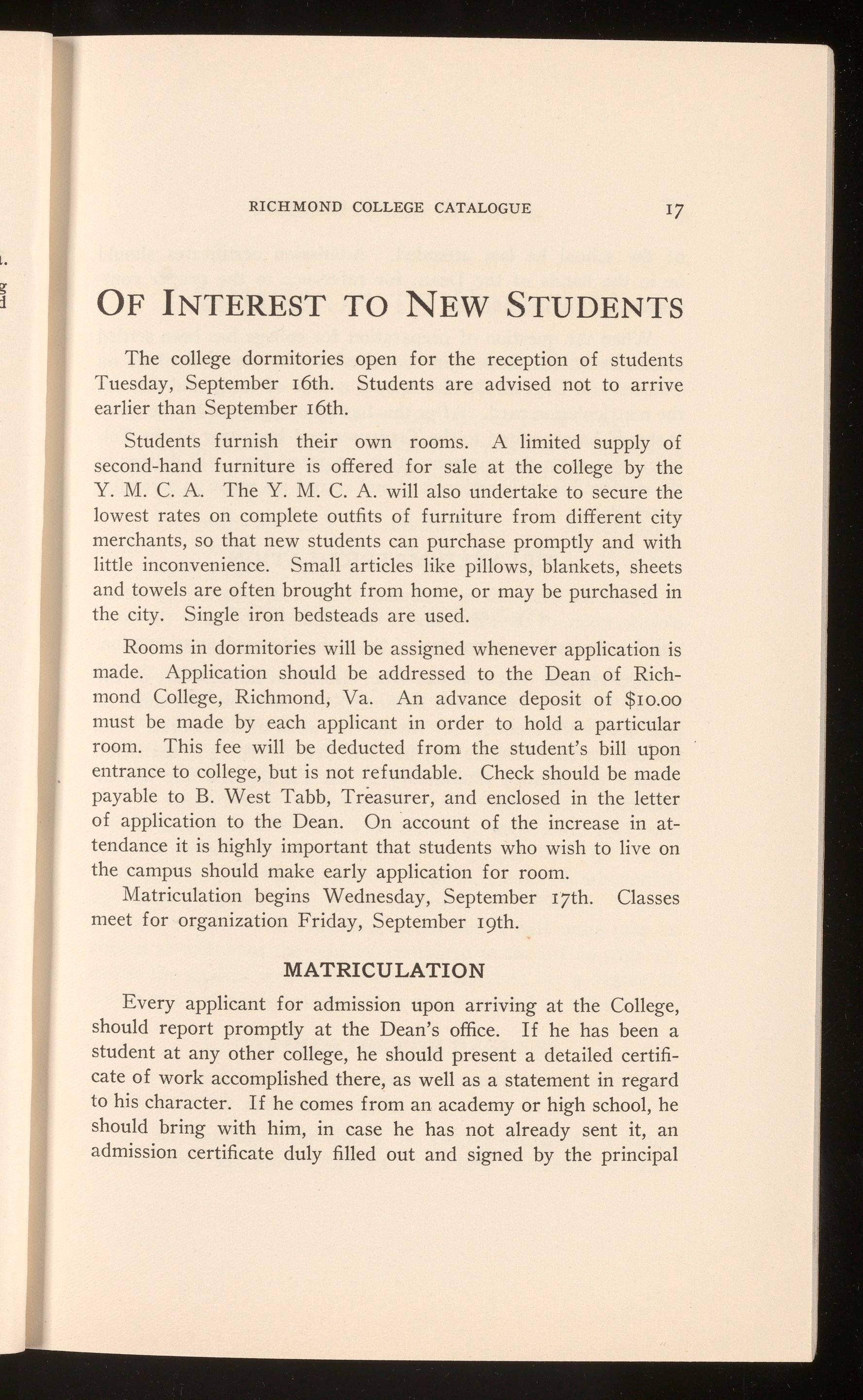
The college dormitories open for the reception of students Tuesday, September 16th. Students are advised not to arrive earlier than September 16th
Students furnish their own rooms. A limited supply of second-hand furniture is offered for sale at the college by the Y. M. C. A. The Y. M. C. A. will also undertake to secure the lowest rates on complete outfits of furniture from different city merchants, so that new students can purchase promptly and with little inconvenience. Small articles like pillows, blankets, sheets and towels are often brought from home, or may be purchased in the city. Single iron bedsteads are used.
Rooms in dormitories will be assigned whenever application is made. Application should be addressed to the Dean of Richmond College, Richmond, Va. An advance deposit of $10.00 mu st be made by each applicant in order to hold a particular room. This fee will be deducted from the student's bill upon entrance to college, but is not refundable. Check should be made payable to B. West Tabb, Treasurer, and enclosed in the letter of application to the Dean. On account of the increase in attendance it is highly important that students who wish to live on the campus should make early application for room.
Matriculation begins Wednesday, September 17th. Classes meet for organization Friday, September 19th.
Every applicant for admission upon arriving at the College, should report promptly at the Dean's office. If he has been a student at any other college, he should present a detailed certificate of work accomplished there, as well as a statement in regard to his character. If he comes from an academy or high school, he should bring with him, in case he has not already sent it, an admission certificate duly filled out and signed by the principal

RICHMOND COLLEGE CATALOGUE
of the school he last attended. Admission certificates should be in the hands of the Dean, for reference to the proper com- mittee, during the summer.
When the question of preparation for college has been settled affirmatively, the student in consultation with the Committee on Courses and Degrees decides upon a course of study and fills out the matriculation card. After this has been approved by the Dean it should be presented to the Treasurer and Registrar of the Col- lege, who, upon the payment of the required fees, will deliver to the student his registration card and record his name as a regular matriculate.
Students who fail to complete their matriculation by 12 :oo o'clock, noon, of the third day of the session, September the 20th, will be charged an extra fee of $2.00 for delayed matriculation.
Any student who is absent from classes on the first day of the second or third terms shall be fined $2.00 and this fine must be paid before the student may resume the work of the course. The reasons for such absence may be submitted in writing to the Dean. If they are deemed satisfactory by the Faculty the fine will be returned.
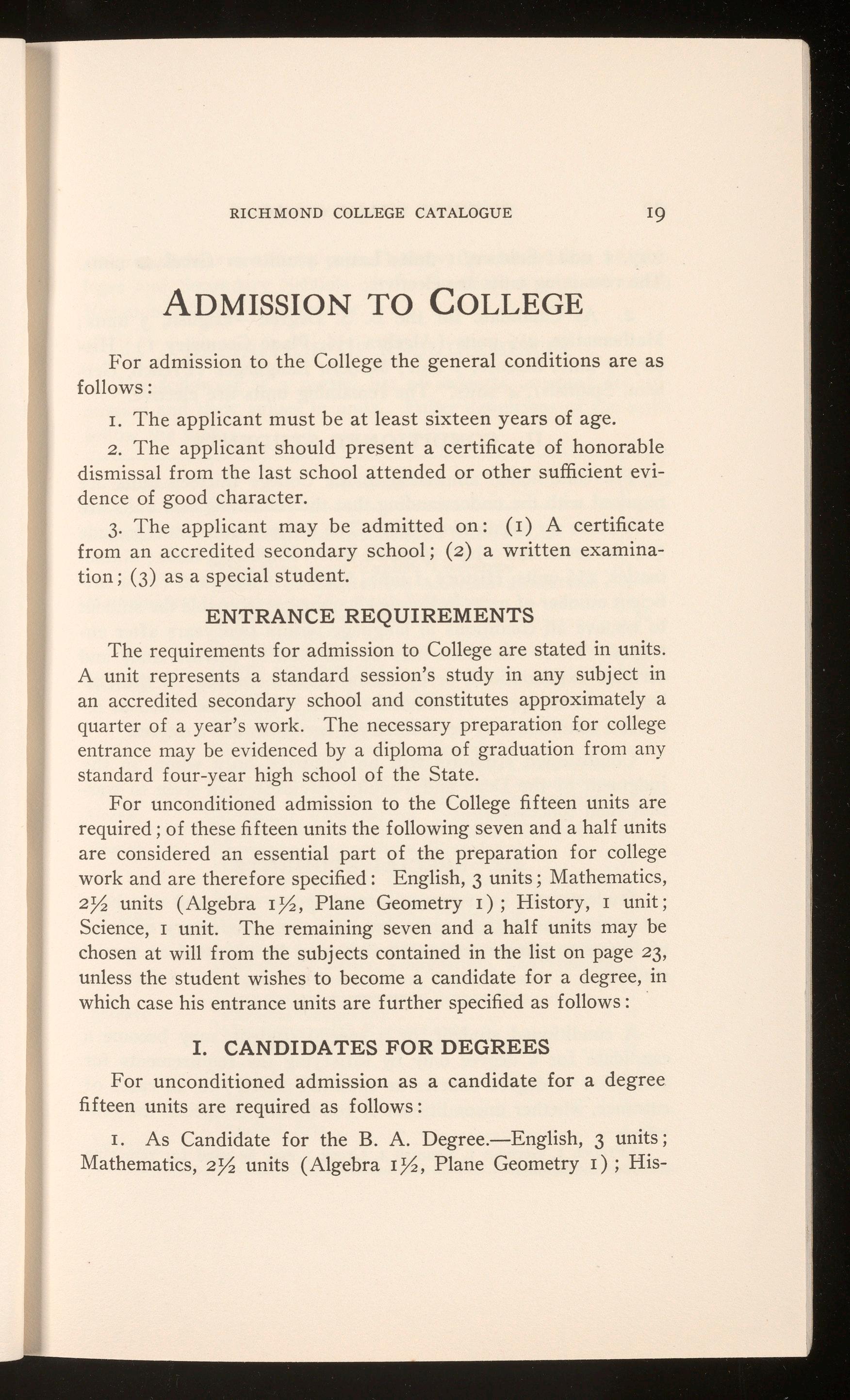
For admission to the College the general conditions are as follows:
I. The applicant must be at least sixteen years of age.
2. The applicant should present a certificate of honorable dismissal from the last school attended or other sufficient evidence of good character.
3. The applicant may be admitted on: (I) A certificate from an accredited secondary school; (2) a written examination; (3) as a special student.
The requirements for admission to College are stated in units. A unit represents a standard session's study in any subject in an accredited secondary school and constitutes approximately a quarter of a year's work. The necessary preparation for college entrance may be evidenced by a diploma of graduation from any standard four-year high school of the State.
For unconditioned admission to the College fifteen units are required; of these fifteen units the following seven and a half units are considered an essential part of the preparation for college work and are therefore specified : English, 3 units; Mathematics, 2,½ units (Algebra 1,½, Plane Geometry 1); History, I unit; Science, I unit. The remaining seven and a half units may be chosen at will from the subjects contained in the list on page 23, unless the student wishes to become a candidate for a degree, in which case his entrance units are further specified as follows :
For unconditioned admission as a candidate for a degree fifteen units are required as follows:
I. As Candidate for the B. A. Degree.-English, 3 units; Mathematics, 2,½ units (Algebra 1,½, Plane Geometry 1); His-
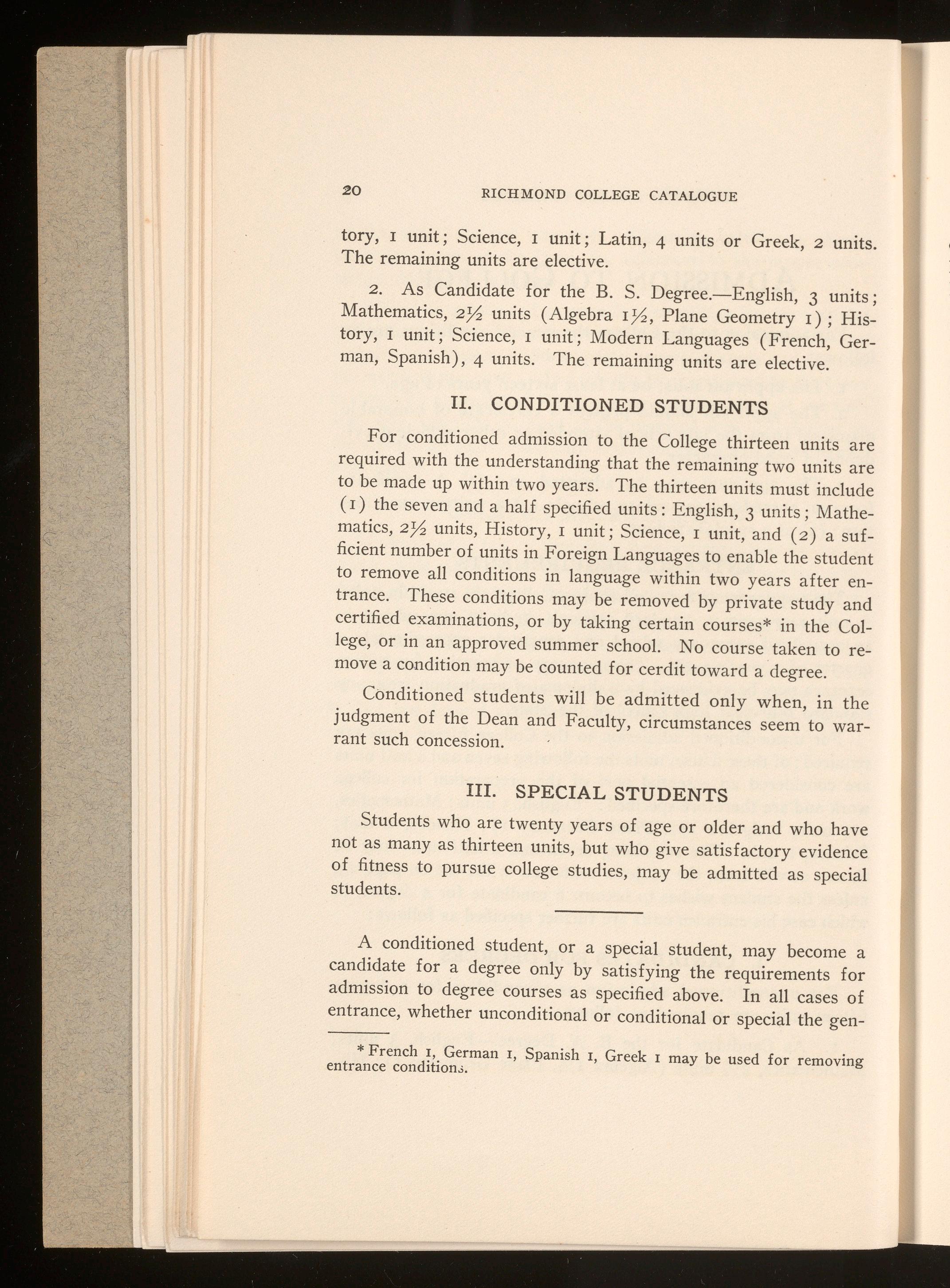
COLLEGE CATALOGUE
tory, I unit; Science, I unit; Latin, 4 units or Greek, 2 units. The remaining units are elective.
2. As Candidate for the B. S. Degree.-English, 3 units; Mathematics, 2 ¼ units ( Algebra I¼, Plane Geometry 1) ; His- tory, I unit; Science, I unit; Modern Languages (French, Ger- man, Spanish), 4 units. The remaining units are elective.
For conditioned admission to the College thirteen units are required with the understanding that the remaining two units are to be made up within two years. The thirteen units must include (I) the seven and a half specified units : English, 3 units ; Mathe- matics, 2¼ units, History, I unit; Science, I unit, and (2) a suf- ficient number of units in Foreign Languages to enable the student to remove all conditions in language within two years after en- trance. These conditions may be removed by private study and certified examinations, or by taking certain courses* in the Col- lege, or in an approved summer school. No course taken to re- move a condition may be counted for cerdit toward a degree.
Conditioned students will be admitted only when, in the judgment of the Dean and Faculty, circumstances seem to war- rant such concession.
Students who are twenty years of age or older and who have not as many as thirteen units, but who give satisfactory evidence of fitness to pursue college studies, may be admitted as special students.
A conditioned student, or a special student, may become a candidate for a degree only by satisfying the requirements for admission to degree courses as specified above. In all cases of entrance, whether unconditional or conditional or special the gen-
* French 1, German 1, Spanish 1, Greek I may be used for removing entrance conditionJ.
er a l regulations are those prescribed by the Association of Colleges and Secondary Schools of the Southern States, of which Richmond College is a member.
The following is a partial list of subjects accepted for admi ssion and their values in units. Fuller definitions of the units follow the table :
Subjects
English
M a thematics

History
Latin
Greek French
German
Spanish Science
Drawing
Divisions Units
Grammar and Grammatical Analysis. . . 1 Composition and Rhetoric 1 Selections from English Literature. . . . . . . . . . . . 1
History of English and American Literature . 1
Algebra to Quadratic Equations I Quadratics, Progressions, etc ½
Plane Geometry
I ISolid Geometry
½
Plane Trigonometry . . ½
Ancient History . I
Mediaeval and Modern History
English History . . . I
1
American History . I Grammar, Composition, Translation .. I Caesar's Gallic War, I-IV; Gram., Composition. 1 Cicero's Orations (6); Grammar, Composition .. 1 Virgil's Aeneid, I-VI; Grammar, Composition . . I IGrammar , Composition, Translation 1 Xenophon's Anabasis, I-IV; Gram , Composition I Grammar, Composition, Translation .... 1 Translation, Grammar, Composition . . .. .. ..... I
Advanced Classics, Composition, Conversation. 1 Advanced Classics, Composition, Conversation 1 Grammar, Composition, Translation. . . . . . . . . . I
Translation, Grammar, Composition .. . .. . .. .. . I Advanced Classics, Composition, Conversation. 1 Advanced Classics, Composition, Conversation. I Grammar, Composition, Translation ... r Translation, Grammar, Composition .. 1
Physical Geography ...
Chemistry, with Experiments
1
1
Physics, with Experiments . r Botany . ½ Zoology ..... ...... . ............ .
Agriculture
. ..... .. . . .. ½
1
Physiology . ½ Applied Arts . . . . . . . ½ I

RICHMOND COLLEGE CATALOGUE
The following statement indicates the amount of prepara- tion expected in each subject:
1. English - Four units; 3 required:
The English requirements may be divided as follows:
(a) English Grammar and Grammatical Analysis. One unit.
(b) Composition and Rhetoric, with special emphasis upon punctuation, sentence structure, and para- graphing. One unit.
(c) Careful reading and study of selections from Eng- lish Literature. One unit.
(d) The History of English and American Literature_ One unit.
A. READING.
The aim of this course is to foster in the student the habit of intelli- gent reading and to develop a taste for good literature, by giving him a first hand knowledge of some of the best specimens. He should read the- books carefully, but his attention should not be so fixed upon details as to cause his missing the main purpose and charm of what he reads.
With a view to a great freedom of choice, the books provided for · reading are arranged in the . following groups, from which at least ten selections are to be made -two from each group :
Group I: CLASSICSIN TRANSLATION.The Old Testament, comprising at least the chief narrative episodes in Genesis, Exodus, Joshua, Judges, Samuel, Kings, and Daniel, together with the books of Ruth and Esther; The Odyssey, with the omission, if desired, of Books I, II, III, IV, V, XV, XVI, XVII; The Iliad, with the omission, if desired, of Books XI, XIII, XIV, XV, XVII, XXI; The .lEneid. The Odyssey, Iliad and .lEneid should be read in English translations of recognized literary excellence.
(For any selections from this group a selection from any other group , may be substituted.)
Group 2: SHAKESPEARE.Shakespeare's A Midsummer Night's Dream, The Merchant of Venice, As You Like It, Twelfth Night, The Tempest, Romeo and Juliet, King John, Richard II, Richard III, Henry V, Corio- lanus, Julius Caesar, Macbet. · , Hamlet (if not chosen for study under B).
Group 3: PROSE FICTION. Malory's Morte d'Arthur (about 100, pages); Bunyan's Pilgrim's Progress, Part I; Swift's Gulliver's Travels (voyages to Li)li{!ut ~nd to Brobdingnag); Defoe's Robinson Crusoe, Part I; Gold,sm1ths Vicar of Wakefield; Frances Burney's Evelina; any one of Scotts Novels; any one of Jane Austen's Novels; Maria Edge- - worths Castle Rackrent, or The Absentee; any one of Dickens' Novels; any one of Thackeray's Novels; any one of George Eliot's Novels; Mrs .. Gaskell's Cranford; Kingsley's Westward Ho! or Hereward, the Wake;
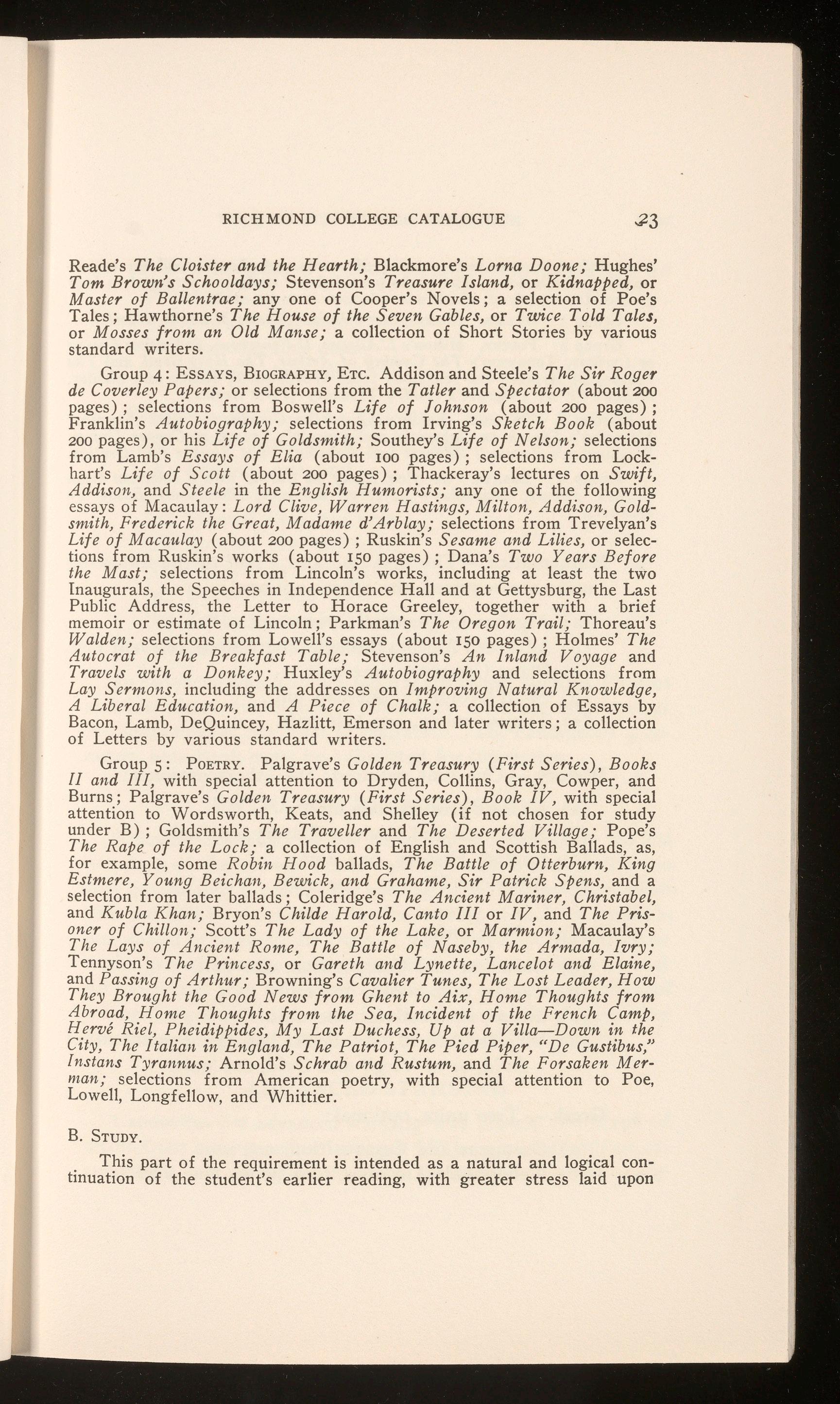
Reade's The Cloister and the Hearth; Blackmore's Lorna Doone; Hughes' Tom Brown's Schooldays; Stevenson's Treasure Island, or Kidnapped, or Master of Ballentrae; any one of Cooper's Novels; a selection of Poe's Tales; Hawthorne's The House of the Seven Gables, or Twice Told Tales, or Mosses from an Old Manse; a collection of Short Stories by various standard writers.
Group 4: EssAYS, BIOGRAPHY,ETC. Addison and Steele's The Sir Roger de Coverley Papers; or selections from the Tat/er and Spectator (about 200 pages); selections from Boswell's Life of Johnson (about 200 pages); Franklin's Autobiography; selections from Irving's Sketch Book (about 200 pages), or his Life of Goldsmith; Southey's Life of Nels on; selections from Lamb's Essays of Elia (about 100 pages); selections from Lockhart's Life of Scott (about 200 pages); Thackeray's lectures on Swift, Addison, and Steele in the English Humorists; any one of the following essays of Macaulay: Lord Clive, Warren Hastings, Milton, Addison, Goldsmith, Frederick the Great, Madame d' Arb lay; selections from Trevelyan's Life of Macaulay (about 200 pages); Ruskin's Sesame and Lilies, or selections from Ruskin's works (about 150 pages); Dana's Two Years Before the Mast; selections from Lincoln's works, including at least the two Inaugurals, the Speeches in Independence Hall and at Gettysburg, the Last Public Address, the Letter to Horace Greeley, together with a brief memoir or estimate of Lincoln; Parkman's The Oregon Trail; Thoreau's Walden; selections from Lowell's essays (about 150 pages); Holmes' The Autocrat of the Breakfast Table; Stevenson's An Inland Voyage and Travels with a Donkey; Huxley's Autobiography and selections from Lay Sermons, including the addresses on Improving Natural Knowledge, A Liberal Education, and A Piece of Chalk; a collection of Essays by Bacon, Lamb, DeQuincey, Hazlitt, Emerson and later writers; a collection of Letters by various standard writers.
Group 5: POETRY. Palgrave's Golden Treasury (First Series), Books II and III, with special attention to Dryden, Collins, Gray, Cowper, and Burns; Palgrave's Golden Treasury (First Series), Book IV, with special attention to Wordsworth, Keats, and Shelley (if not chosen for study under B) ; Goldsmith's The Traveller and The Deserted Village; Pope's The Rape of the Lock; a collection of English and Scottish Ballads, as, for example, some Robin Hood ballads, The Battle of Otterburn, King Estmere, Young Beichan, Bewick, and Grahame, Sir Patrick Spens, and a selection from later ballads; Coleridge's The Ancient Mariner, Christabel, and Kubla Khan; Bryon's Chi/de Harold, Canto III or IV, and The Prisoner of Chillon; Scott's The Lady of the Lake, or Marmion; Macaulay's The Lays of Ancient Rome, The Battle of Naseby, the Armada, Ivry; Tennyson's The Princess, or Gareth and Lynette, Lancelot and Elaine, and Passing of Arthur; Browning's Cavalier Tunes, The Lost Leader, How They Brought the Good News from Ghent to Aix, Home Thoughts from Abroad, Home Thoughts from the Sea, Incident of the French Camp, Herve Riel, Pheidippides, My Last Duchess, Up at a Villa-Down in the City, The Italian in England, The Patriot, The Pied Piper, "De Gustibus," lnstans Tyrannus; Arnold's Schrab and Rustum, and The Forsaken Merman; selections from American poetry, with special attention to Poe, Lowell, Longfellow, and Whittier.
B. STUDY.
This part of the requirement is intended as a natural and logical continuation of the student's earlier reading, with greater stress laid upon

form and style, the exact meaning of words and phrases, and the under- standing of allusions. The books provided for study are arranged in four groups, from each of which one selection is to be made.
Group I: DRAMA. Shakespeare's Julius Caesar, Macbeth, Hamlet.
Group 2: POETRY. Milton's L'Allegro, Il Penseroso, and either Comus or Lycidas; Tennyson's The Coming of Arthur, The Holy Grail, and The Passing of Arthur; the selections from Wordsworth, Keats, and Shelley, in Book IV of Palgrave's Golden Treasury (First Series).
Group 3. ORATORY.Burke's Speech on Conciliation with America; Macaulay's Speech on Copyright and Lincoln's Speech at Cooper Union; Washington's Farewell Address and Webster's First Bunker Hill Oration.
Group 4: EssAYS. Carlyle's Essay on Burns, with a selection from Burns's Poems; Macaulay's Life of Johnson; Emerson's Essay on l\1anners.
2. Mathematics - The first two and a half of the following units are required, the others optional:
(a) Algebra to Quadratics, one unit.
(b) Advanced Algebra through progressions, one-half unit
( c) Plane Geometry, one unit.
( d) Solid Geometry, one-half unit.
( e) Trigonometry, one-half unit.
3. History- One un-it required; the others optional:
(a) Ancient History, one unit.
(b) Mediaeval and Modern History, one unit.
( c) English History, one unit.
( d) American History, one unit.
4. Latin - Four units:
(a) Grammar and Composition, one unit.
(b) Caesar, four books, one unit.
( c) Cicero, six orations, one unit.
( d) Virgil's Aeneid, six books, or the equivalent of Ovid, or of Virgil and Ovid, one unit.
5. Greek - Two units, optional :
(a) Grammar and Composition, one unit.
(b) Xenophon's Anabasis, four books, one unit.
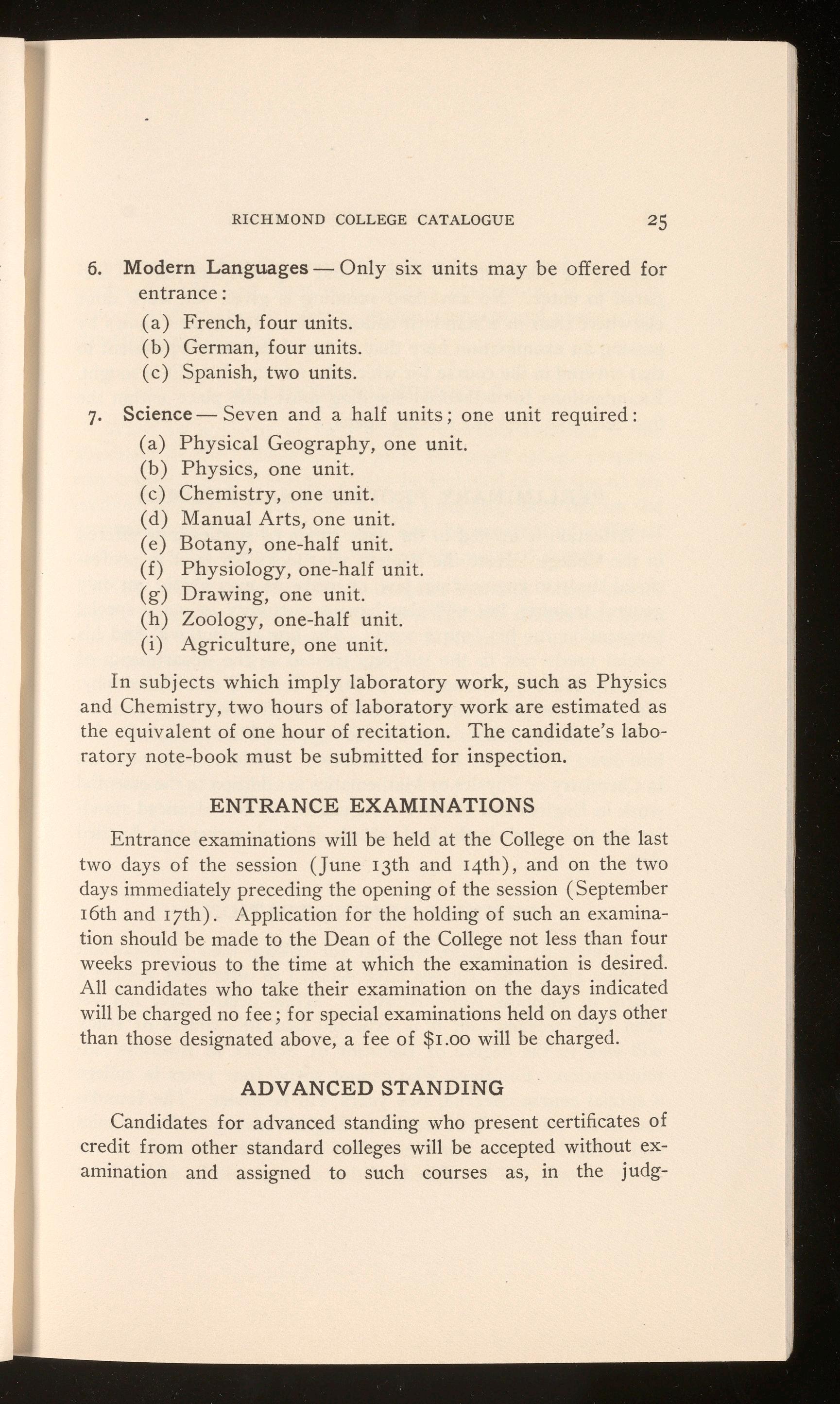
6. Modern Languages -Only six units may be offered for entrance:
(a) French, four units.
(b) German, four units.
( c) Spanish, two units.
7. Science -Seven and a half units; one unit required :
(a) Physical Geography, one unit.
(b) Physics, one unit.
( c) Chemistry, one unit.
( d) Manual Arts, one unit.
( e) Botany, one-half unit.
(£) Physiology, one-half unit.
(g) Drawing, one unit.
(h) Zoology, one-half unit.
(i) Agriculture, one unit.
In subjects which imply laboratory work, such as Physics and Chemistry, two hours of laboratory work are estimated as the equivalent of one hour of recitation. The candidate's laboratory note-book must be submitted for inspection.
Entrance examinations will be held at the College on the last two days of the session (June 13th and 14th), and on the two days immediately preceding the opening of the session ( September 16th and 17th). Application for the holding of such an examination should be made to the Dean of the College not less than four weeks previous to the time at which the examination is desired. All candidates who take their examination on the days indicated will be charged no fee; for special examinations held on days other than those designated above, a fee of $1.00 will be charged .
Candidates for advanced standing who present certificates of credit from other standard colleges will be accepted without examination and assigned to such courses as, in the judg-

COLLEGE CATALOGUE
ment of the Committee on Courses and Degrees, they may be prepared to enter. No advanced standing is given for work done elsewhere than in a standard college unless the student shows by passing an examination here that he has done work equivalent to that covered in the course for which the advanced credit is sought. Examinations for advanced standing must take place within the first ten days after the session opens.
Attention is invited to the wide range of studies now offered in the College. Here the student who looks forward to professional study in engineering, law, or medicine may obtain not only general training, but will also have opportunity to make special preparation for his future work. The law student will find his special needs met in the subjects treated in the departments of English, History, Economics, Political Science, and Philosophy. Similarly, the prospective student of medicine will find that the work in Biology, Chemistry, Psychology, and Physics has afforded him direct preparation for his profession. Students who specialize in Chemistry or Physics or Mathematics in addition to the essential work in English and Modern Languages, receive advanced standing for their work in the best schools of Engineering and Applied Arts.
In view of the large demand for college men in important business affairs the trustees have decided to offer next session a course in Business Administration. While details have not yet been fully worked out, it is expected that this course of study will lead to the degree of Bachelor of Science in Business Administration. For those who cannot spend four years in college a special course covering two years will be given. The foundation of the course will be studies in English, history and economics and social sciences. For the session of 1919-20 the work of the first year only will be offered. Other courses will be added from

year to year to meet the demands of the advancing students. The course for the first year will embrace instruction in English, history, mathematics, a modern foreign language and introductory economics and finance.
When an academy or high school furnishes evidence to the President of the College that it gives thorough college preparatory training to its students, it may be included in the list of accredited schools. A certificate of the principal, filled out on the form provided by the College, will then be accepted as sufficient evidence of the completion of the courses reported therein.
High school students who contemplate entering college should obtain from the College a blank Certificate of Admission, have same filled out by their principal, and forward it to the Dean of Richmond College during vacation .
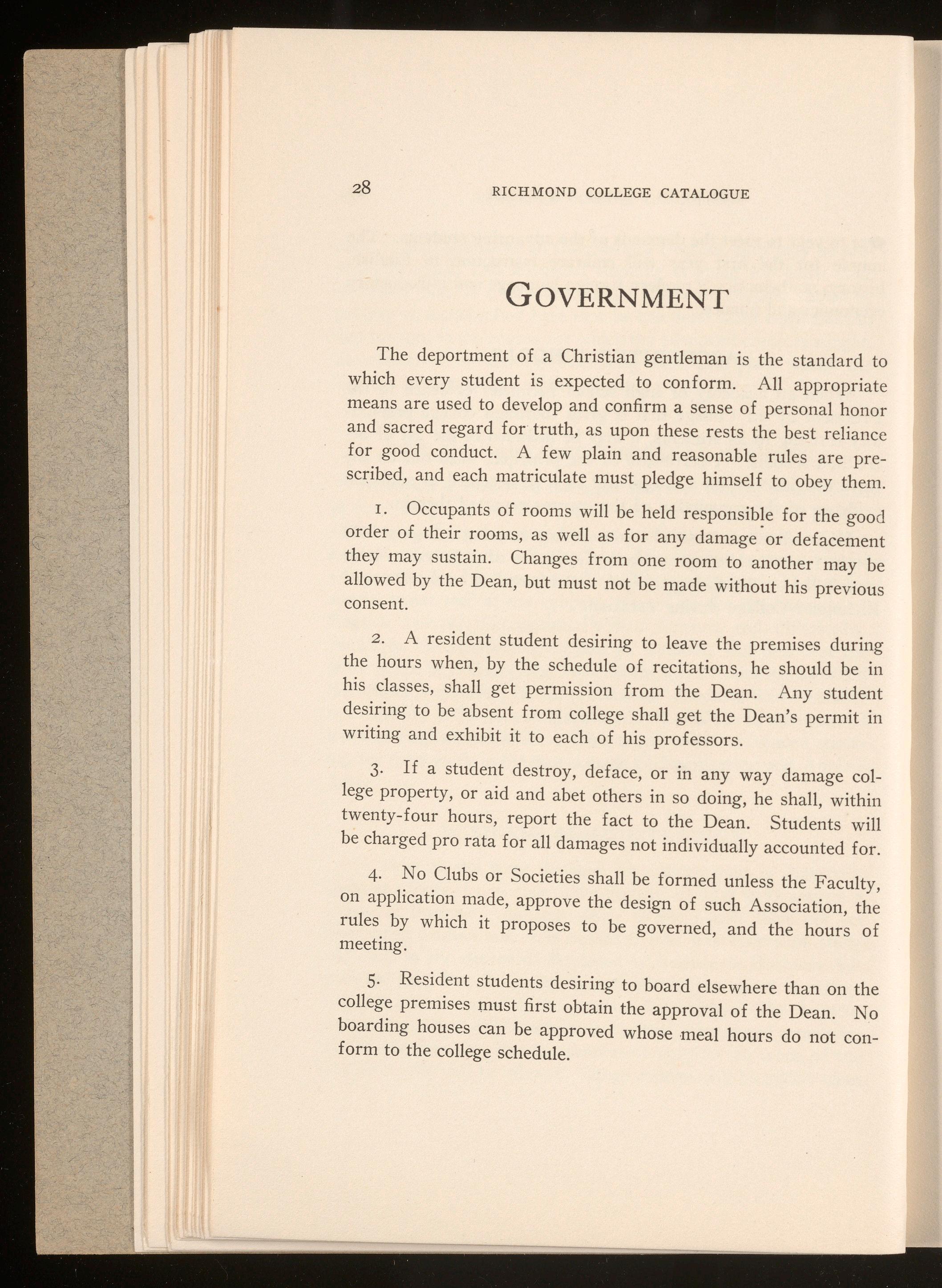
The deportment of a Christian gentleman is the standard to which every student is expected to conform. All appropriate means are used to develop and confirm a sense of personal honor and sacred regard for truth, as upon these rests the best reliance for good conduct. A few plain and reasonable rules are pre- scribed, and each matriculate must pledge himself to obey them.
r. Occupants of rooms will be held responsib)e for the goo d order of their rooms, as well as for any damage or defacement they may sustain. Changes from one room to another may be allowed by the Dean, but must not be made without his previous consent.
2. A resident student desiring to leave the premises during the hours when, by the schedule of recitations, he should be in his classes, shall get permission from the Dean. Any student desiring to be absent from college shall get the Dean's permit in writing and exhibit it to each of his professors.
3. If a student destroy, deface, or in any way damage col- lege property, or aid and abet others in so doing, he shall, within twenty-four hours, report the fact to the Dean. Students will be charged pro rata for all damages not individually accounted for.
4. No Clubs or Societies shall be formed unless the Faculty, on application made, approve the design of such Association, the rules by which it proposes to be governed, and the hours of meeting.
5. Resident students desiring to board elsewhere than on the college premises must first obtain the approval of the Dean. No boarding houses can be approved whose meal hours do not con- form to the college schedule.
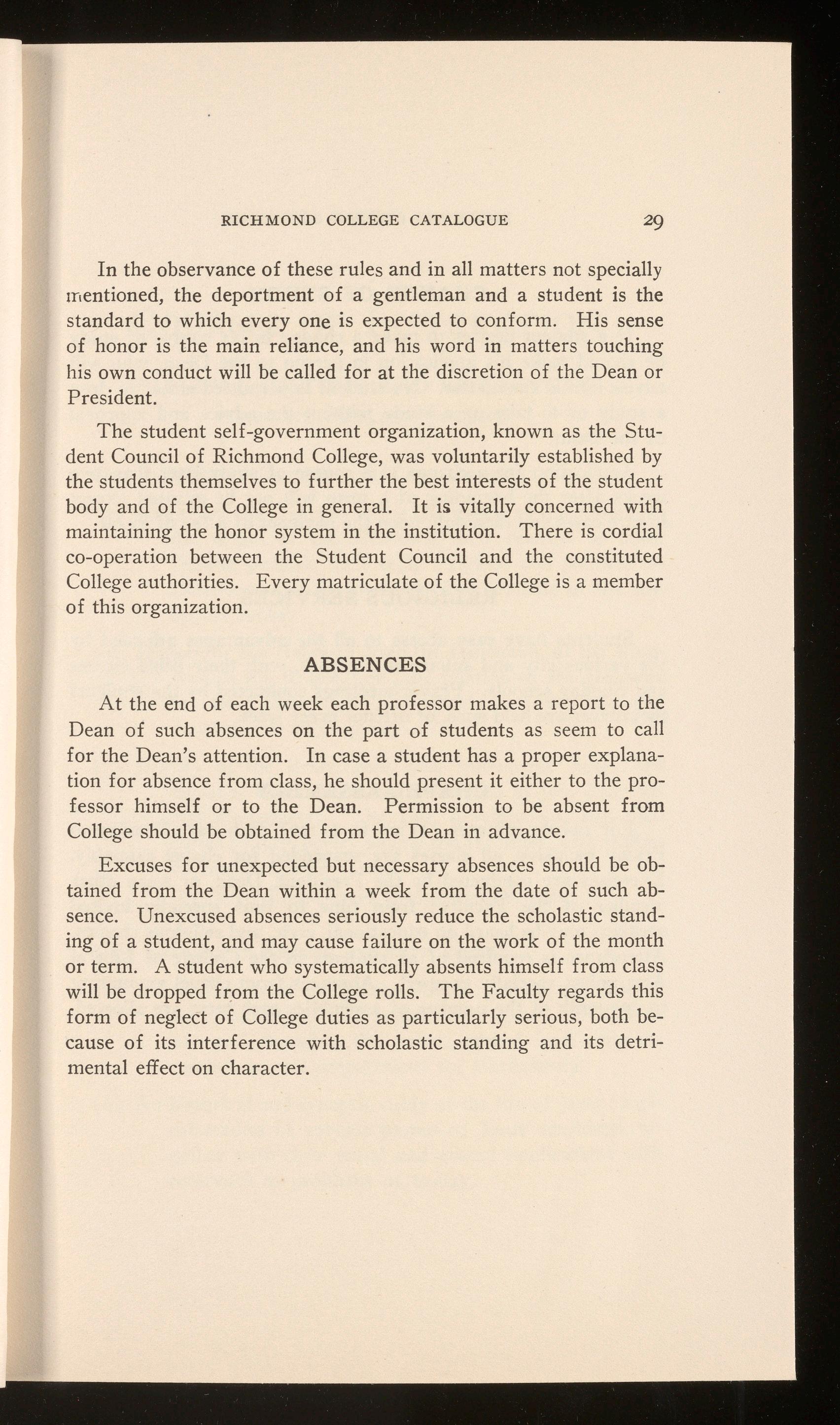
In the observance of these rules and in all matters not specially mentioned, the deportment of a gentleman and a student is the standard to which every one is expected to conform. His sense of honor is the main reliance, and his word in matters touching his own conduct will be called for at the discretion of the Dean or President.
The student self-government organization, known as the Student Council of Richmond College, was voluntarily established by the students themselves to further the best interests of the student body and of the College in general. It is vitally concerned with maintaining the honor system in the institution. There is cordial co-operation between the Student Council and the constituted College authorities. Every matriculate of the College is a member of this organization.
At the end of each week each professor makes a report to the Dean of such absences on the part of students as seem to call for the Dean's attention. In case a student has a proper explanation for absence from class, he should present it either to the professor himself or to the Dean. Permission to be absent from College should be obtained from the Dean in advance.
Excuses for unexpected but necessary absences should be obtained from the Dean within a week from the date of such absence. Unexcused absences seriously reduce the scholastic standing of a student, and may cause failure on the work of the month or term . A student who systematically absents himself from class will be dropped fr:om the College rolls. The Faculty regards this form of neglect of College duties as particularly serious, both because of its interference with scholastic standing and its detrimental effect on character.

If a student desires to make a change in his course of study he should make his application in person to the Dean, who will advise him in the matter. No student is permitted either to drop a study or to take up a study without the advice and approval of the Dean
Application for a change in a course of study later than two weeks after the beginning of a term will not be gr anted except in rare ca ses and then only upon the payment of a fee of $1.00.
Student s have easy access to all the advantages afforded by the vari ous city and suburban churches, with their Bible classe s and Sunda y schools Prayer meetings conducted by the students themselves are held once, or oftener every week.
For twenty minutes (II :oo to I I :20) each day, Monday to Friday inclusive, all classes are suspended for chapel assembly. Exercises are conducted by the President, Dean, or some other member of the Faculty; from time to time specially invited speakers may be heard on educational, civic, and religious themes Attendance is required of all students in the College of Liberal Arts unless specially excused. Absences from chapel amounting to one-tenth of the number of assemblies each term are allowed.
RICHMOND COLLEGE CATALOGUE
I. OLD TESTAMENT HISTORY AND LITERATURE: 31
BIBLICAL HISTORY AND LITERATURE
ASSOCIATE PROFESSOR JOHNSON

(a) History of the Hebrews to the Disruption of the Kingdom; the origin of the Hebrews, their relation to other Semitic peoples, their early religious and political institutions ; and the character and contents of the historical books.
( b) History of the Hebrews from the Disruption of the Kingdom to the Restoration; the relation of the Hebrews to other nations of the period; and the rise and development of prophecy.
( c) History of the Restoration and subsequent times ; the Hebrew Wisdom Literature as seen in Job, Proverbs and Ecclesiastes. The rise, development, and final forms of lyric poetry among the Hebrews, with studies of representative forms.
Three times a week throughout the year.
2. NEW TESTAMENT HISTORY AND LITERATURE:
(a) A brief survey of the Persian, Greek, Jewish, and Roman ages ; the world into which Jesus came; currents of life and thought; the social, ethical, and religious conditions, and preparations for Christianity.
( b) An historical and synoptic study of the life of Jesus; topical studies of various phases of Jesus' teachings, together with their social and ethical implications with reference to problems of to-day.
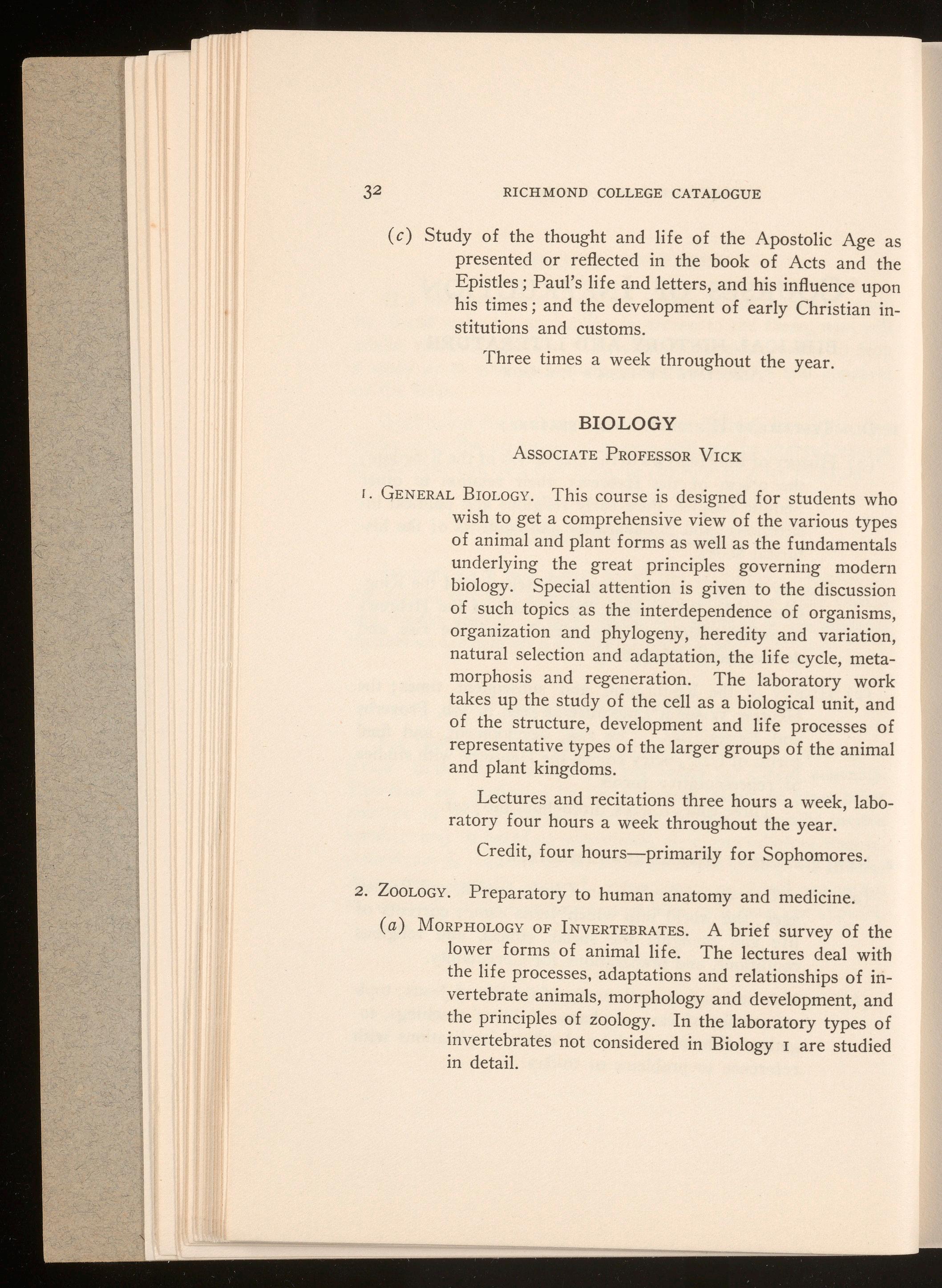
(
c) Study of the thought and life of the Apostolic Age as presented or reflected in the book of Acts and the Epistles; Paul's life and letters, and his influence upon his times; and the development of early Christian institutions and customs.
Three times a week throughout the year.
1. GENERALBIOLOGY.This course is designed for students who wish to get a comprehensive view of the various types of animal and plant forms as well as the fundamentals underlying the great principles governing modern biology. Special attention is given to the discussion of such topics as the interdependence of organisms, organization and phylogeny, heredity and variation, natural selection and adaptation, the life cycle, metamorphosis and regeneration. The laboratory work takes up the study of the cell as a biological unit, and of the structure, development and life processes of representative types of the larger groups of the animal and plant kingdoms.
Lectures and recitations three hours a week, laboratory four hours a week throughout the year.
Credit, four hours-primarily for Sophomores.
2. ZooLOGY. Preparatory to human anatomy and medicine.
(a) MORPHOLOGYOF INVERTEBRATES.A brief survey of the lower forms of animal life. The lectures deal with the life processes, adaptations and relationships of invertebrate animals, morphology and development, and the principles of zoology. In the laboratory types of invertebrates not considered in Biology I are studied in detail.
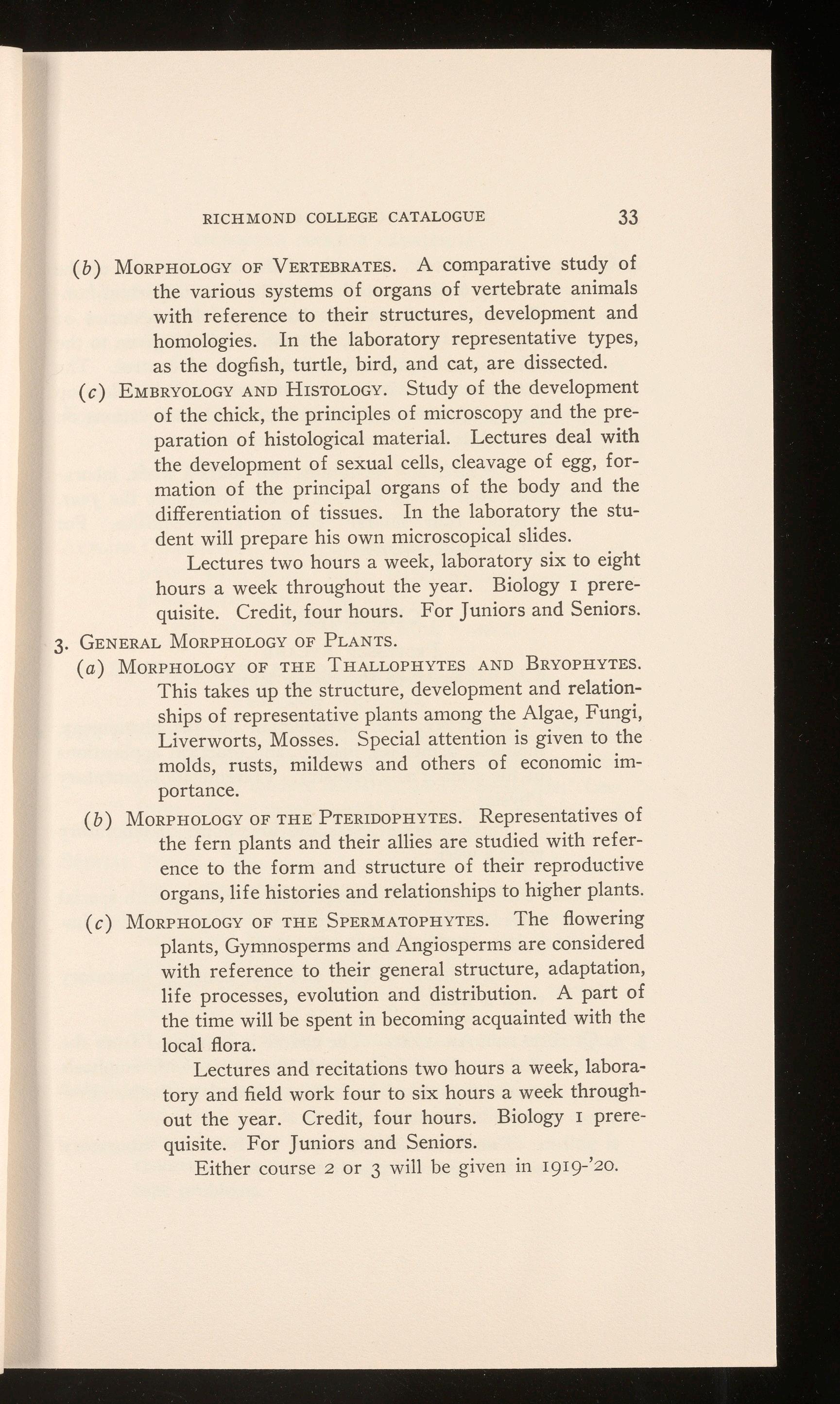
(b) MORPHOLOGYOF VERTEBRATES.A comparative study of the various systems of organs of vertebrate animals with reference to their structures, development and homologies. In the laboratory representative types, as the dogfish, turtle, bird, and cat, are dissected.
(c) EMBRYOLOGYANDHISTOLOGY. Study of the development of the chick, the principles of microscopy and the preparation of histological material. Lectures deal with the development of sexual cells, cleavage of egg, formation of the principal organs of the body and the differentiation of tissues. In the laboratory the student will prepare his own microscopical slides.
Lectures two hours a week, laboratory six to eight hours a week throughout the year. Biology I prerequisite. Credit, four hours. For Juniors and Seniors.
3. GENERALMORPHOLOGYOF PLANTS.
(a) MORPHOLOGYOF THE THALLOPHYTESAND BRYOPHYTES. This takes up the structure, development and relationships of representative plants among the Algae, Fungi, Liverworts, Mosses. Special attention is given to the molds, rusts, mildews and others of economic importance.
( b) MORPHOLOGYOF THE PTERIDOPHYTES.Representatives of the fern plants and their allies are studied with reference to the form and structure of their reproductive organs, life histories and relationships to higher plants.
(c) MORPHOLOGYOF THE SPERMATOPHYTES.The flowering plants, Gymnosperms and Angiosperms are considered with reference to their general structure, adaptation, life processes, evolution and distribution. A part of the time will be spent in becoming acquainted with the local flora.
Lectures and recitations two hours a week, laboratory and field work four to six hours a week throughout the year. Credit, four hours. Biology I prerequisite. For Juniors and Seniors. Either course 2 or 3 will be given in 1919-'20.
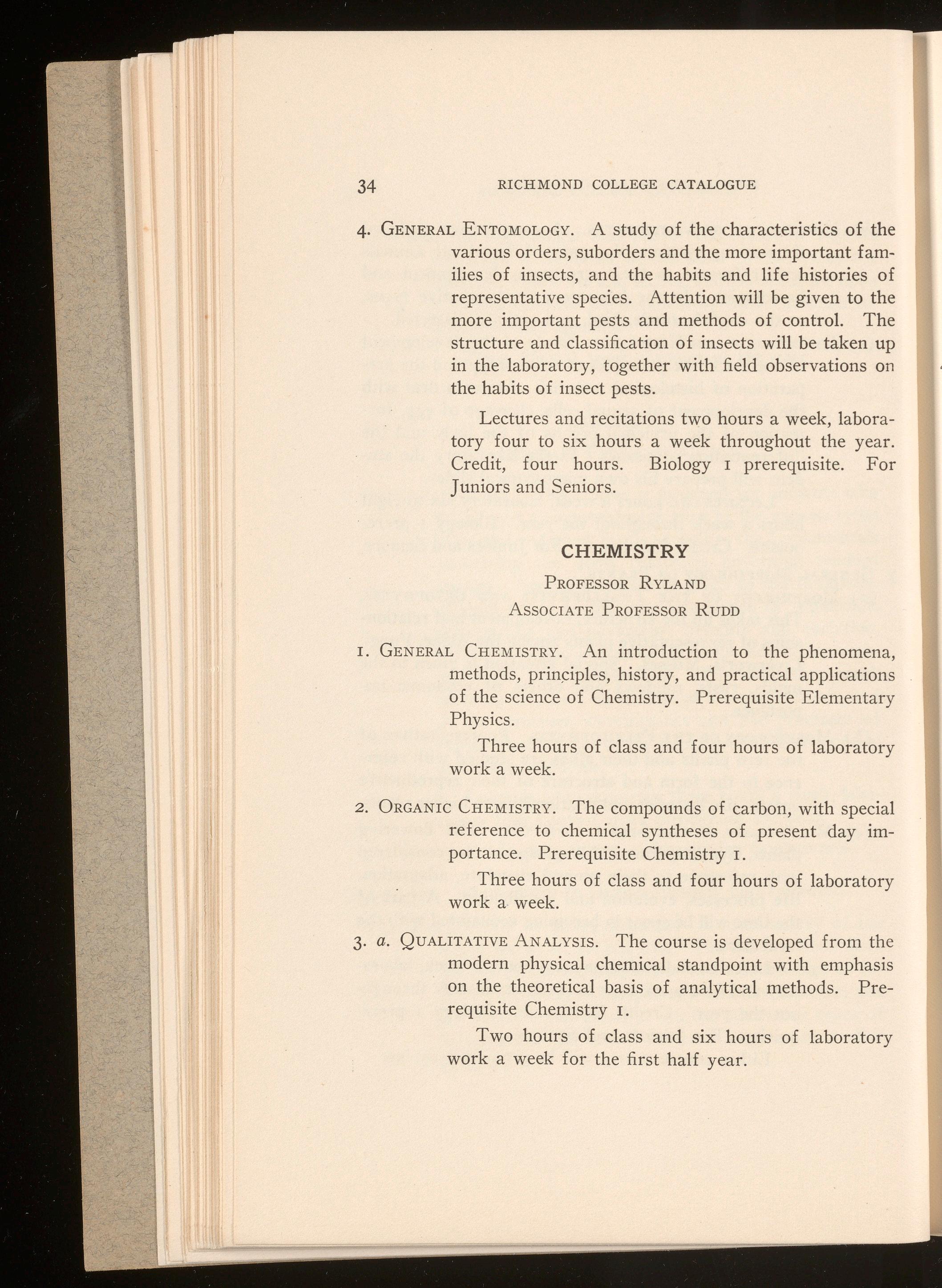
4. GENERALENTOMOLOGY.A study of the characteristics of the various orders, suborders and the more important families of insects, and the habits and life histories of representative species. Attention will be given to the more important pests and methods of control. The structure and classification of insects will be taken up in the laboratory, together with field observations on the habits of insect pests.
Lecture s and recitations two hours a week, laboratory four to six hours a week throughout the year. Credit, four hours. Biology I prerequisite. For Juniors and Seniors .
PROFESSORRYLAND
ASSOCIATE PROFESSORRUDD
I. GENERALCHEMISTRY. An introduction to the phenomena, methods, prin~iples, history, and practical applications of the science of Chemistry. Prerequisite Elementary Physics.
Three hours of class and four hours of laboratory work a week.
2. ORGANICCHEMISTRY The compounds of carbon, with special reference to chemical syntheses of present day importance. Prerequisite Chemistry I.
Three hours of class and four hours of laboratory work a week.
3. a. QUALITATIVEANALYSIS . The course is developed from the modern physical chemical standpoint with emphasis on the theoretical basis of analytical methods. Prerequisite Chemistry I.
Two hours of class and six hours of laboratory work a week for the first half year.
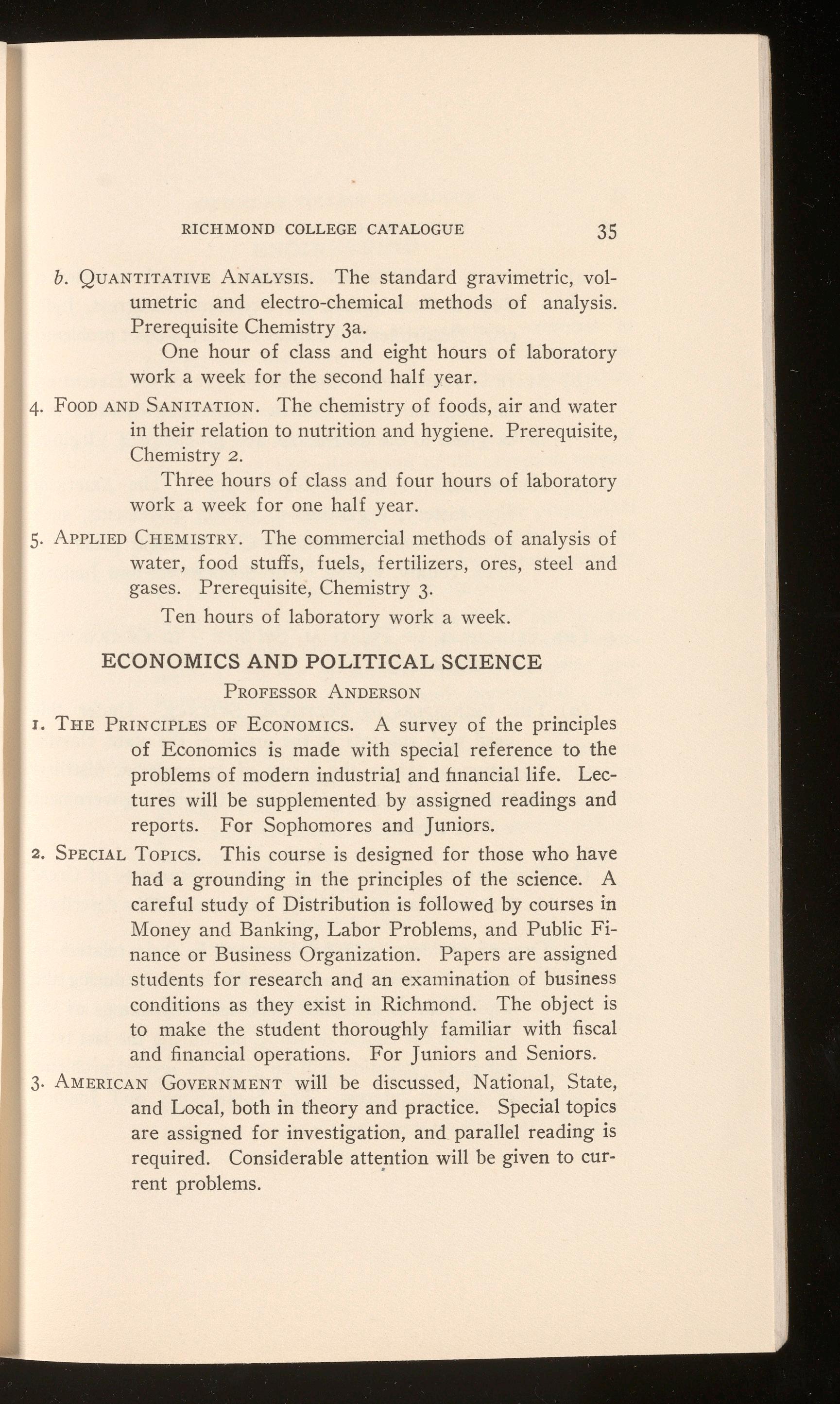
b. QUANTITATIVEANALYSIS. The standard gravimetric, volumetric and electro-chemical methods of analysis. Prerequisite Chemistry 3a.
One hour of class and eight hours of laboratory work a week for the second half year.
4. FooD ANDSANITATION. The chemistry of foods, air and water in their relation to nutrition and hygiene. Prerequisite, Chemistry 2.
Three hours of class and four hours of laboratory work a week for one half year.
5. APPLIEDCHEMISTRY. The commercial methods of analysis of water, food stuffs, fuels, fertilizers, ores, steel and gases. Prerequisite, Chemistry 3.
Ten hours of laboratory work a week.
PROFESSORANDERSON
r. THE PRINCIPLESOF EcoNOMICS. A survey of the principles of Economics is made with special reference to the problems of modern industrial and fmancial life. Lectures will be supplemented by assigned readings and reports. For Sophomores and Juniors.
2. SPECIALTOPICS. This course is designed for those who have had a grounding in the principles of the science. A careful study of Distribution is followed by courses in Money and Banking, Labor Problems, and Public Finance or Business Organization. Papers are assigned students for research and an examination of business conditions as they exist in Richmond. The object is to make the student thoroughly familiar with fiscal and financial operations. For Juniors and Seniors.
3. AMERICANGovERNMENTwill be discussed, National, State, and Local, both in theory and practice. Special topics are assigned for investigation, and parallel reading is required. Considerable atte ntion will be given to current problems.
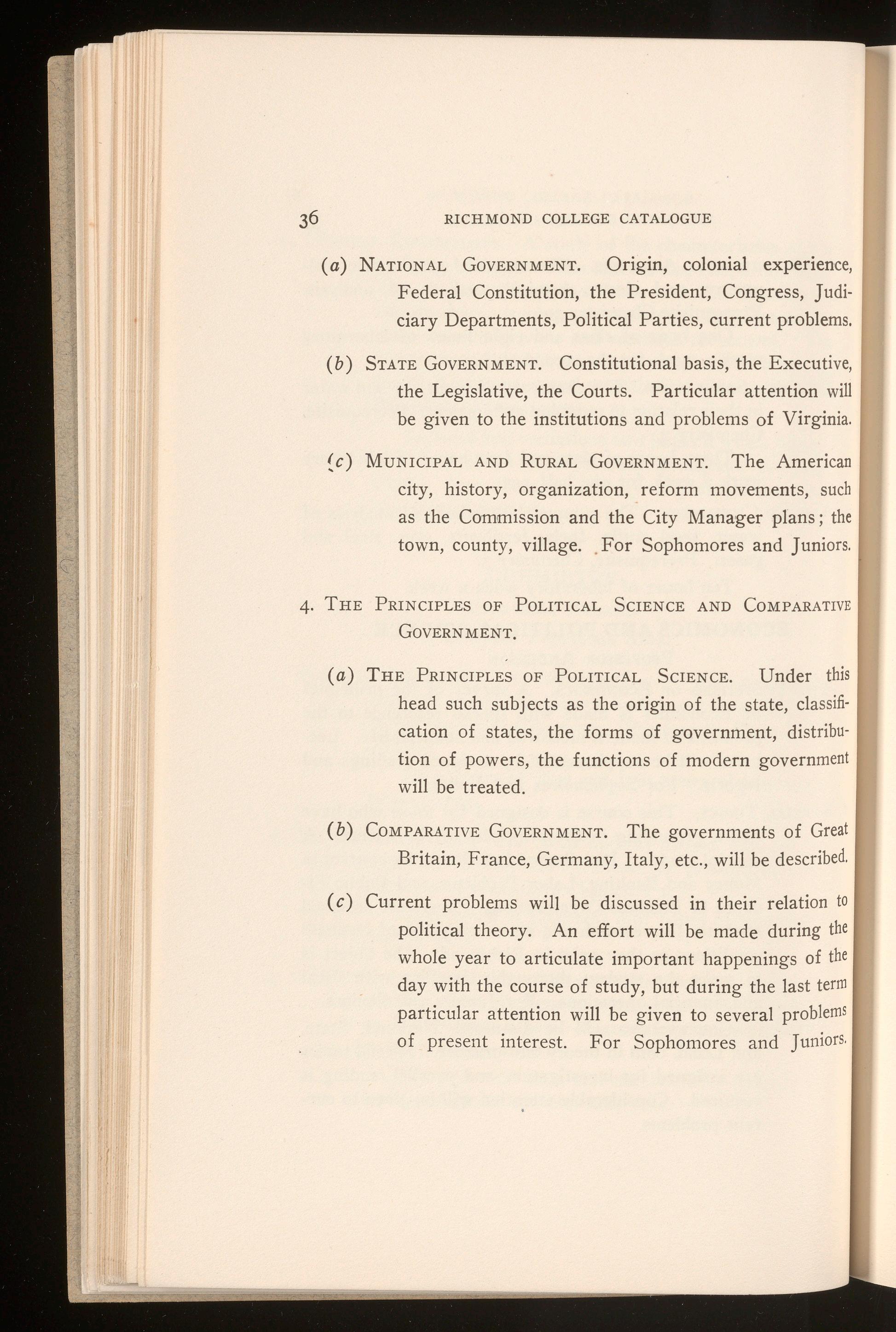
(a) NATIONAL GovERNMENT. Origin, colonial experience, Federal Constitution, the President, Congress, Judiciary Departments, Political Parties, current problems.
(b) STATE GovERNMENT. Constitutional basis, the Executi ve, the Legislative, the Courts. Particular attention will be given to the institutions and problems of Virginia
!c) MUNICIPAL AND RURAL GOVERNMENT. The American city, history, organization, reform movements, such as the Commission and the City Manager plans; the town, county, village. For Sophomores and Juniors.
4. THE PRINCIPLES OF POLITICAL SCIENCE AND COMPARATIVE GOVERNMENT.
(a) THE PRINCIPLES OF POLITICAL ScIENCE. Under this head such subjects as the origin of the state, cla ssification of states, the forms of government, distribution of powers, the functions of modern government will be treated.
(b) COMPARATIVEGovERNMENT. The governments of Great Britain, France, Germany, Italy, etc., will be described.
( c) Current problems will be discussed in their relation to political theory. An effort will be made during the whole year to articulate important happenings of the day with the course of study, but during the last term particular attention will be given to several problems of present interest. For Sophomores and Junior s.
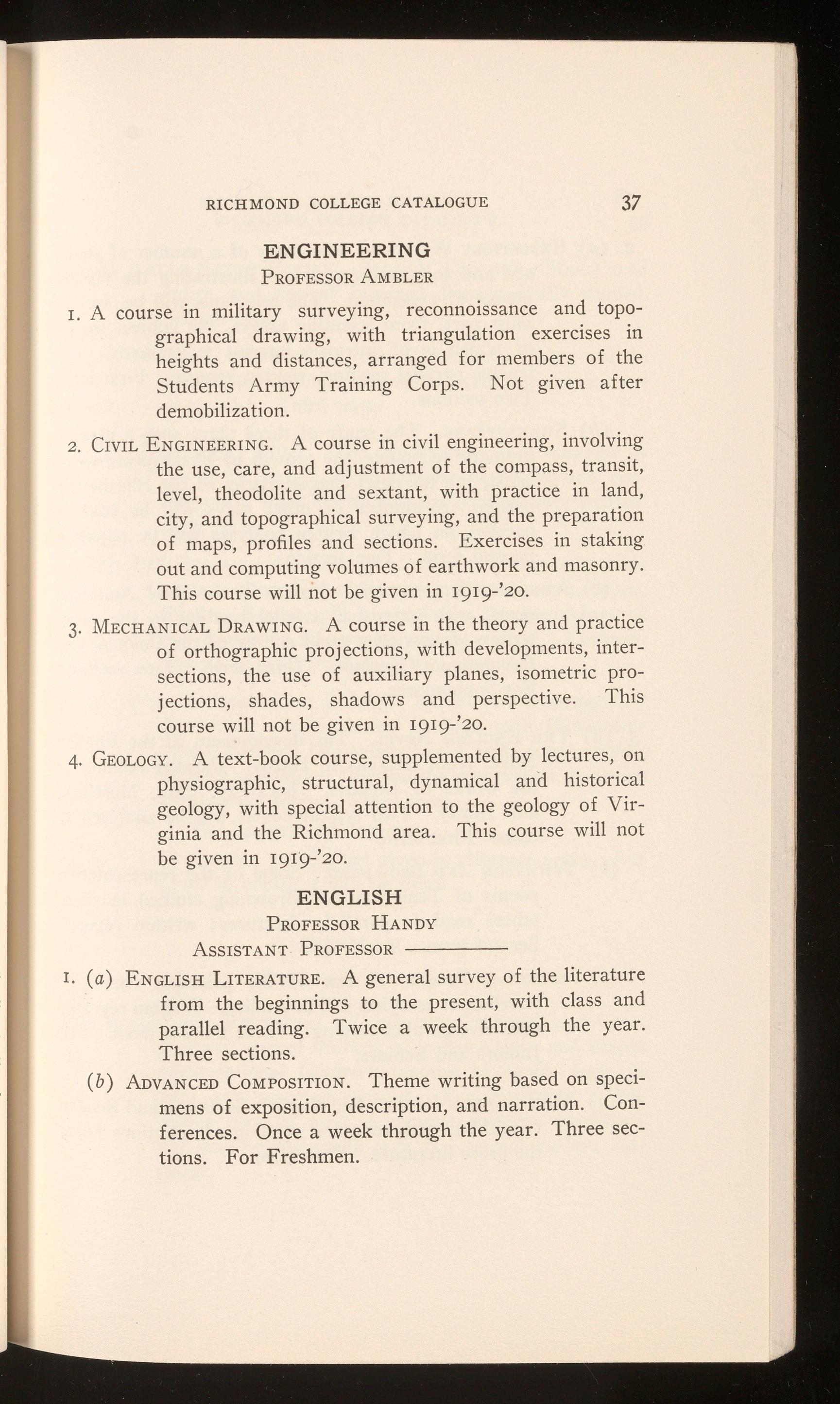
PROFESSORAMBLER
r. A course in military surveying, reconnoissance and topographical drawing, with triangulation exercises in heights and distances, arranged for members of the Students Army Training Corps. Not given after demobilization.
2. CIVILENGINEERING. A course in civil engineering, involving the use, care, and adjustment of the compass, transit, level, theodolite and sextant, with practice in land, city, and topographical surveying, and the preparation of maps, profiles and sections. Exercises in staking out and computing volumes of earthwork and masonry. This course will not be given in 1919-'20.
3. MECHANICALDRAWING. A course in the theory and practice of orthographic projections, with developments, intersections, the use of auxiliary planes, isometric projections, shades, shadows and perspective. This course will not be given in 1919-'20.
4. GEOLOGY.A text-book course, supplemented by lectures, on physiographic, structural, dynamical and historical geology, with special attention to the geology of Virginia and the Richmond area. This course will not be given in 1919-'20.
ENGLISH PROFESSORHANDY ASSISTANTPROFESSOR
I. (a) ENGLISHLITERATURE.A general survey of the literature from the beginnings to the present, with class and parallel reading. Twice a week through the year. Three sections.
(b) ADVANCEDCOMPOSITION.Theme writing based on specimens of exposition, description, and narration. Conferences. Once a week through the year. Three sections. For Freshmen.
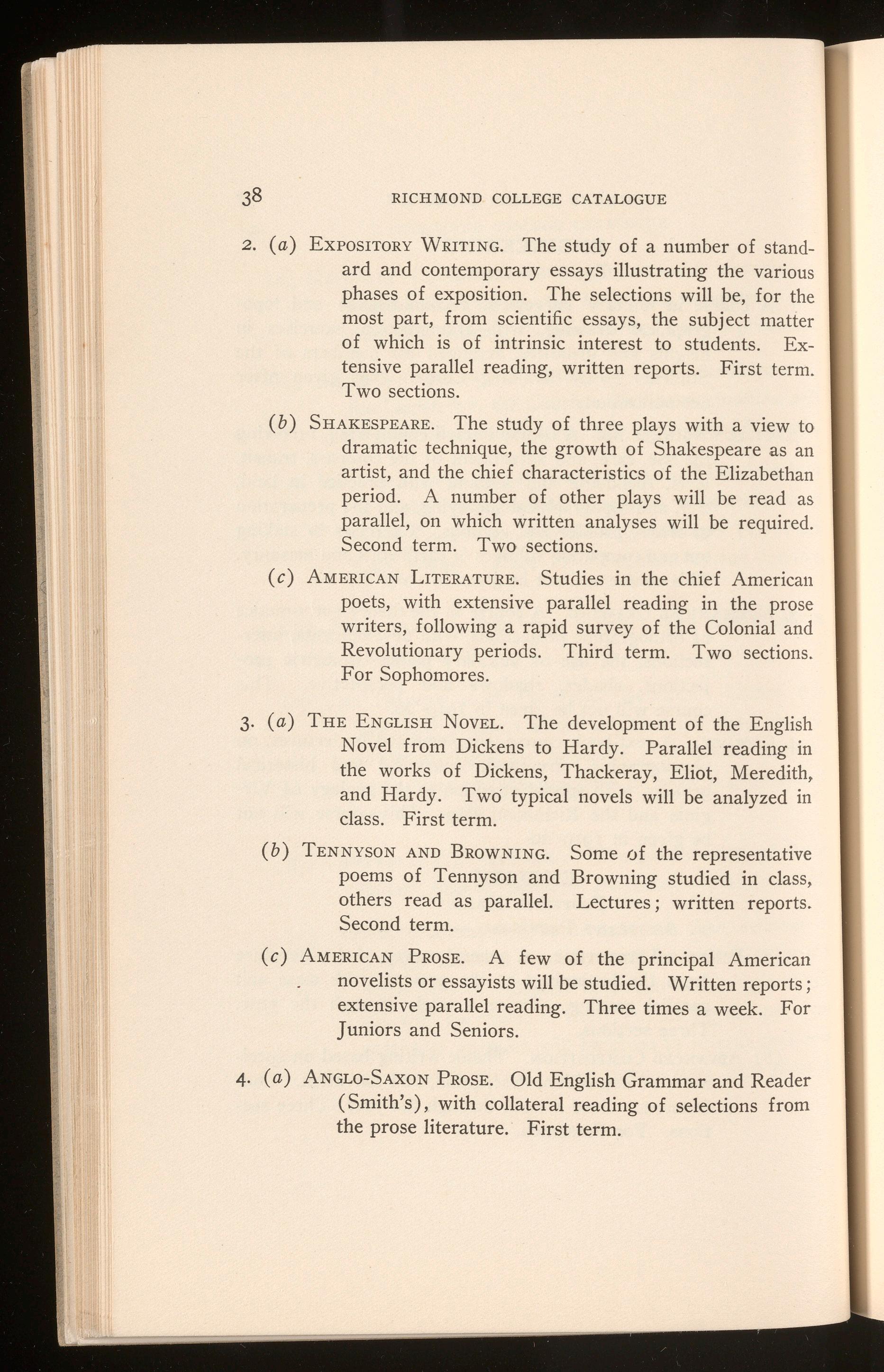
2. (a) EXPOSITORYWRITING. The study of a number of standard and contemporary essays illustrating the variou s phases of exposition. The selections will be, for the most part, from scientific essays, the subject matter of which is of intrinsic interest to students. Extensive parallel reading, written reports. First term. Two sections.
( b) SHAKESPEARE.The study of three plays with a view to dramatic technique, the growth of Shakespeare as an artist, and the chief characteristics of the Elizabethan period. A number of other plays will be read as parallel, on which written analyses will be required Second term. Two sections.
(c) AMERICANLITERATURE. Studies in the chief American poets, with extensive parallel reading in the prose writers, following a rapid survey of the Colonial and Revolutionary periods. Third term. Two sections . For Sophomores.
3. (a) THE ENGLISH NOVEL. The development of the English Novel from Dickens to Hardy. Parallel reading in the works of Dickens, Thackeray, Eliot, Meredith , and Hardy. Two typical novels will be analyzed in class . First term.
( b) TENNYSONAND BROWNING. poems of Tennyson and others read as parallel. Second term.
Some of the representative Browning studied in class, Lectures; written reports.
( c) AMERICAN PROSE. A few of the principal American novelists or essayists will be studied. Written reports; extensive parallel reading. Three times a week. For Juniors and Seniors.
4. (a) ANGLO-SAXONPROSE. Old English Grammar and Reader (Smith's), with collateral reading of selections from the prose literature. First term.
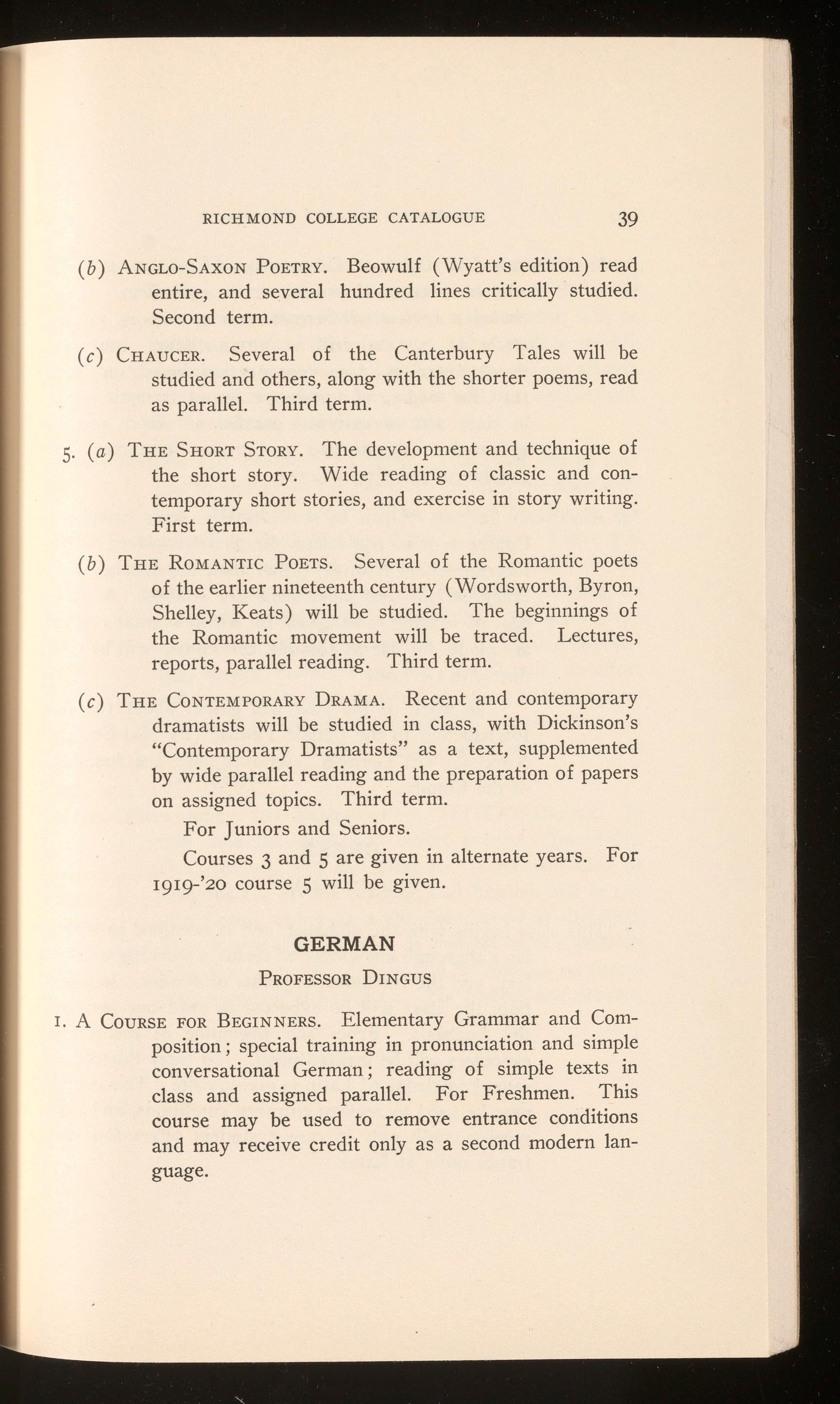
(b) ANGLO-SAXONPOETRY. Beowulf (Wyatt's edition) read entire, and several hundred lines critically studied. Second term.
( c) CHAUCER. Several of the Canterbury Tales will be studied and others, along with the shorter poems, read as parallel. Third term.
5. (a) THE SHORTSTORY. The development and technique of the short story. Wide reading of classic and contemporary short stories, and exercise in story writing. First term.
(b) THE ROMANTICPoETS. Several of the Romantic poets of the earlier nineteenth century (Wordsworth, Byron, Shelley, Keats) will be studied. The beginnings of the Romantic movement will be traced. Lectures, reports, parallel reading. Third term.
(c) THE CONTEMPORARYDRAMA. Recent and contemporary dramatists will be studied in class, with Dickinson's "Contemporary Dramatists" as a text, supplemented by wide parallel reading and the preparation of papers on assigned topics. Third term.
For Juniors and Seniors.
Courses 3 and 5 are given in alternate years. For 1919-'20 course 5 will be given.
I. A COURSEFOR BEGINNERS. Elementary Grammar and Composition; special training in pronunciation and simple conversational German; reading of simple texts in class and assigned parallel. For Freshmen. This course may be used to remove entrance conditions and may receive credit only as a second modern language.
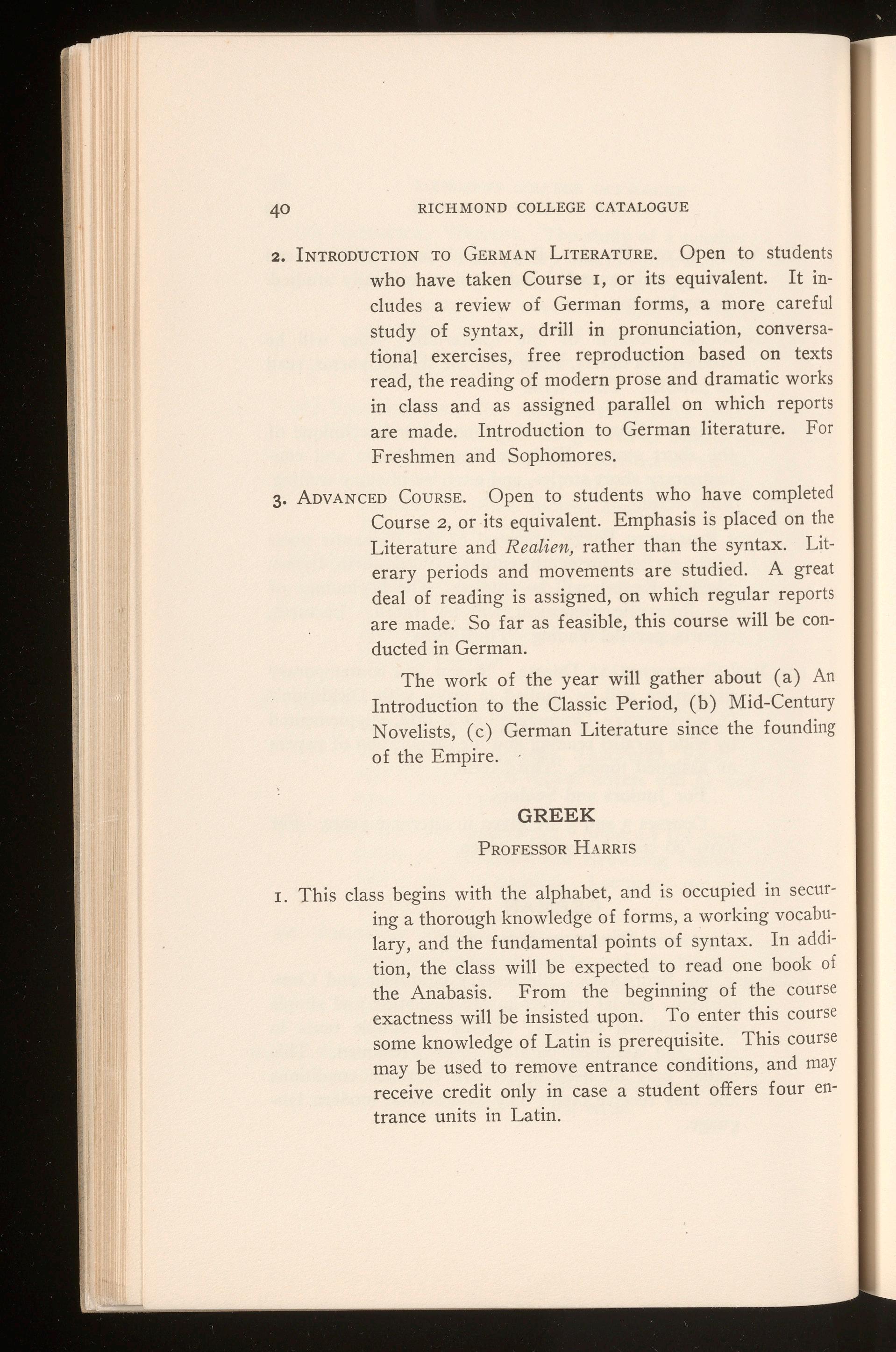
2. INTRODUCTIONTO GERMAN LITERATURE. Open to students who have taken Course 1, or its equivalent. It includes a review of German forms, a more careful study of syntax, drill in pronunciation, conversational exercises, free reproduction based on texts read, the reading of modern prose and dramatic works in class and as assigned parallel on which reports are made. Introduction to German literature. For Freshmen and Sophomores.
3. ADVANCEDCouRSE. Open to students who have completed Course 2, or its equivalent. Emphasis is placed on the Literature and Realien, rather than the syntax. Literary periods and movements are studied. A great deal of reading is assigned, on which regular reports are made . So far as feasible, this course will be conducted in German.
The work of the year will gather about (a) An Introduction to the Classic Period, (b) Mid-Century Novelists, ( c) German Literature since the founding of the Empire.
GREEK PROFESSORHARRIS
1. This class begins with the alphabet, and is occupied in securing a thorough knowledge of forms, a working vocabulary, and the fundamental points of syntax. In addition, the class will be expected to read one book of the Anabasis. From the beginning of the course exactness will be insisted upon. To enter this course some knowledge of Latin is prerequisite. This course may be used to remove entrance conditions, and may receive credit only in case a student offers four entrance units in Latin.
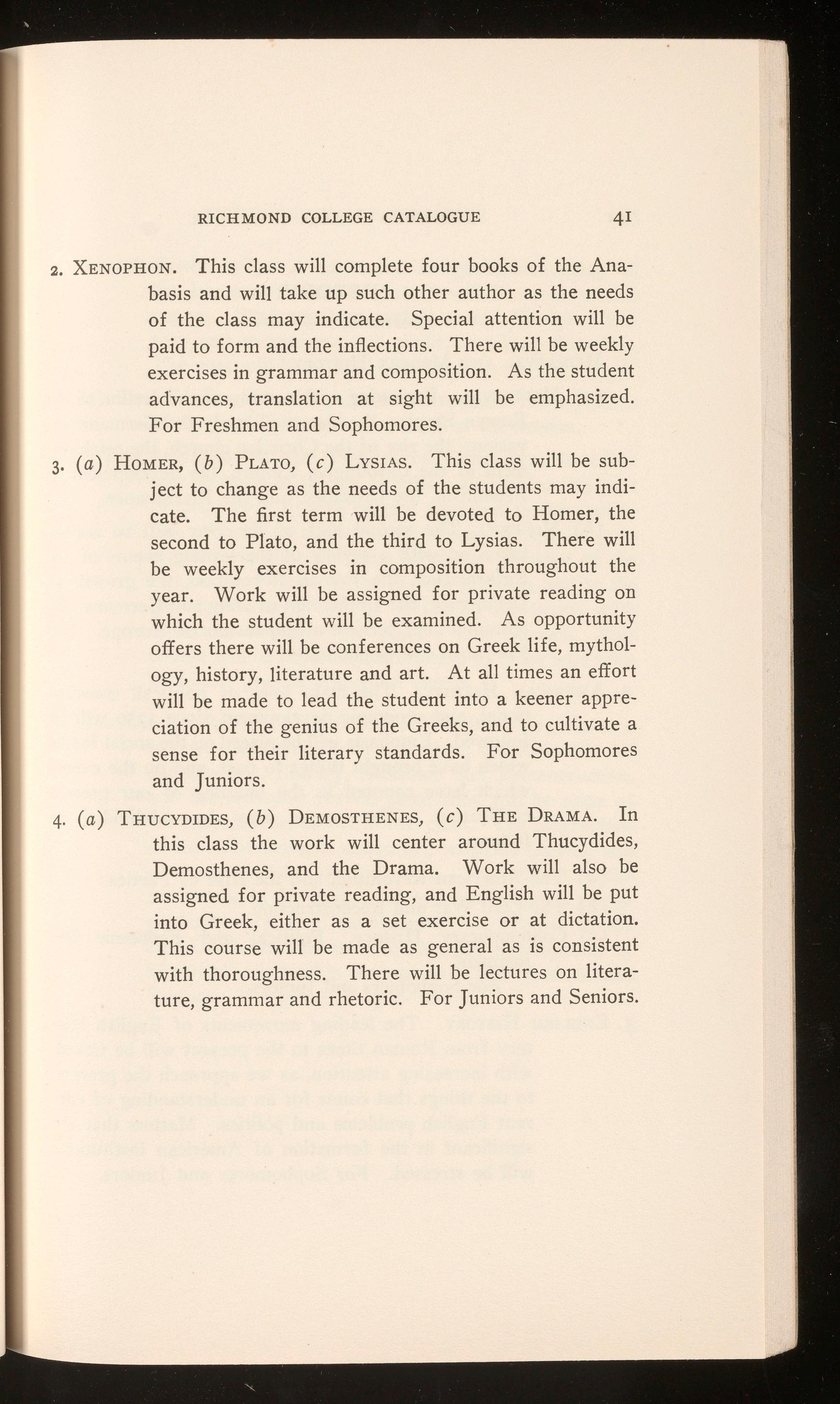
2. XENOPHON. This class will complete four books of the Anabasis and will take up such other author as the needs of the class may indicate. Special attention will be paid to form and the inflections . There will be weekly exercises in grammar and composition. As the student advances, translation at sight will be emphasized. For Freshmen and Sophomores.
3. (a) Ho MER, ( b) PLATO, ( c) LYSIAS. This class will be subject to change as the needs of the students may indicate. The first term will be devoted to Homer, the second to Plato, and the third to Lysias. There will be weekly exercises in composition throughout the year. Work will be assigned for private reading on which the student will be examined. As opportunity offers there will be conferences on Greek life, mythology, history, literature and art. At all times an effort will be made to lead the student into a keener appreciation of the genius of the Greeks, and to cultivate a sense for their literary standards. For Sophomores and Juniors.
4. (a) THUCYDIDES,( b) DEMOSTHENES,( c) THE DRAMA. In this class the work will center around Thucydides, Demosthenes, and the Drama. Work will also be assigned for private reading, and English will be put into Greek, either as a set exercise or at dictation. This course will be made as general as is consistent with thoroughness. There will be lectures on literature, grammar and rhetoric. For Juniors and Seniors.

I. MEDIAEVALANDMODERNHISTORY.
(a) MEDIAEVAL.Beginning with a study of the decline of the Roman Empire, the class will study the Germanic invasions, the rise of the Christian church, the establishment of the Carolingian Empire, the development of Feudalism, the Crusades, and the Renaissance.
( b) MODERN. The second half of the year will be mainl y taken up with a review of the leading events of the Reformation, the French Revolution, the growth of Democracy, the Unification of Italy and Germany, the economic and territorial expansion of Europe. For Freshmen and Sophomores.
2. AMERICANHISTORY. The main lines of political, constitutional, and economic development since I 750 will be followed. Emphasis will be placed on the social forces which have brought things to pass, and on the events which have counted in the building of our present civilization. The course may be subdivided as follows:
(a) The American Revolution and the Rise of Parties.
( b) The Civil War and Reconstruction.
(c) Contemporary History. Political and Economic Rejustment.
For Sophomers and Juniors.
3. ENGLISH HISTORY. The leading movements of English History from Roman times to the present will be traced, with increasing attention, as we approach the present, to the things that count for an understanding of current English problems and politics. Matters that are significant in the formation of American institutions will be stressed. For Sophomores and Juniors.
4. EUROPE SINCE 1789. A somewhat comprehensive study of the last century and a quarter will be made in this course. Students interested in recent European history and movements will profit by taking this class . The year will be divided between :
(a) THE FRENCH REVOLUTIONANDNAPOLEON. This portion of the work will cover one-third of the session.

(
b) THE NINETEENTH AND TWENTIETH CENTURY. An effort will be made in the six months assigned for this part of the course to give careful attention to the formation of national states, to the spread of popular government, to the enormous economic changes of the last hundred years, to the eastern problem, and to the questions arising out of European expansion with Asia and Africa . For Juniors and Seniors This course will be especially interesting to tho se who wish to follow present European events.
5. V IRGINIAHISTORY. The founding of Virginia, Virginia as a colony, the Revolutionary struggle, the formation of constitutions, Slavery, Secession and Reconstruction, and the economic revival since 1865 will be some of the subjects considered in this class. The biographies of the most eminent statesmen, religious leaders, and educators will be touched upon. The objects of the course are, in the main, two : to afford students an opportunity to gain a knowledge of the History of the Old Dominion, and to encourage the development of historical scholarship among us. For Juniors an<1 Seniors. Not given in 1919-'20.
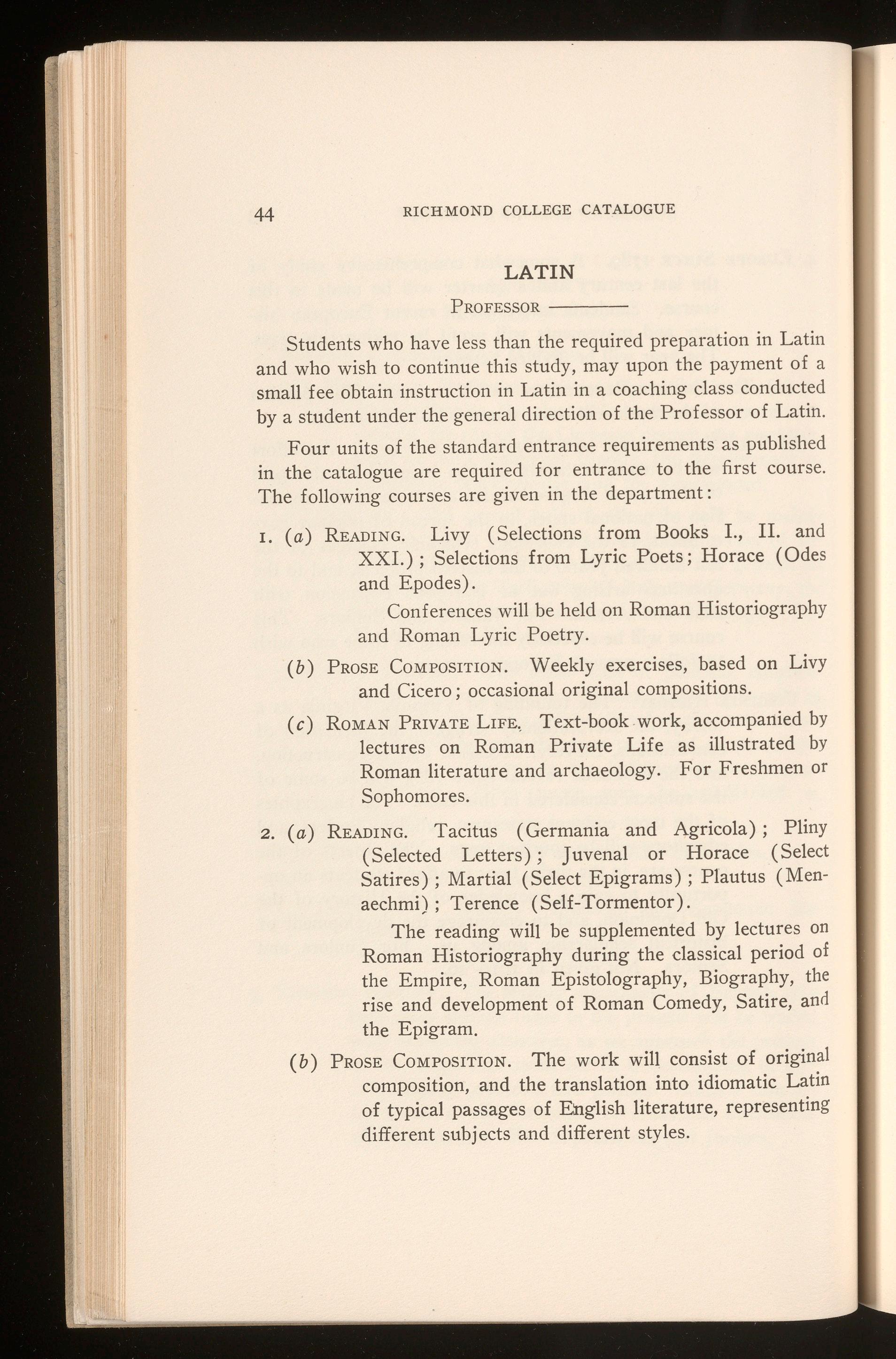
Students who have less than the required preparation in Latin and who wish to continue this study, may upon the payment of a small fee obtain instruction in Latin in a coaching class conducted by a student under the general direction of the Professor of Latin.
Four units of the standard entrance requirements as published in the catalogue are required for entrance to the first course. The following courses are given in the department :
I. (a) READING. Livy ( Selections from Books I., II. and XXI.) ; Selections from Lyric Poets; Horace ( Odes and Epodes).
Conferences will be held on Roman Historiography and Roman Lyric Poetry.
(b) PROSE COMPOSITION.Weekly exercises, based on Livy and Cicero; occasional original compositions.
( c) ROMANPRIVATELIFE._ Text-book work, accompanied by lectures on Roman Private Life as illustrated by Roman literature and archaeology. For Freshmen or Sophomores.
2. (a) READING. Tacitus (Germania and Agricola); Pliny ( Selected Letters) ; Juvenal or Horace ( Select Satires) ; Martial ( Select Epigrams) ; Plautus ( Menaechmi); Terence (Self-Tormentor).
The reading will be supplemented by lectures on Roman Historiography during the classical period of the Empire, Roman Epistolography, Biography, the rise and development of Roman Comedy, Satire, and the Epigram.
( b) PROSE COMPOSITION.The work will consist of original composition, and the translation into idiomatic Latin of typical passages of English literature, representing different subjects and different styles.
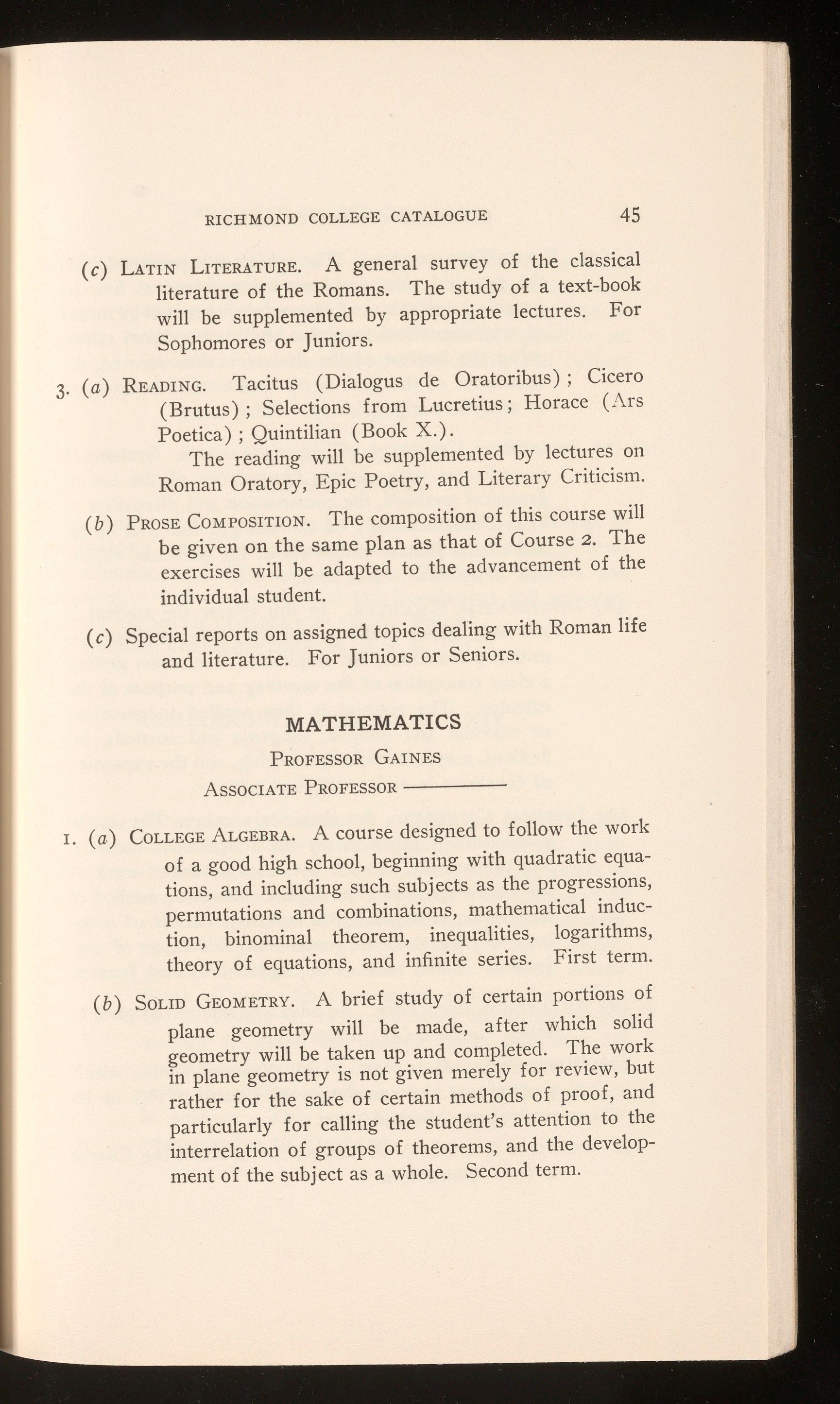
(c) LATIN LITERATURE. A general survey of the classical literature of the Romans. The study of a text-book will be supplemented by appropriate lectures. For Sophomores or Juniors.
3. (a) READING. Tacitus ( Dialogus de Oratoribus) ; Cicero (Brutus) ; Selections from Lucretius ; Horace ( A rs Poetica) ; Quintilian ( Book X ). The reading will be supplemented by lectures on Roman Oratory, Epic Poetry, and Literary Criticism.
( b) PROSECOMPOSITION.The composition of this course will be given on the same plan as that of Course 2. The exercises will be adapted to the advancement of the individual student.
( c) Special reports on assigned topics dealing with Roman life and literature. For Juniors or Seniors.
ASSOCIATEPROFESSOR-----
!. (a) CoLLEGEALGEBRA.A course designed to follow the work of a good high school, beginning with quadratic equations, and including such subjects as the progressions, permutations and combinations, mathematical induction, binominal theorem, inequalities, logarithms, theory of equations, and infinite series. First term.
( b) So LID GEOMETRY A brief study of certain portions of plane geometry will be made, after which solid geometry will be taken up and completed. The work in plane geometry is not given merely for review, but rather for the sake of certain methods of proof, and particularly for calling the student's attention to the interrelation of groups of theorems, and the development of the subject as a whole. Second term.
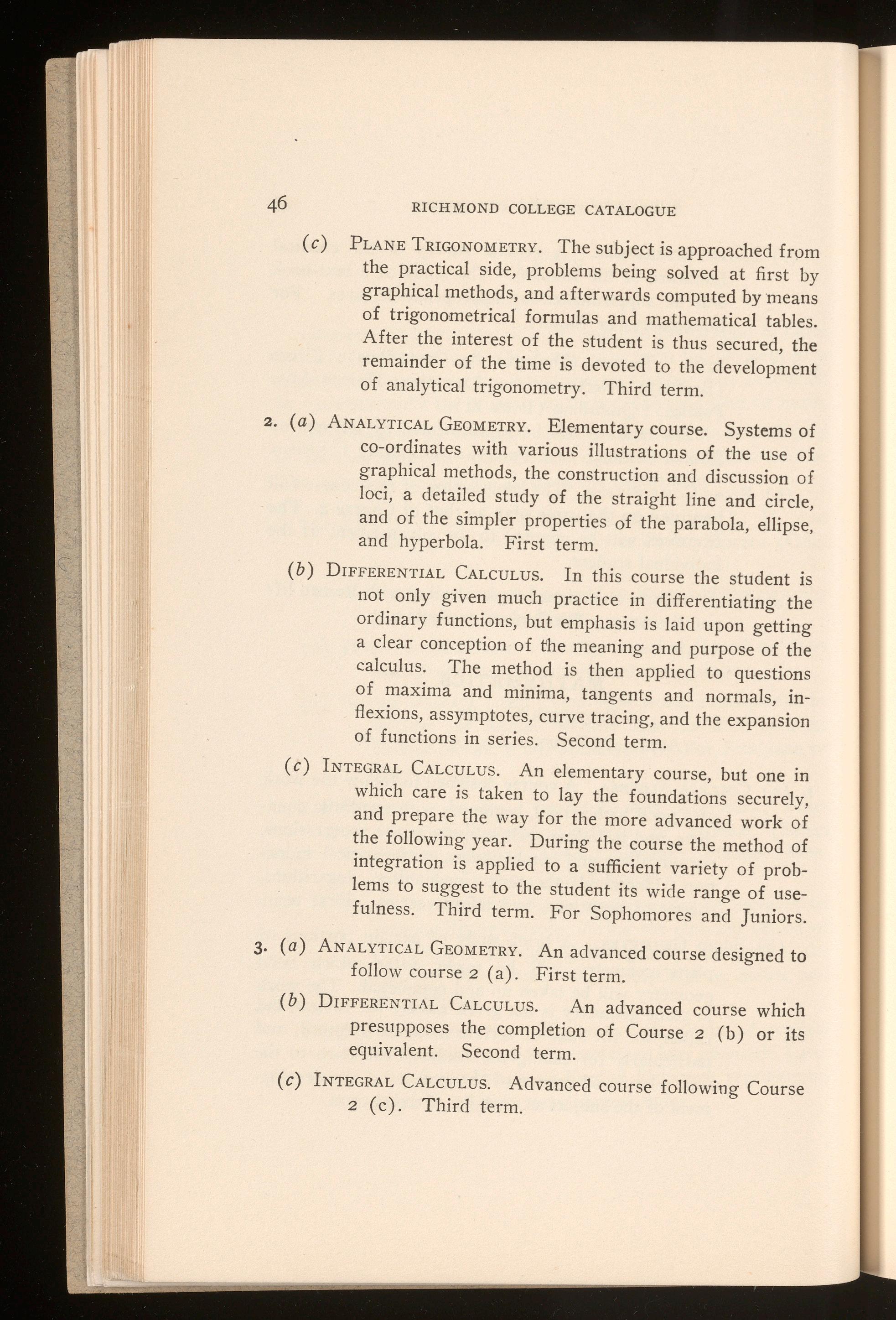
(c) PLANE TRIGONOMETRY.The subject is approached from the practical side, problems being solved at first by graphical methods, and afterwards computed by ·means of trigonometrical formulas and mathematical tables. After the interest of the student is thus secured, the remainder of the time is devoted to the development of analytical trigonometry. Third term.
2. (a) ANALYTICALGEOMETRY.Elementary course. Systems of co-ordinates with various illustrations of the use of graphical methods, the construction and discussion of loci, a detailed study of the straight line and circle, and of the simpler properties of the parabola, ellipse, and hyperbola. First term.
( b) DIFFERENTIALCALCULUS. In this course the student is not only given much practice in differentiating the ordinary functions, but emphasis is laid upon getting a clear conception of the meaning and purpose of the calculus. The method is then applied to questions of maxima and minima, tangents and normals, in- flexions, assymptotes, curve tracing, and the expansion of functions in series. Second term.
(c) INTEGRALCALCULUS. An elementary course, but one in which care is taken to lay the foundations securely, and prepare the way for the more advanced work of the following year. During the course the method of integration is applied to a sufficient variety of prob- lems to suggest to the student its wide range of use- fulness. Third term. For Sophomores and Juniors.
3. (a) ANALYTICALGEOMETRY.An advanced course designed to follow course 2 (a). First term.
( b) DIFFERENTIALCALCULUS. An advanced course which presupposes the completion of Course 2 (b) or its equivalent. Second term.
(c) INTEGRALCALCULUS. Advanced course following Course 2 ( c). Third term.
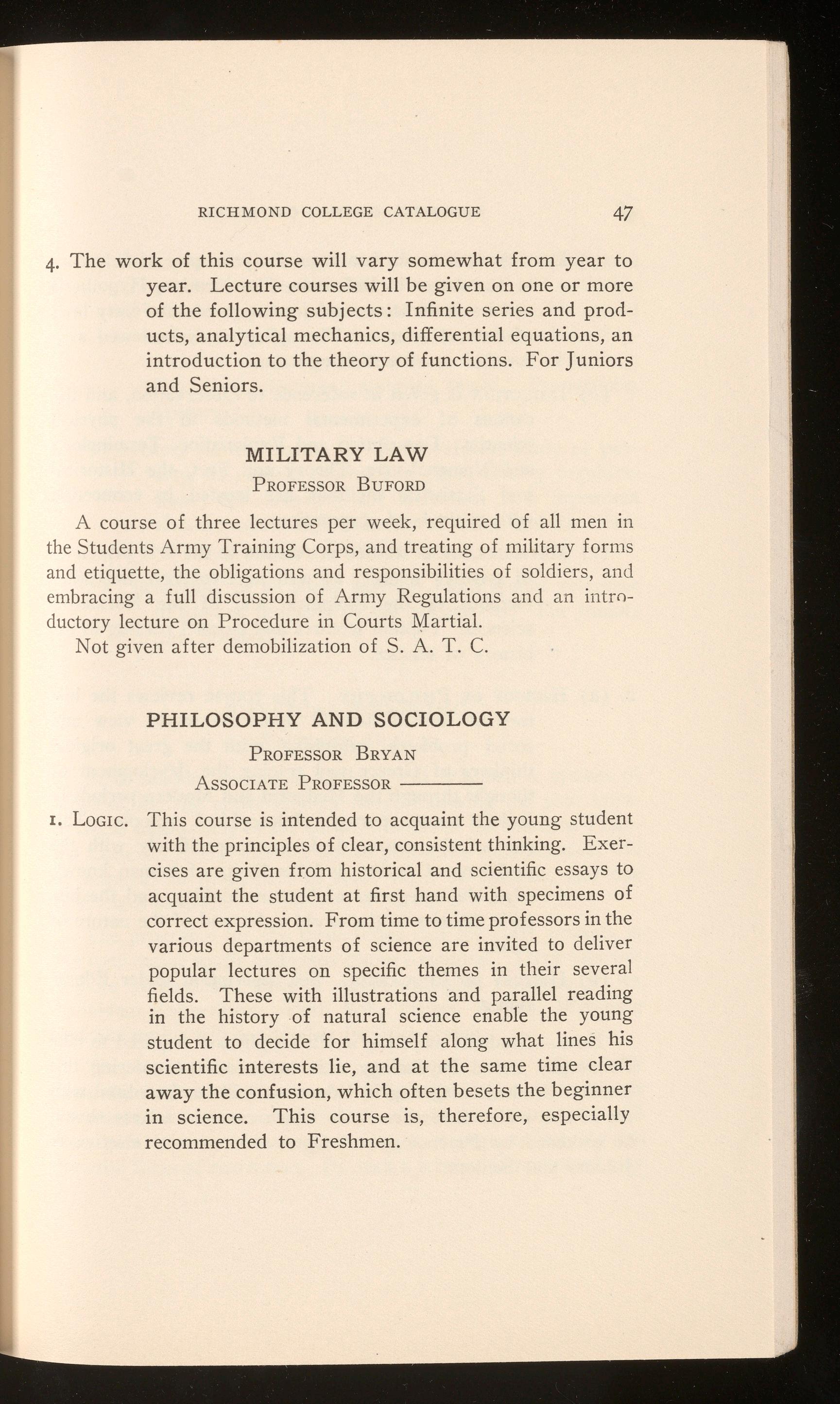
4. The work of this course will vary somewhat from year to year. Lecture courses will be given on one or more of the following subjects: Infinite series and products, analytical mechanics, differential equations, an introduction to the theory of functions. For Juniors and Seniors.
PROFESSOR BUFORD
A course of three lectures per week, required of all men in the Students Army Training Corps, and treating of military forms and etiquette, the obligations and responsibilities of soldiers, and embracing a full discussion of Army Regulations and an introductory lecture on Procedure in Courts ¥artial.
Not given after demobilization of S. A. T. C.
PROFESSOR BRYAN ASSOCIATE PROFESSOR----
I. LOGIC. This course is intended to acquaint the young student with the principles of clear, consistent thinking. Exercises are given from historical and scientific essays to acquaint the student at first hand with specimens of correct expression. From time to time professors in the various departments of science are invited to deliver popular lectures on specific themes in their several fields. These with illustrations and parallel reading in the history of natural science enable the young student to decide for himself along what lines his scientific interests lie, and at the same time clear away the confusion, which often besets the beginner in science. This course is, therefore, especially recommended to Freshmen.
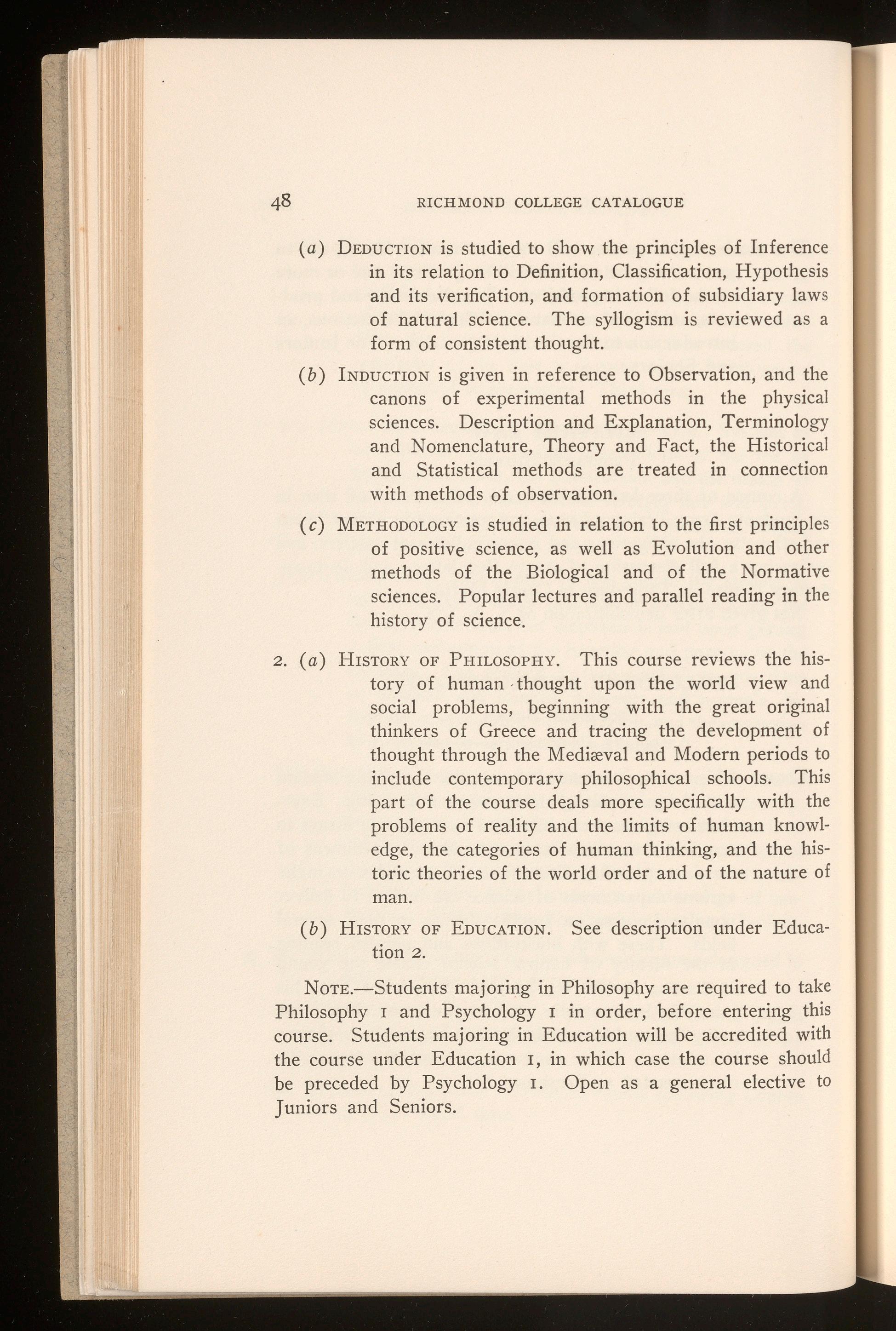
(a) DEDUCTIONis studied to show the principles of Inference in its relation to Definition, Classification, Hypothesis and its verification, and formation of subsidiary law s of natural science. The syllogism is reviewed as a form of consistent thought.
( b) INDUCTIONis given in reference to Observation, and the canons of experimental methods in the physical sciences. Description and Explanation, Terminology and Nomenclature, Theory and Fact, the Historical and Statistical methods are treated in connection with methods of observation.
( c) METHODOLOGY is studied in relation to the first principle s of positive science, as well as Evolution and other methods of the Biological and of the Normative sciences. Popular lectures and parallel reading in the history of science .
2. (a) HISTORYOF PHILOSOPHY. This course reviews the history of human -thought upon the world view and social problems, beginning with the great original thinkers of Greece and tracing the development of thought through the Mediceval and Modern periods to include contemporary philosophical schools. This part of the course deals more specifically with the problems of reality and the limits of human knowledge, the categories of human thinking, and the historic theories of the world order and of the nature of man.
( b) HISTORYOF EDUCATION. See description under Education 2 .
NoTE.-Students majoring in Philosophy are required to take Philosophy I and Psychology I in order, before entering this course. Students majoring in Education will be accredited with the course under Education I, in which case the course should be preceded by Psychology I. Open as a general elective to Juniors and Seniors.
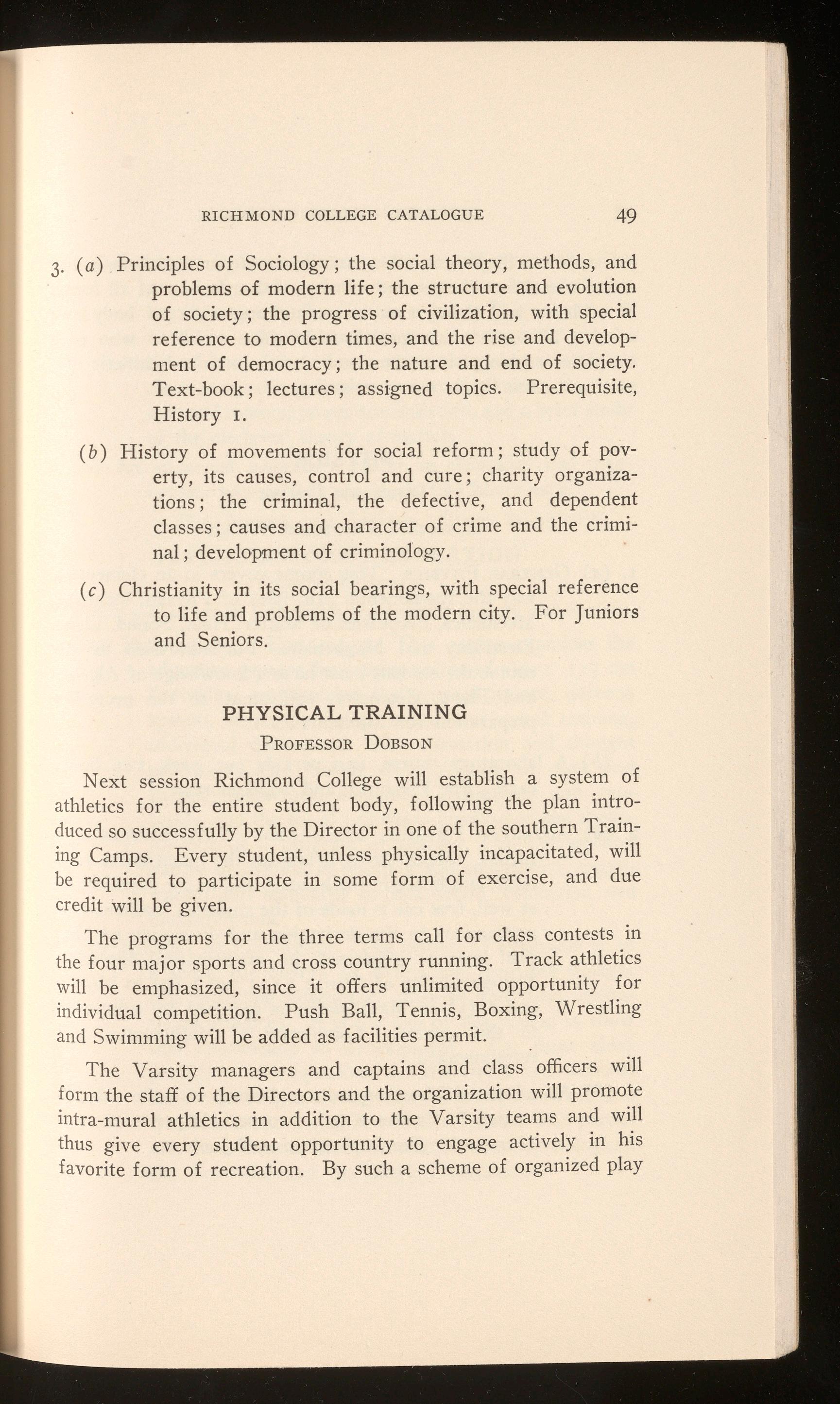
3. (a) Principles of Sociology; the social theory, methods, and problems of modern life; the structure and evolution of society; the progress of civilization, with special reference to modern times, and the rise and development of democracy; the nature and end of society. Text-book; lectures; assigned topics. Prerequisite, History r.
( b) History of movements for social reform; study of poverty, its causes, control and cure; charity organizations ; the criminal, the defective, and dependent classes; causes and character of crime and the criminal; development of criminology.
( c) Christianity in its social bearings, with special reference to life and problems of the modern city. For Juniors and Seniors.
PROFESSOR DOBSON
Ne xt session Richmond College will establish a system of ath letics for the entire student body, following the plan introduced so successfully by the Director in one of the southern Training Camps. Every student, unless physically incapacit ated, will be required to participate in some form of exercise , and due credit will be given.
T h e programs for the three terms call for class contests in the four major sports and cross country running. Track athletic s will be emphasized, since it offers unlimited opportunity for individual competition. Push Ball, Tennis, Boxing, Wrestling and Swimming will be added as facilities permit.
T he Varsity managers and captains and class officers will form the staff of the Directors and the organization will promote intr a-mural athletics in addition to the Varsity teams and will th us give every student opportunity to engage actively in his favorite form of recreation. By such a scheme of organized play
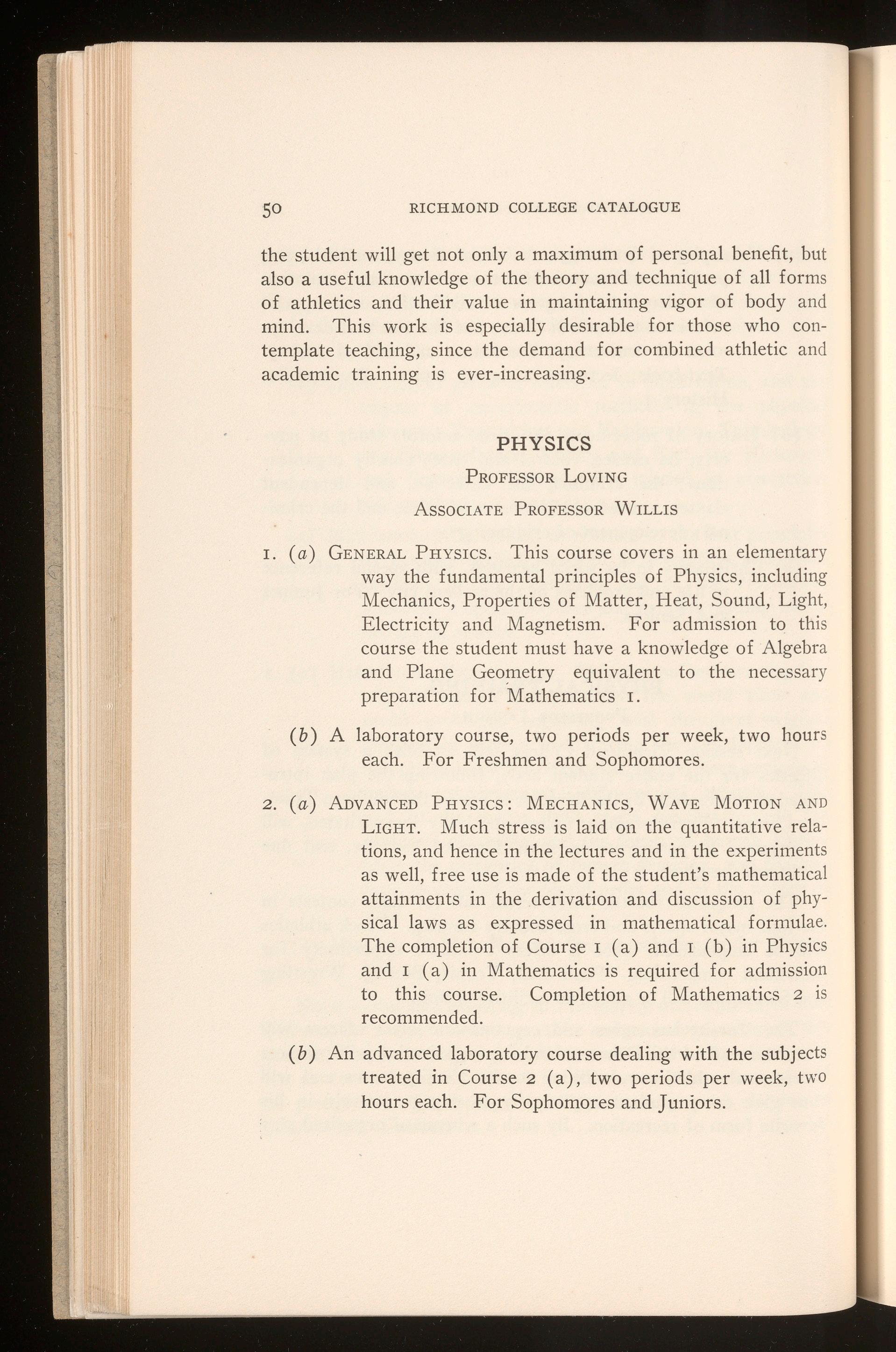
the student will get not only a maximum of personal benefit, but also a useful knowledge of the theory and technique of all form s of athletics and their value in maintaining vigor of body an d mind. This work is especially desirable for those who contemplate teaching, since the demand for combined athletic an d academic training is ever-increasing.
r. (a) GENERALPHYSICS. This course covers in an elementar y way the fundamental principles of Physics, includin g Mechanics, Properties of Matter, Heat, Sound, Light , Electricity and Magnetism. For admission to th is course the student must have a knowledge of Algebr a and Plane Geometry equivalent to the necessar y preparation for Mathematics I.
( b) A laboratory course, two periods per week, two hour s each. For Freshmen and Sophomores.
2. (a) ADVANCEDPHYSICS: MECHANICS, WAVE MoTroN AND LIGHT. Much stress is laid on the quantitative rel ations, and hence in the lectures and in the experiment s as well, free use is made of the student's mathematic al attainments in the derivation and discussion of ph ysical laws as expressed in mathematical formula e The completion of Course I (a) and I (b) in Physic s and I (a) in Mathematics is required for admission to this course . Completion of Mathematics 2 is recommended.
( b) An advanced laboratory course dealing with the subjects treated in Course 2 (a), two periods per week, two hours each . For Sophomores and Juniors.
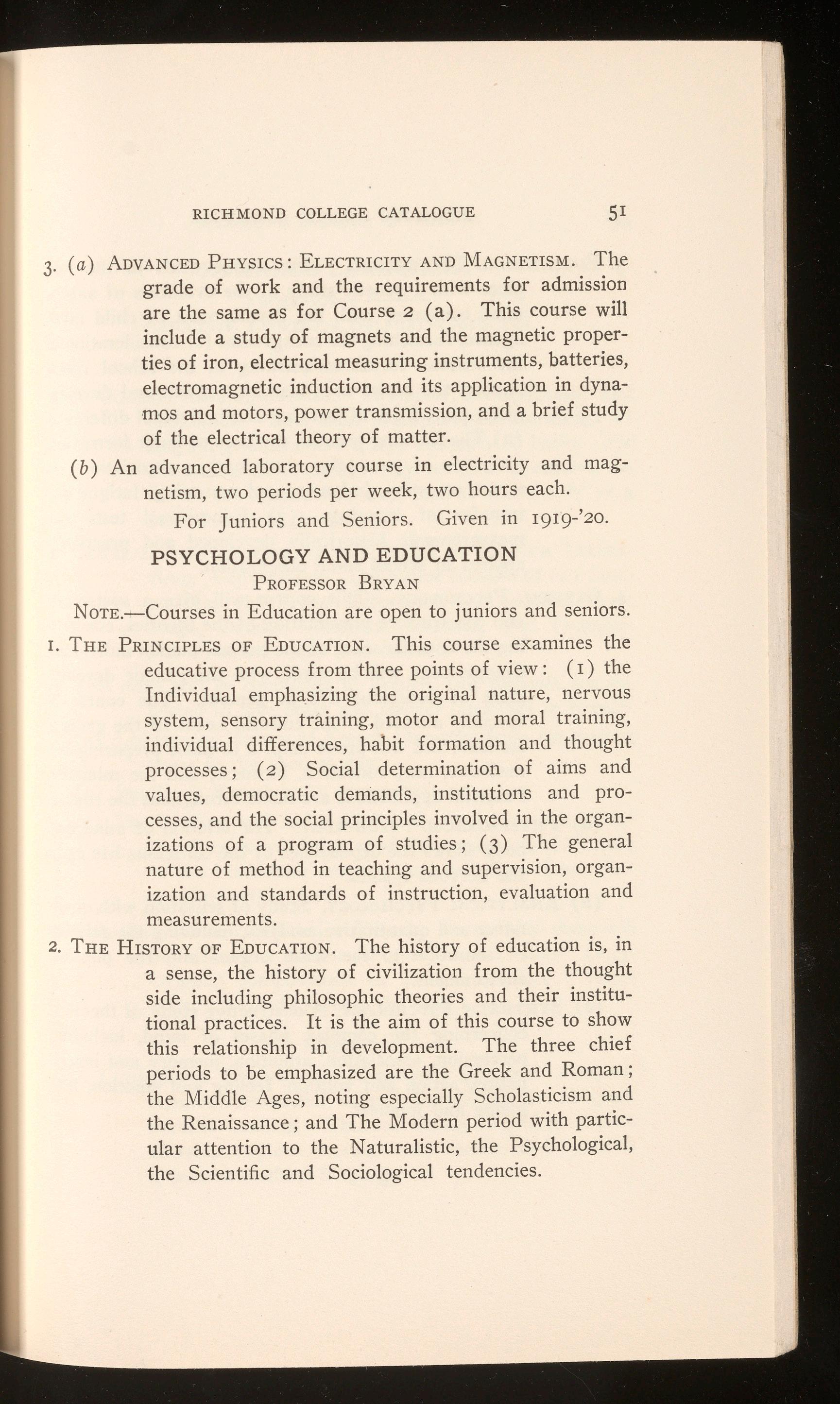
3. (a) ADVANCEDPHYSICS: ELECTRICITYANDMAGNETISM. The grade of work and the requirements for admission are the same as for Course 2 (a) . This course will include a study of magnets and the magnetic properties of iron, electrical measuring instruments, batteries, electromagnetic induction and its application in dynamos and motors, power transmission, and a brief study of the electrical theory of matter.
(b) An advanced laboratory course in electricity and magnetism, two periods per week, two hours each.
For Juniors and Seniors. Given in 1919-'20.
Norn.-Courses in Education are open to juniors and seniors.
I. THE PRINCIPLESOF EDUCATION. This course examines the educative process from three points of view : (I) the Individual empha,sizing the original nature, nervous system, sensory training, motor and moral training, individual differences, habit formation and thought processes; ( 2) Social determination of aims and values, democratic demands, institutions and processes, and the social principles involved in the organizations of a program of studies; (3) The general nature of method in teaching and supervision, organization and standards of instruction, evaluation and measurements.
2 THE HISTORYOF EDUCATION. The history of education is, in a sense, the history of civilization from the thought side including philosophic theories and their institutional practices. It is the aim of this course to show this relationship in development. The three chief periods to be emphasized are the Greek and Roman; the Middle Ages, noting especially Scholasticism and the Renaissance ; and The Modern period with particular attention to the Naturalistic, the Psychological, the Scientific and Sociological tendencies .
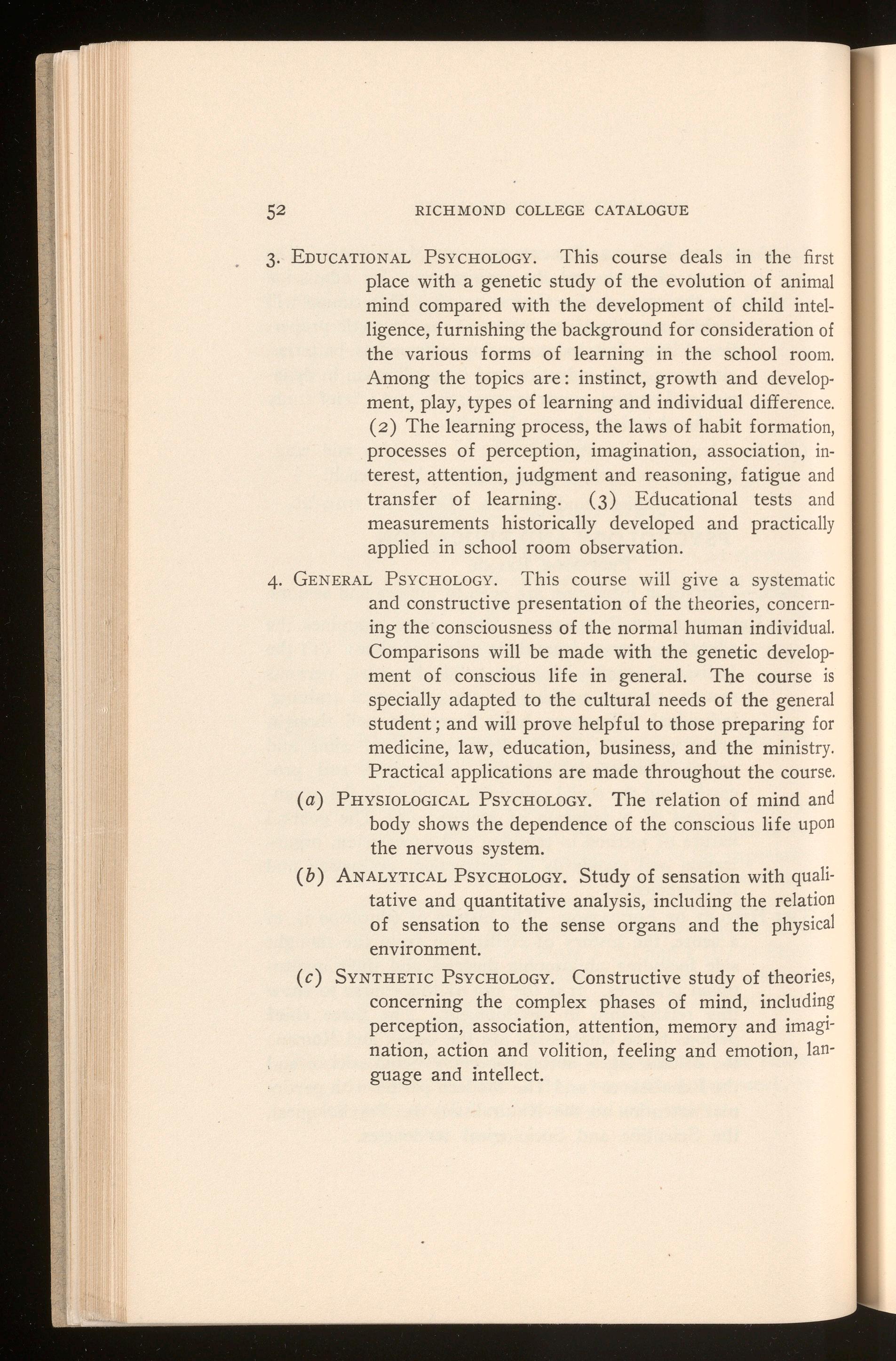
3 EDUCATIONALPSYCHOLOGY.This course deal s in th e first place with a genetic study of the evolution of ani mal mind compared with the development of child intelligence, furnishing the background for consideration of the various forms of learning in the school ro om. Among the topics are : instinct, growth and devel opment, play, types of learning and individual differen ce. ( 2) The learning process, the laws of habit formati on, processes of perception, imagination, association, interest, attention, judgment and reasoning, fatigue and transfer of learning . (3) Educational tests and measurements historically developed and practic ally applied in school room observation.
4. GENERAL PSYCHOLOG Y. This course will give a system atic and constructive presentation of the theories, conc erning the consciousness of the normal human individ ual. Comparisons will be made with the genetic devel opment of conscious life in general. The course is specially adapted to the cultural needs of the gen eral student ; and will prove helpful to those preparing for medicine, law, education, business, and the minis try. Practical applications are made throughout the cou rse.
(a) PHYSIOLOGICALPSYCHOLOGY.The relation of mind and body shows the dependence of the conscious life upon the nervous system .
(b) ANALYTICALPSYCHOLOGY.Study of sensation with qualitative and quantitative analysis, including the relat ion of sensation to the sense organs and the phy sical environment.
( c) SYNTHETICPSYCHOLOGY.Constructive study of theor ies, concerning the complex phases of mind, includ ing perception, association , attention, memory and imagination, action and volition, feeling and emotion, lan· guage and intellect .
PROFESSOR----
ASSOCIATEPROFESSORBELFORT( 1918-'19)
French

53
1. A CouRSE FOR BEGINNERS. Grammar, compos1t10n, and translation. This class presupposes a knowledge of English grammar and of the elements of Latin. For Freshmen. This course may be used to remove entrance conditions, and may receive credit only as a second modern language.
2 GENERALINTRODUCTIONTO THE STUDYOF FRENCH LITERATURE. Conversation. The course consists of (a) Composition, (b) French Literature, ( c) Readings from Hugo, Daudet, Canfield, Rostand, and Fontaine For Freshmen and Sophomores.
3. This class will be conducted in French, and students are expected to take notes and answer questions in French. (a) Lectures on history of French literature from the earliest times to the present day. ( b) Studies in French style, composition, etc. ( c) The reading will include selected classics of the seventeenth century, examples of Romanticism and Realism in the nineteenth century, and selections from contemporary literature.
4 This class will be conducted in French. In 1919-'20 there will be offered a course in the French Short Story. Original compositions in French required. Three hours a week throughout the year .
Spanish
I. A CouRSE FOR BEGINNERS. Elementary grammar, composition, and translation of easy Spanish texts. Assigned parallel reading. This course may be used to remove entrance requirements and may receive credit only as a second modern language .

2. SPANISH LITERATUREAND CONVERSATION.The course consists of (a) composition, (b) Spanish Literature, ( c) readings from selected Spanish authors. Assigned parallel in Spanish history and current South American magazine articles.
3. This course will be conducted in Spanish and the students are expected to take notes and ask questions in Spanish. (a) Lectures on Spanish Literature and history, (b) studies in Spanish style, composition, etc., ( c) readings from selected Spanish classics, and also from present day writers.
A lecture course of three hours per week in personal hygiene and sanitation with reference to camp life. Arranged specially for men in the Students Army Training Corps. Not given after demobilization of the S. A. T. C.
RICHMOND COLLEGE CATALOGUE
R. A. O'BRIEN, '19; J. F. BROWN, '19; H. H. HANCOCK, '19 Student Assistants 55
MARION G. RYLAND, B. A., B. S., Librarian
LucY T. THROCKMORTON, Assistant to the Librarian

The Library occupies the southern wing of Ryland Hall. The interior is panelled in oak, and the book-cases arranged in alcove plan. There is, at each end, a five-fold Gothic window of striking size and beauty, and in each alcove a casement window, the whole affording natural light at all hours of the day. In convenience and harmony of effect, the Library is the culmination of the Collegiate Gothic, that exquisite perpendicular type made familiar by the English colleges, to which all the College buildings strictly conform.
It contains about twenty-five thousand volumes, not including pamphlets, arranged and catalogued by the Dewey System. The most recent and useful bibliographical aids are provided, and the best periodicals and reviews, daily and weekly papers are currently received. As a depository of the United States Government, the Library acquires annually hundreds of publications especially valuable for reference in Social and Political Science. The students have direct access to the shelves during ten hours each day, and the Librarian and assistants are always on hand to give help in any line of reading or research.
For the convenience of the undergraduates of Westhampton College, there is also maintained in the Reading Room at Westhampton, a well selected reference Library.
The College counts itself peculiarly fortunate in having close by several great collections of books which materially increase its Library resources. Through the courtesy of the officials, the one hundred thousand volumes of the Virginia State Library and the unique collection of the Virginia Historical Society have been made accessible to our students, both for consultation and with-
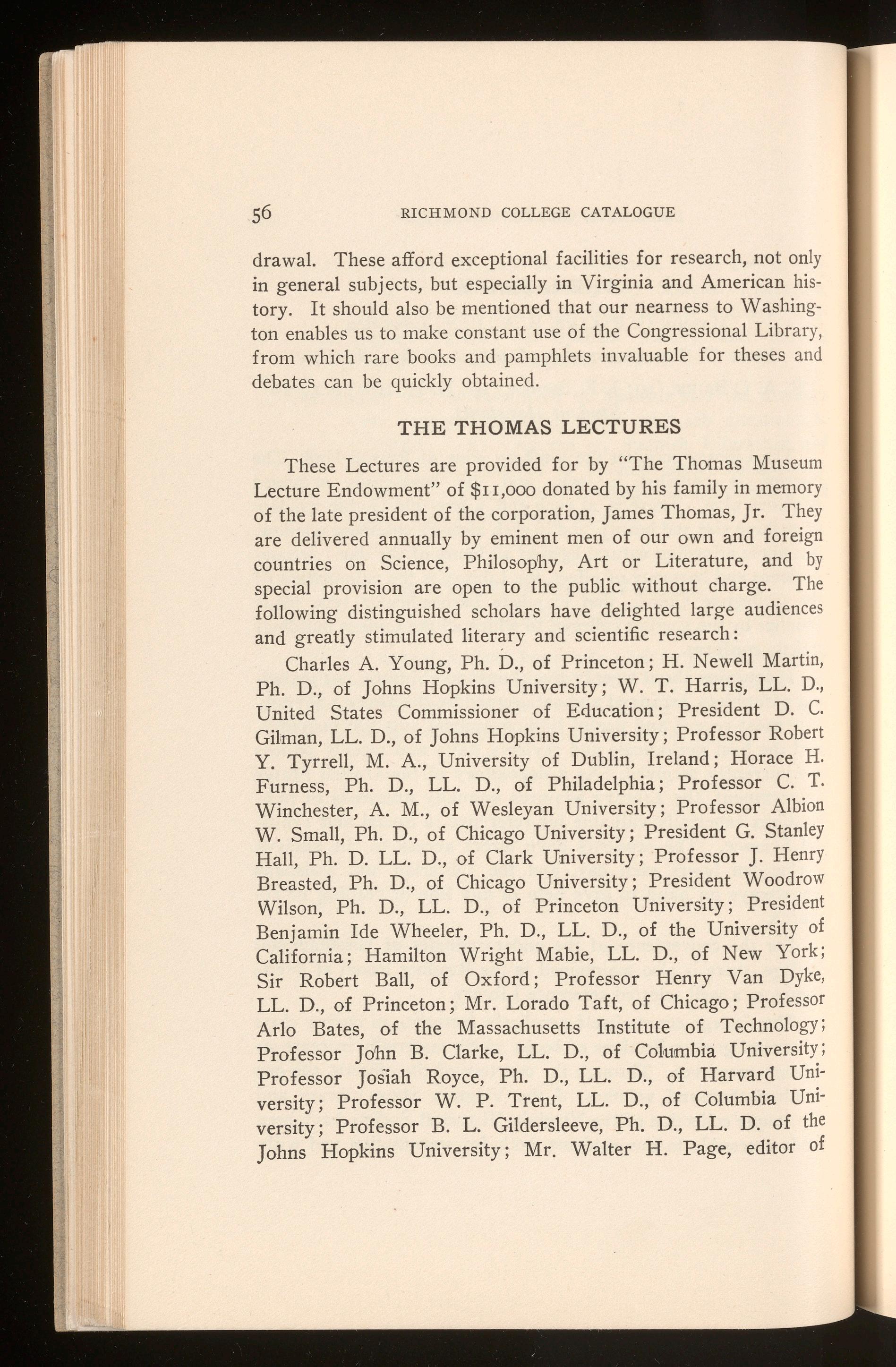
drawal. These afford exceptional facilities for research, not only in general subjects, but especially in Virginia and American history. It should also be mentioned that our nearness to Washin gton enables us to make constant use of the Congressional Libr ary, from which rare books and pamphlets invaluable for theses and debates can be quickly obtain ed.
These Lectures are provided for by "The Thomas Museu m Lecture Endowment " of $II,ooo donated by his family in mem ory of the late president of the corporation, James Thomas, Jr. Th ey are delivered annually by eminent men of our own and forei gn countries on Science, Philosophy, Art or Literature, and by special provision are open to the public without charge. T he following distinguished scholars have delighted large audien ces and greatly stimulated liter~ry and scientific resP.arch:
Charles A. Young, Ph. D., of Princeton; H. Newell Mart in, Ph. D., of Johns Hopkins University; W. T. Harris, LL. D., United States Commissioner of Education; President D . C. Gilman, LL. D., of Johns Hopkins University; Professor Rob ert Y. Tyrrell, M. A , University of Dublin, Ireland; Horace H. Furness, Ph. D., LL. D , of Philadelphia; Professor C. T. Winchester, A. M., of Wesleyan University; Professor Alb ion W. Small, Ph. D., of Chicago University; President G. Stanl ey Hall, Ph. D. LL D. , of Clark University; Professor J. He nry Breasted, Ph. D., of Chicago University; President Woodr ow Wilson, Ph. D., LL. D., of Princeton University; Presid ent Benjamin Ide Wheeler, Ph. D., LL. D., of the University of California; Hamilton Wright Mabie, LL. D., of New Yo rk; Sir Robert Ball, of Oxford; Professor Henry Van Dyke, LL. D ., of Princeton; Mr . Lorado Taft, of Chicago; Profe ssor Arlo Bates, of the Massachusetts Institute of Technolo gy; Professor John B. Clarke, LL. D., of Columbia Universi ty; Professor Josiah Royce, Ph. D., LL. D., of Harvard U niversity; Professor W. P. Trent, LL. D., of Columbia U niversity; Professor B. L. Gildersleeve, Ph. D., LL. D. of t he Johns Hopkins University; Mr. Walter H. Page, editor of
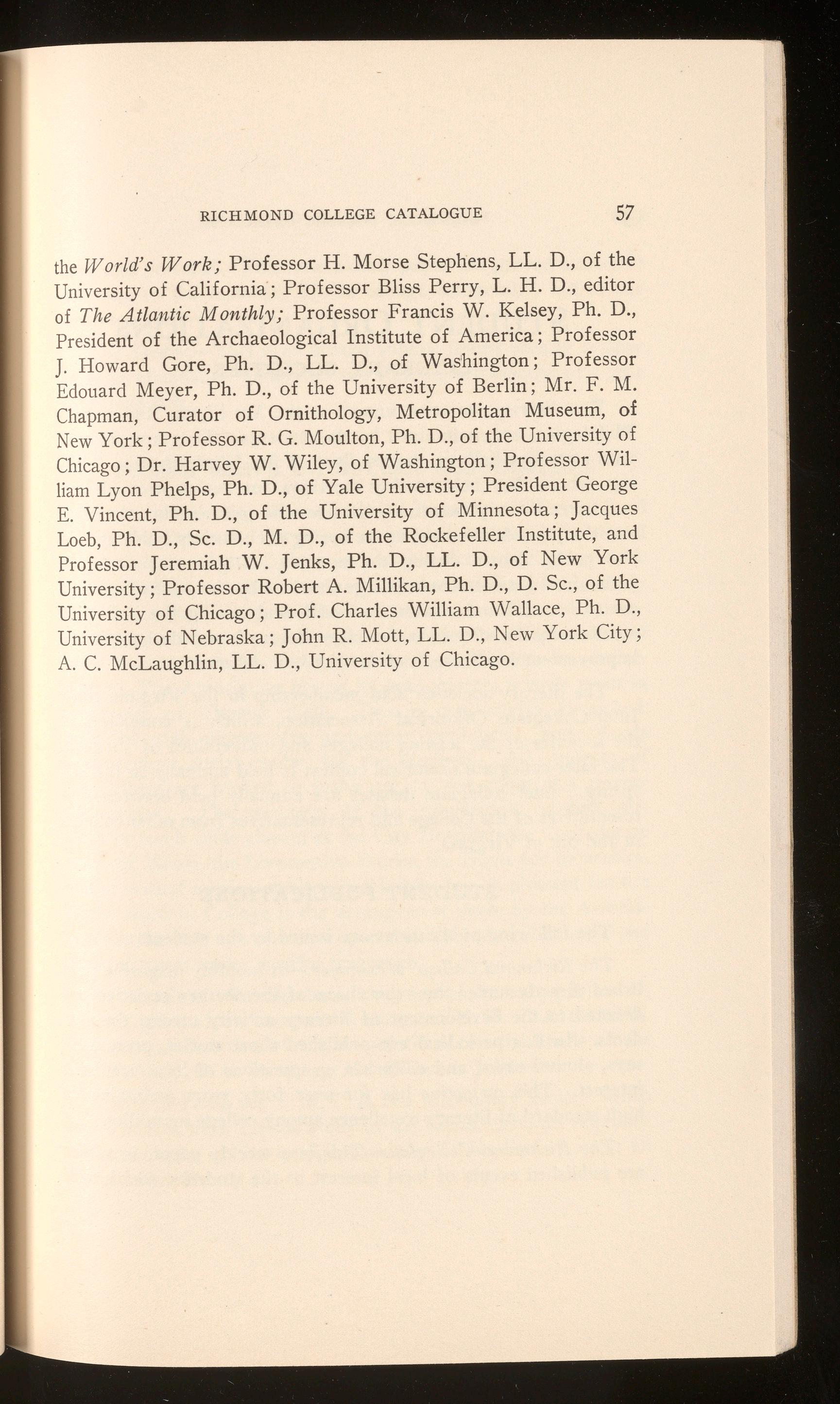
the Wo rld's Work; Professor H. Morse Stephens, LL. D., of the Univer sity of California; Professor Bliss Perry, L. H. D., editor of The Atlantic Monthly; Professor Francis W. Kelsey, Ph.D., President of the Archaeological Institute of America; Professor J. How ard Gore, Ph. D., LL. D., of Washington; Professor Edouard Meyer, Ph. D., of the University of Berlin; Mr. F. M. Chapman, Curator of Ornithology, Metropolitan Museum, of New York ; Professor R. G. Moulton, Ph. D , of the University of Chicago; Dr. Harvey W Wiley, of Washington; Professor William Ly on Phelps, Ph. D., of Yale University; President George E. Vi ncent, Ph. D., of the University of Minnesota; Jacques Loeb, Ph . D., Sc. D., M. D., of the Rockefeller Institute, and Professor Jeremiah W. Jenks, Ph . D ., LL. D., of New York Univer sity ; Professor Robert A. Millikan, Ph D., D. Sc , of the Univers ity of Chicago; Prof. Ch a rles William Wallace, Ph. D., Univer sity of Nebraska; John R. Mott, LL. D ., N ew York City ; A. C. McLaughlin, LL. D , University of Chicago

Two literary societies, known as the Mu Sigma Rho and the Philologian, are maintained by the students. They are provided with attractive halls on the top floor of the Administration Building, where they hold weekly meetings for declamation, debate, and other literary exercises. Besides the joint oratorical contest and the joint debate held in the spring each society holds at least one public debate during the session. A generous rivalry is maintained between the two organizations by the joint offer of an orator's medal and a writer's medal, and among the individual members by the offer in each society of a medal for declamation or improvement in debate, and for the best debater.
The literary societies hold membership in the Virginia State Inter-Collegiate Oratorical Association, which .s composed of the societies of the leading colleges and universities of Virginia. The inter-collegiate oratorical contest is held annually in the late spring. Inter-collegiate debates are annually held between representatives of the College and representatives from other colleges in and out of Virginia.
The following publications are issued by the students:
The Richmond College M essenger.-A monthly magazine published directly under the supervision of the literary societies and devoted to the development of literary activity among the students. In this periodical are published short stories, poems, essays, alumni news, and editorials on questions of local academic interest. This magazine has for over forty years maintained a high standard of literary excellence among college monthlies.
The Richmond Collegian.-This is a weekly paper, in which are published events of local interest to the students, social, ath-
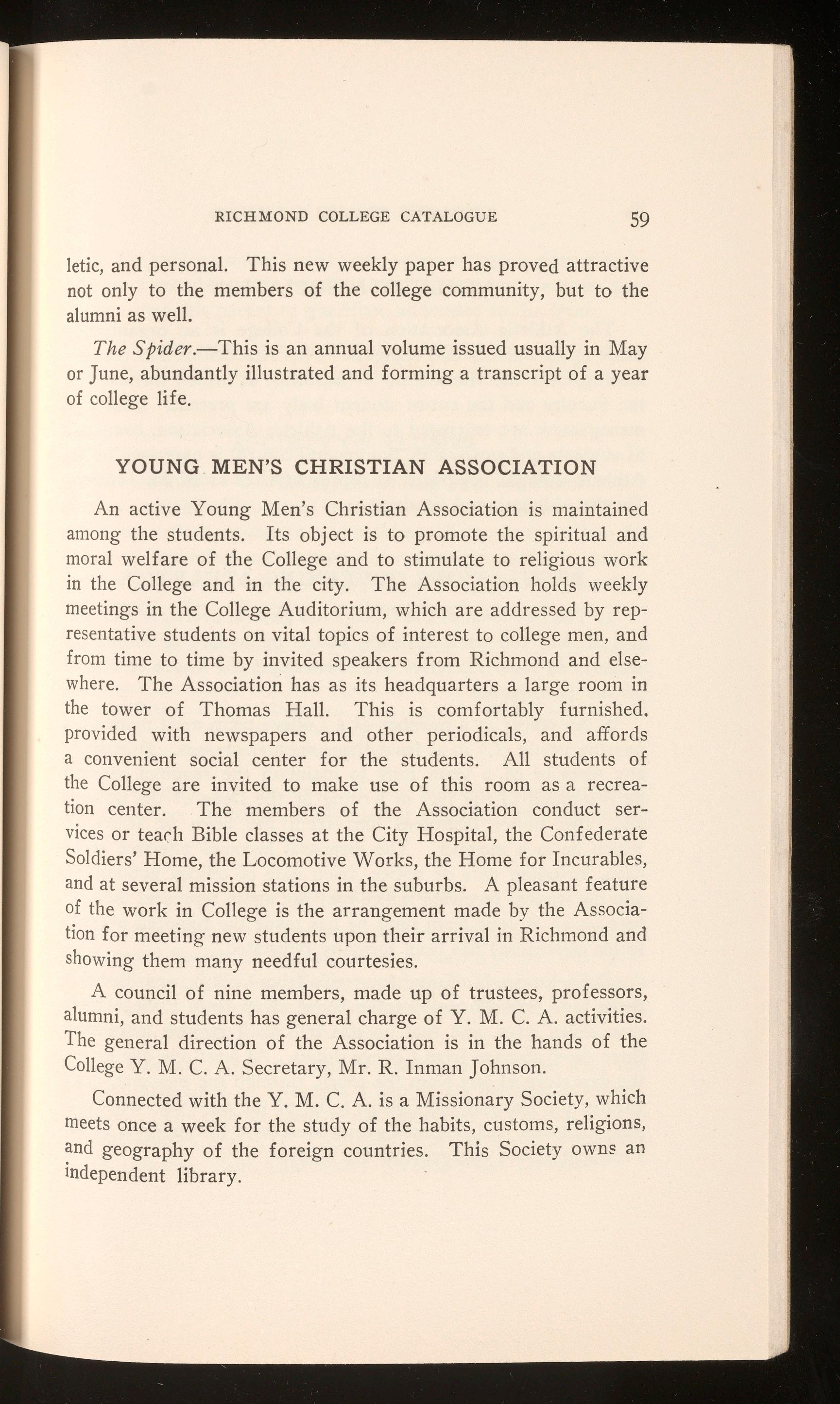
letic, and personal. This new weekly paper has proved attractive not only to the members of the college community, but to the alumni as well.
The Spider.-This is an annual volume issued usually in May or June, abundantly illustrated and forming a transcript of a year of college life.
An active Young Men's Christian Association is maintained among the students. Its object is to promote the spiritual and moral welfare of the College and to stimulate to religious work in the College and in the city. The Association holds weekly meetings in the College Auditorium, which are addressed by representative students on vital topics of interest to college men, and from time to time by invited speakers from Richmond and elsewhere. The Association has as its headquarters a large room in the tower of Thomas Hall. This is comfortably furnished. provided with newspapers and other periodicals, and affords a convenient social center for the students. All students of the College are invited to make use of this room as a recreation center. The members of the Association conduct services or teac:-hBible classes at the City Hospital, the Confederate Soldiers' Home, the Locomotive Works, the Home for Incurables, and at several mission stations in the suburbs. A pleasant feature of the work in College is the arrangement made by the Association for meeting new students upon their arrival in Richmond and showing them many needful courtesies.
A council of nine members, made up of trustees, professors, alumni, and students has general charge of Y. M. C. A. activities. The general direction of the Association is in the hands of the College Y. M. C. A. Secretary, Mr. R. Inman Johnson.
Connected with the Y. M. C. A. is a Missionary Society, which meets once a week for the study of the habits, customs, religions, and geography of the foreign countries. This Society owm an independent library.
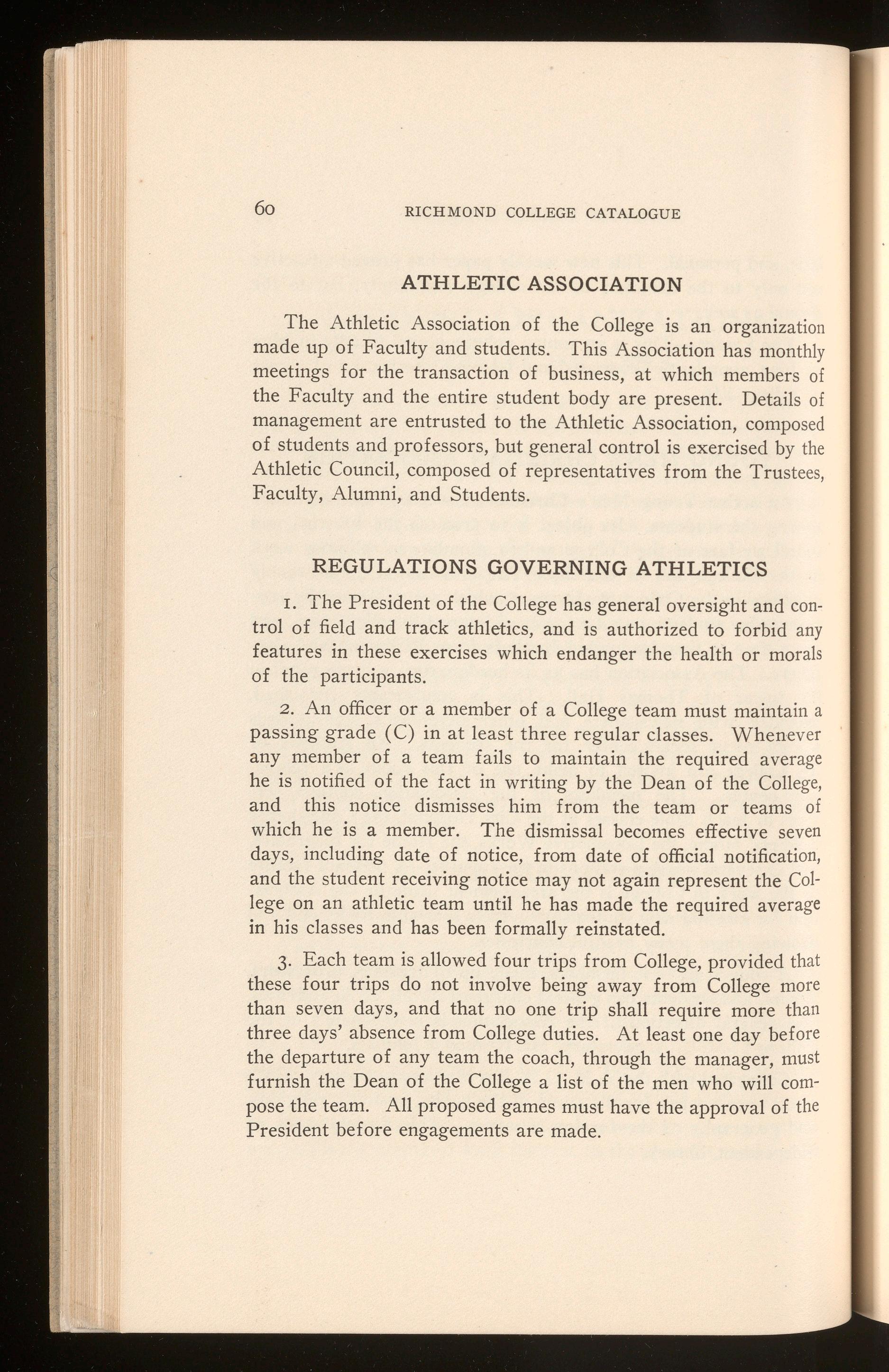
The Athletic Association of the College is an organization made up of Faculty and students. This Association has monthly meetings for the transaction of business, at which members of the Faculty and the entire student body are present. Details of management are entrusted to the Athletic Association, composed of students and professors, but general control is exercised by the Athletic Council, composed of representatives from the Trustees, Faculty, Alumni, and Students.
I. The President of the College has general oversight and control of field and track athletics, and is authorized to forbid any features in these exercises which endanger the health or morals of the participants.
2. An officer or a member of a College team must maintain a passing grade (C) in at least three regular classes. Whenever any member of a team fails to maintain the required average he is notified of the fact in writing by the Dean of the College, and this notice dismisses him from the team or teams of which he is a member. The dismissal becomes effective seven days, including date of notice, from date of official notification, and the student receiving notice may not again represent the College on an athletic team until he has made the required average in his classes and has been formally reinstated.
3. Each team is allowed four trips from College, provided that these four trips do not involve being away from College more than seven days, and that no one trip shall require more than three days' absence from College duties. At least one day before the departure of any team the coach, through the manager, must furnish the Dean of the College a list of the men who will compose the team. All proposed games must have the approval of the President before engagements are made.
4. No student under twenty-one years of age is permitted to become a member of a regular team, except upon written permission from his parent or guardian, addressed to the Dean.
5. A thletic teams are permitted to engage in contests away from Richmond only with teams from other institutions of learning.
T he Alumni of the College have long been organized into a Society , which holds annual meetings to renew old associations, maintain a close connection with Alma Mater, and further the cause of education and letters. For several years the custom has been to liave an annual banquet on Tuesday of commencement week. The officers of the Society are:
JuDGED C. RrcH ARDSON,LL. B. ('74) Richmond , Va .. Presi d ent
H. R. P OLLARD , JR. ('89) , Richmond , Va ......
First Vi ce-P r es iden t
DR. CuRTIS LEE LAWS ('87) , New York City S econ d Vi ce-Pr esid ent
THOMASGRESHAM ('92) , Richmond , Va .............
H. B. H ANDY, B A. ('o6) , Richmond, Va.
W. L. PRINCE , B. A. ('98), Richmond, Va.
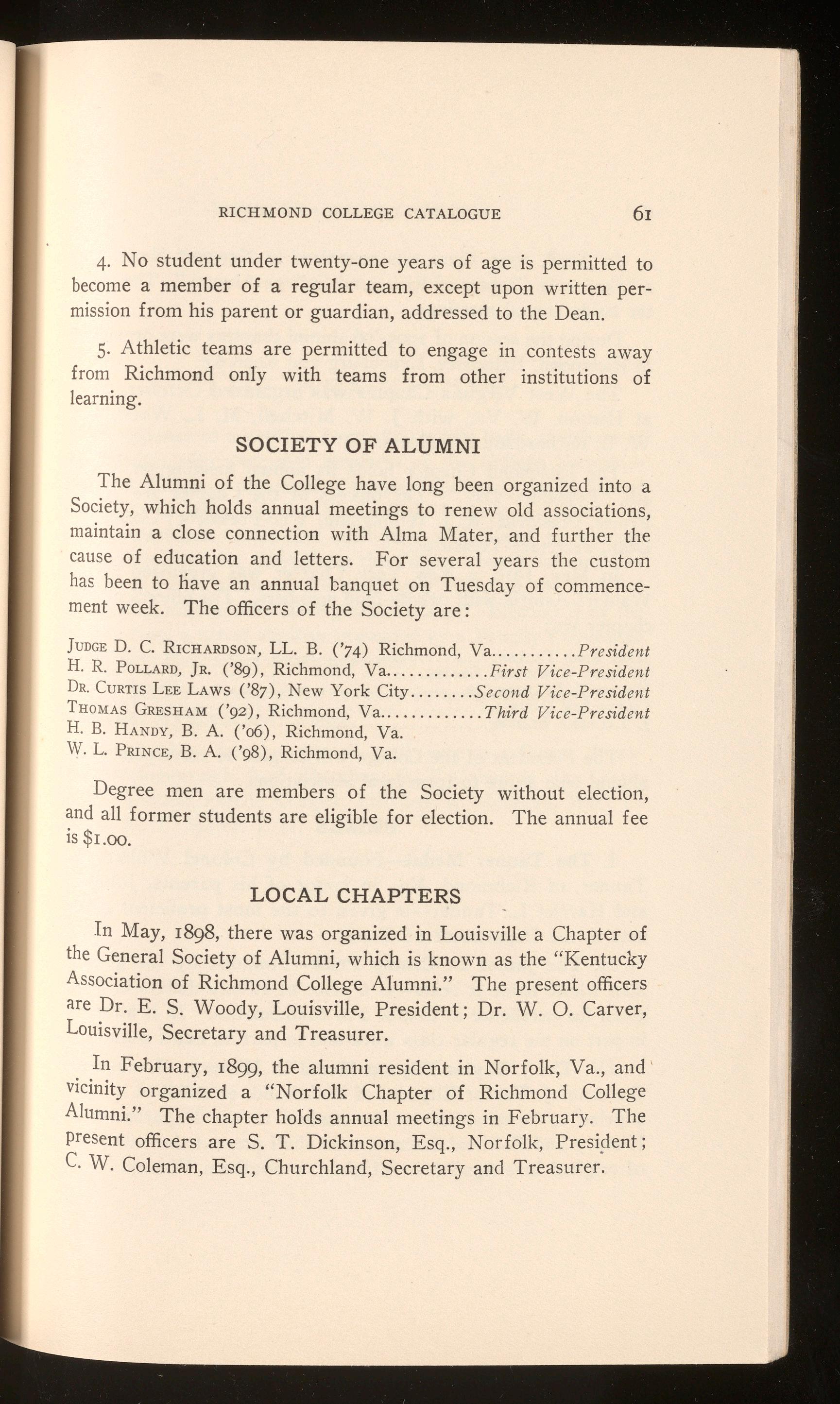
Third Vice -Pre sid ent
Degree men are members of the Society without election, and all former students are eligible for election. The annual fee is $1. 00.
In May, 1898, there was organized in Louisville a Chapter of the General Society of Alumni, which is known as the "Kentucky Association of Richmond College Alumni." The present officers are Dr. E. S. Woody, Louisville, President; Dr. W. 0. Carver, Louisville, Secretary and Treasurer.
In February, 1899, the alumni resident in Norfolk, V a ., and ' vicinity organized a "Norfolk Chapter of Richmond College Alumni." The chapter holds annual meetings in February. The present officers are S. T. Dickinson, Esq., Norfolk, Pre si~ent; C. W. Coleman, Esq., Churchland, Secretary and Treasurer.
In April, 1903, there was organized in Newport News, Va., a "Peninsula Chapter of Richmond College Alumni." The chapter holds annual meetings
During the session of 1905- ' 06 alumni chapters were organi zed in Richmond, Baltimore, Lynchburg and Roanoke .
The West Virginia Chapter was organized October , 1910, at Hinton, W. Va., with J. W. Mitchen, M. L. Wood, and W L. Richardson as officers.
The Richmond Chapter holds its annual meeting on Ma r ch 4th, "Founders' Day." The officers of the Chapter ar e W . L. Prince, President; R. J. Willingham , Vice-Pre s ident ; Cla ud e M. Dean, Secretary-Treasur er.
In May, 1916, a New York Chapter was organized at the Waldorf-Astoria with tw enty-nine members. The officers o f this chapter are :
JESSE READ TAYLOR .• ..••. ..•.. Pr es id ent
CHARLES MARSHALL GRAV E S.. • Vic e -Pr es i d ent
HENRY K. ELLYSON, JR ..•• Vi ce-Pr esi dent
CURTIS L EE LAWS
J. LAURENS ELMORE
Tr easitrer
S ecretary
The President of the College will be glad to correspond with alumni who desire to form local associations.
I. The Tanner Medal-Founded by Colonel William E. Tanner, of Richmond, Va ., in honor of his parents, John F . and Harriet L. Tanner-is given to the most proficient gr aduate in the Department of Greek.
II. The James D. Crump Prize-Founded by the gentl eman whose name it bears-is a prize of twenty dollars in gold, given for excellence in Course 2 in Mathematics. It is award ed in part on the regular class work and in part on extra work.
IV. The J. Taylor Ellyson Medal in History.-LieutenantGovernor J. Taylor E11yson, of Richmond, established in 19rz a prize to be awarded to the student in the Department of History and Political Science, who shal1 present the best pie ce of original investigation in Virginia or Southern History.
In re spon the Fa culty, Phi Bet a Ka College t o bt to the A racl grade o f 90 · long to the scholar ship, ; Faculty frorr of Phi Beta '.
The Soci hers fro m V,.
The elec1 beth Bro cker P. E. H a mil Ruffin, M. 1

COLLEGE CATALOGUE
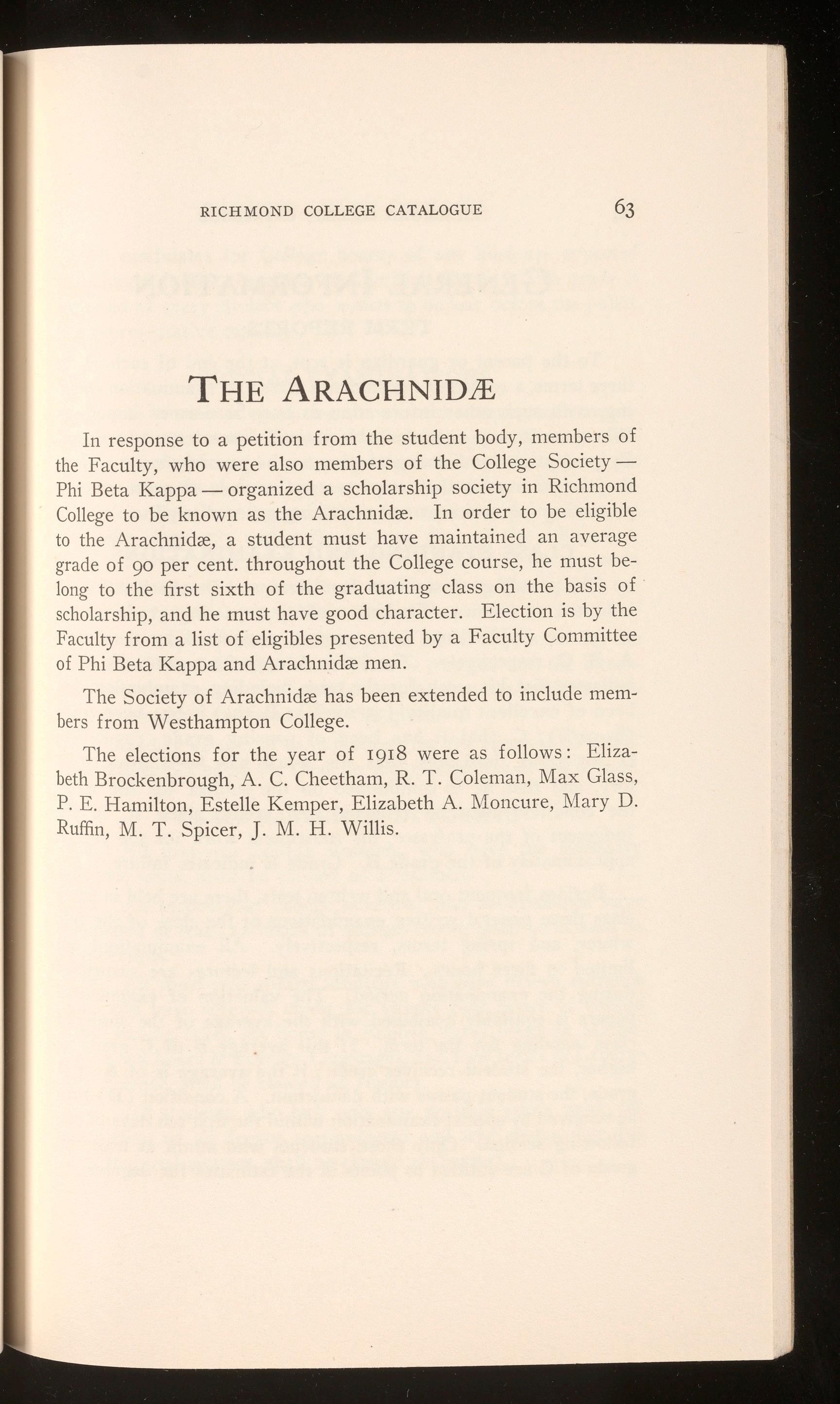
In response to a petition from the student body, members of the Faculty, who were also members of the College SocietyPhi Beta Kappa -organized a scholarship society in Richmond College to be known as the Arachnidre. In order to be eligible to the Arachnidre, a student must have maintained an average grade of 90 per cent. throughout the College course, he must belong to the first sixth of the graduating class on the basis of scholarship, and he must have good character. Election is by the Faculty from a list of eligibles presented by a Faculty Committee of Phi Beta Kappa and Arachnidre men.
The Society of Arachnidre has been extended to include members from Westhampton College.
The elections for the year of r9r8 were as follows: Elizabeth Brockenbro ugh, A. C. Cheetham, R. T. Coleman, Max Glass, P. E. Hamilton, Estelle Kemper, Elizabeth A. Moncure, Mary D. Ruffin, M. T. Spicer, J. M. H. Willis.
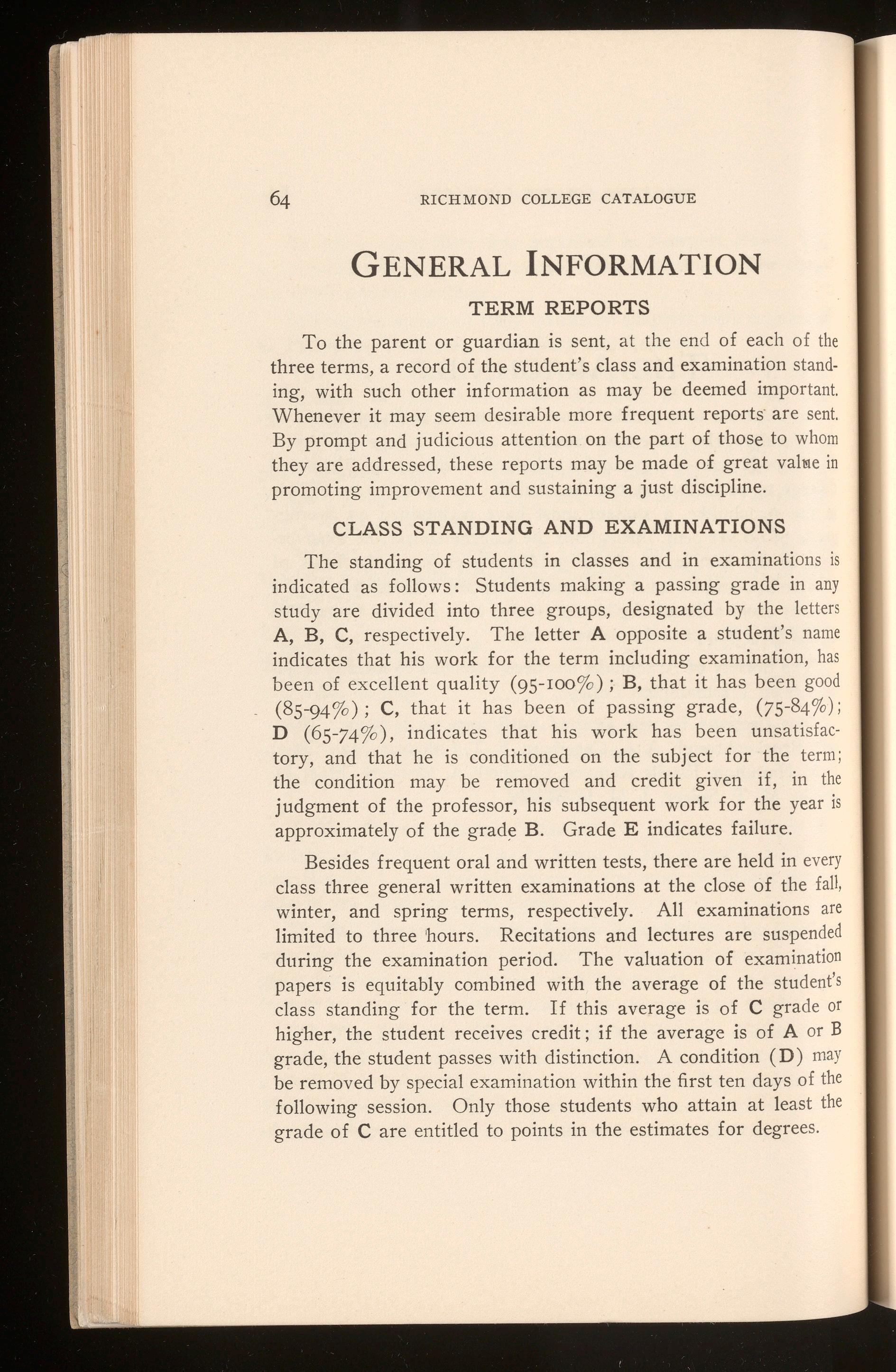
RICHMOND COLLEGE CATALOGUE
To the parent or guardian is sent, at the en d of each of the three terms, a record of the student's class and examination st anding, with such other information as may be deemed important. Whenever it may seem desirable more frequent reports · are sent. By prompt and judicious attention on the part of those to whom they are addressed, these reports may be made of great vah te in promoting improvement and sustaining a just discipline.
The standing of students in classes and in examinati ons is indicated as follows: Students making a passing grade in any study are divided into three groups , designated by the letters A, B, C, respectivel y . The letter A opposite a student's name indicates that his work for the term including examination, has b e en of ex cellent quality (95-100 % ); B, that it ha s b ee n good (85-94 % ) ; C, that it ha s b een of passing grade, (75-8 4 %) ; D (65-74 % ), indicates that his work ha s been un s ati sfactory, and that he is conditioned on the subject for the term; the condition m ay be removed and credit given if , in the judgment of the professor, his subsequent work for the year is approximately of the grade B. Grade E indicates failure
Besides frequent oral and written tests, there are held in every class three general written examinations at the close of the fall, winter, and spring terms, respectively. All examination s are limited to three 'hours. Recitations and lectures are suspen ded during the examination period. The valuation of examin ation papers is equitably combined with the average of the stud ent's class standing for the term. If this average is of C gra de or higher, the student receives credit; if the average is of A or B grade, the student passes with distinction. A condition ( D ) may be removed by special ex a min ation within the first ten days of the following session. Only those students who attain at least the grade of C are entitled to points in the estimates for degree s.
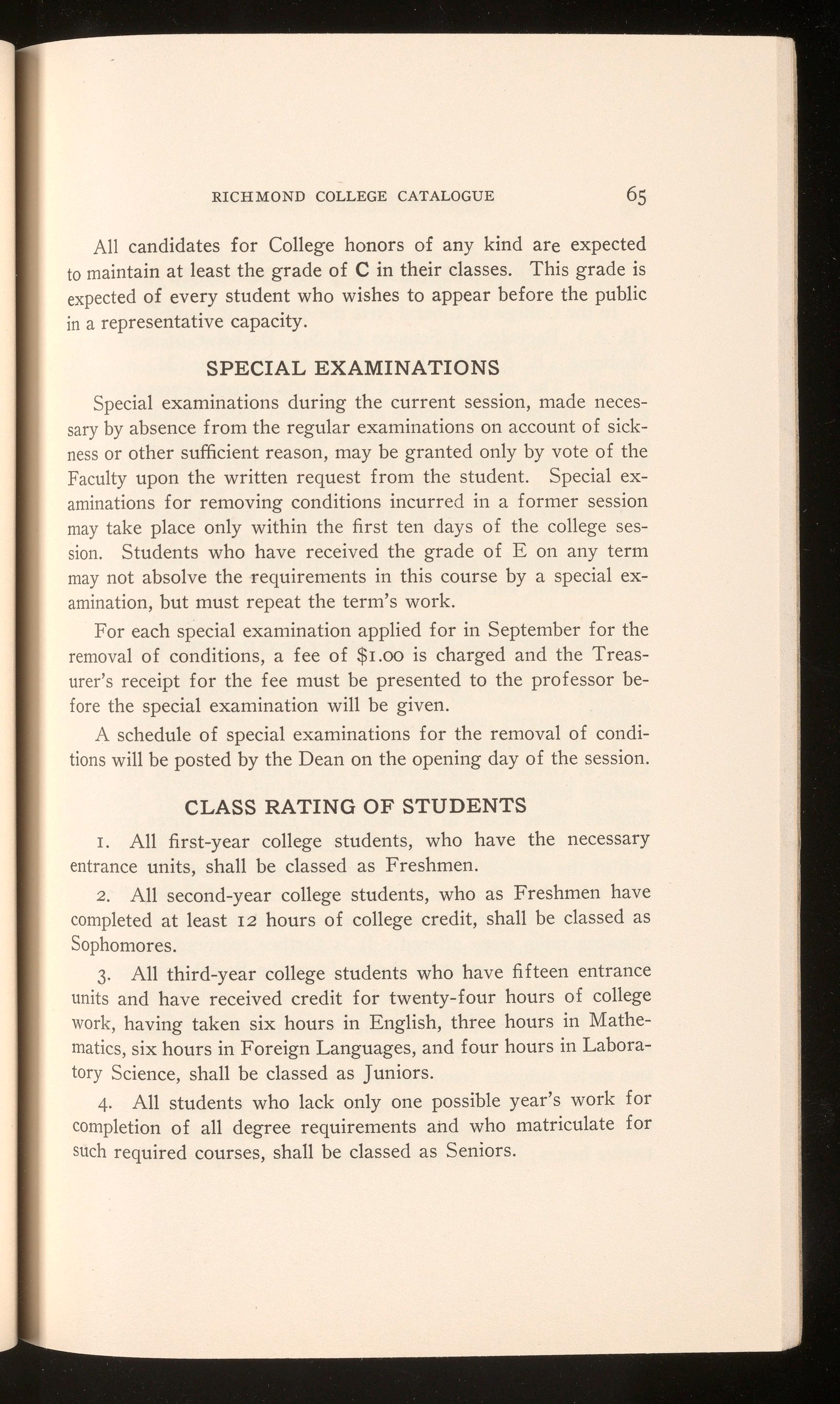
All candidates for College honors of any kind are expected to maintain at least the grade of C in their classes. This grade is expected of every student who wishes to appear before the public in a representative capacity.
Special examinations during the current session, made necessary by absence from the regular examinations on account of sickness or other sufficient reason, may be granted only by vote of the Faculty upon the written request from the student. Special examinations for removing conditions incurred in a former session may take place only within the first ten days of the college session. Students who have received the grade of E on any term may not absolve the requirements in this course by a special examination, but must repeat the term's work.
For each special examination applied for in September for the removal of conditions, a fee of $1.00 is charged and the Treasurer's receipt for the fee must be presented to the professor before the special examination will be given.
A schedule of special examinations for the removal of conditions will be posted by the Dean on the opening day of the session.
I. All first-year college students, who have the necessary entrance units, shall be classed as Freshmen.
2. All second-year college students, who as Freshmen have completed at least 12 hours of college credit, shall be classed as Sophomores.
3. All third-year college students who have fifteen entrance units and have received credit for twenty-four hours of college work, having taken six hours in English, three hours in Mathematics, six hours in Foreign Languages, and four hours in Laboratory Science, shall be classed as Juniors.
4. All students who lack only one possible year's work for completion of all degree requirements and who matriculate for such required courses, shall be classed as Seniors.
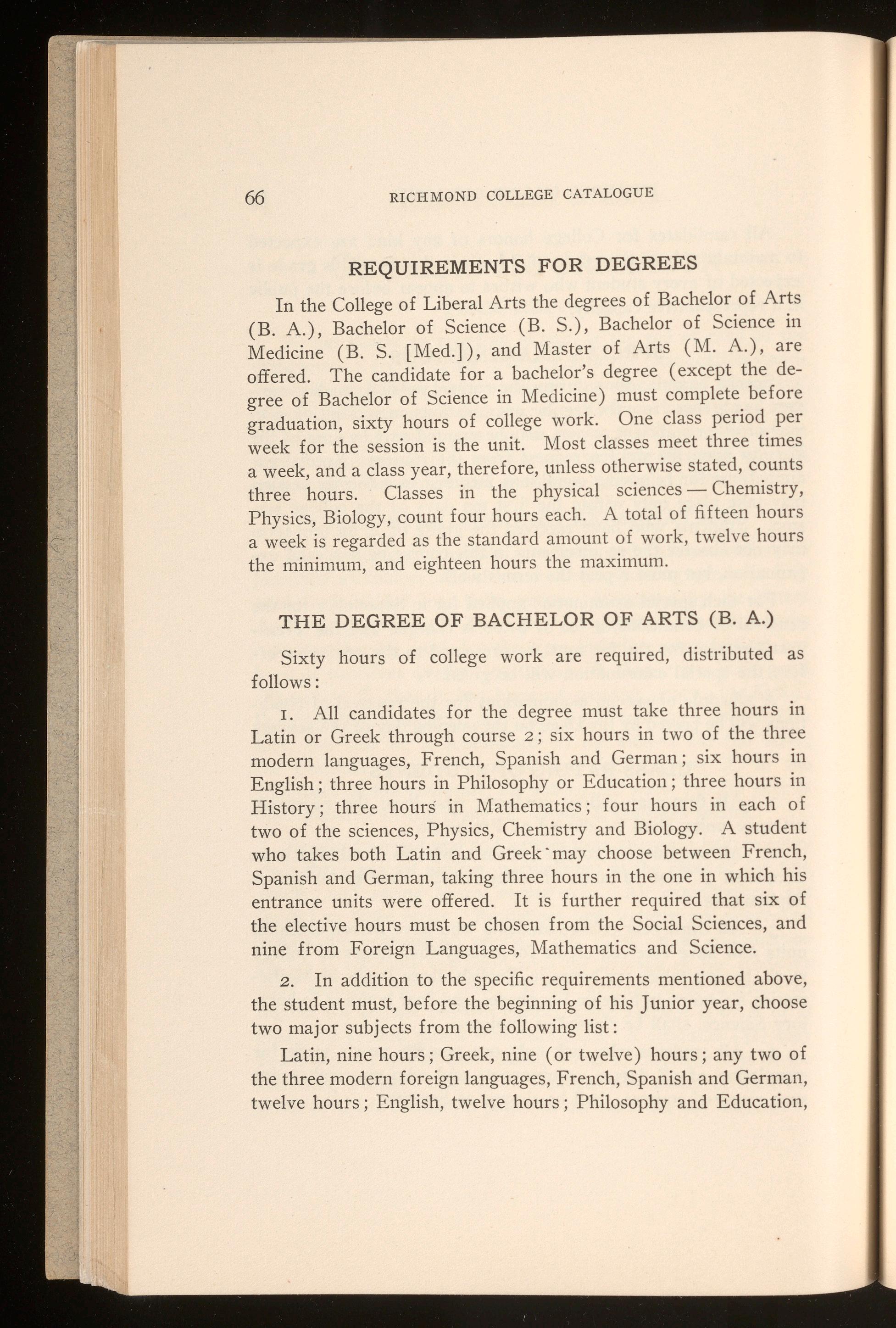
In the College of Liberal Arts the degrees of Bachelor of Arts (B. A.), Bachelor of Science (B. S.), Bachelor of Science in Medicine (B. S. [Med.]), and Master of Arts (M. A.), are offered. The candidate for a bachelor's degree ( except the degree of Bachelor of Science in Medicine) must complete before graduation, sixty hours of college work. One class period per week for the session is the unit. Most classes meet three times a week, and a class year, therefore, unless otherwise stated, counts three hours. Classes in the physical sciences -Chemistry, Physics, Biology, count four hours each A total of fifteen hours a week is regarded as the standard amount of work, twel v e hours the minimum, and eighteen hours the maximum.
Sixty hours of college work are required, distributed as follows:
I. All candidates for the degree must take three hours in Latin or Greek through course 2; six hours in two of the three modern languages, French, Spanish and Germ a n; six hours in English; three hours in Philosophy or Education; three hours in History; three hours in Mathematics; four hours in each of two of the sciences, Physics, Chemistry and Biology. A student who takes both Latin and Greek ·may choose between French, Spanish and German, taking three hours in the one in which his entrance units were offered. It is further required that six of the elective hours must be chosen from the Social Sciences, and nine from Foreign Languages, Mathematics and Science.
2. In addition to the specific requirements mentioned above, the student must, before the beginning of his Junior year, choose two major subjects from the following list:
Latin, nine hours ; Greek, nine ( or twelve) hours ; any two of the three modern foreign languages, French, Spanish and German, twelve hours ; English, twelve hours ; Philosophy and Education,
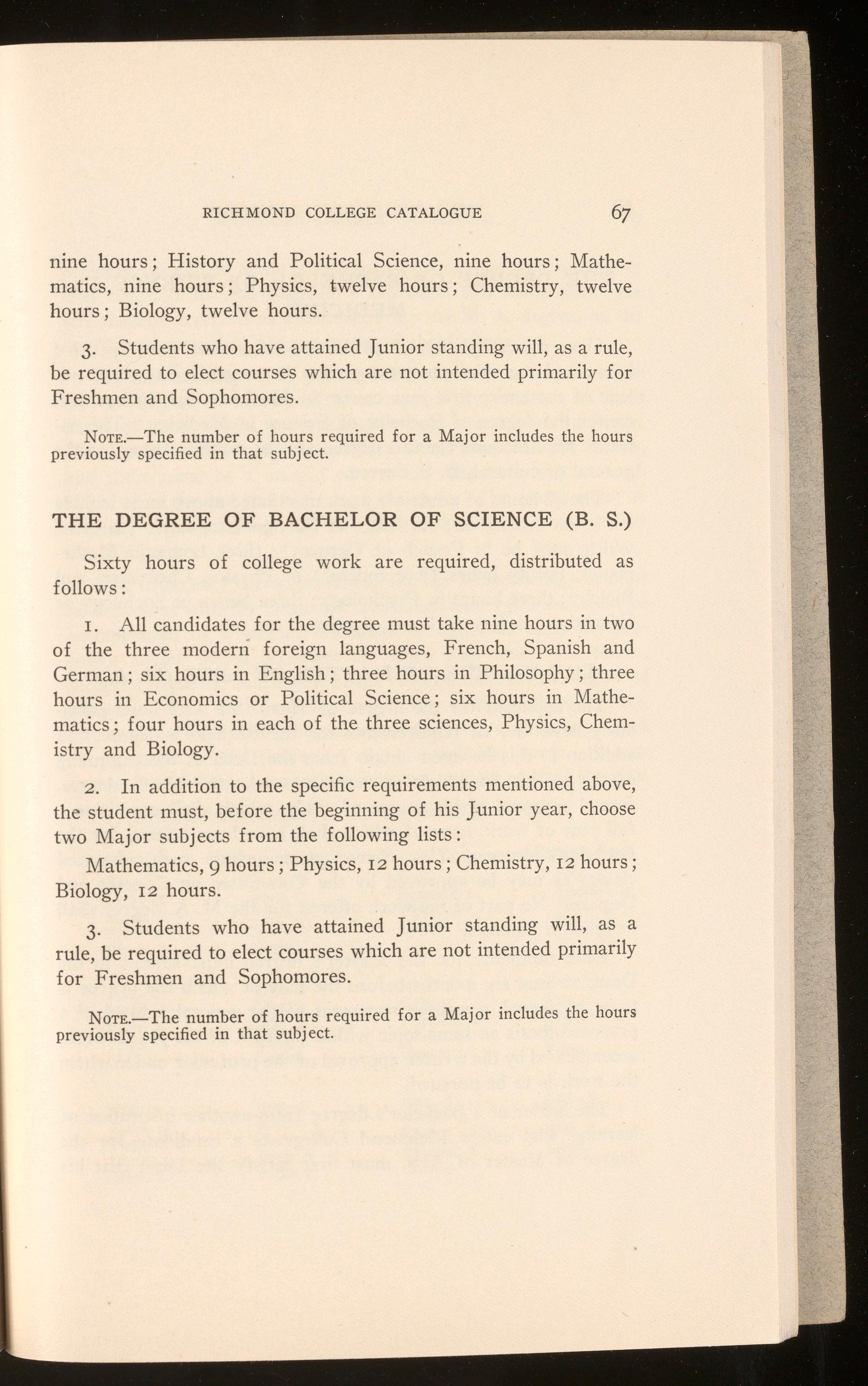
nine hours; History and Political Science, nine hours; Mathematics, nine hours; Physics, twelve hours; Chemistry, twelve hours; Biology, twelve hours.
3. Students who have attained Junior standing will, as a rule, be required to elect courses which are not intended primarily for Freshmen and Sophomores .
NoTE.-The number of hours required for a Major includes the hours previously specified in that subject.
Sixty hours of college work are required, distributed as follows:
I. All candidates for the degree must take nine hours in two of the three modern foreign languages, French, Spanish and German; six hours in English ; three hours in Philosophy ; three hours in Economics or Political Science ; six hours in Mathematics; four hours in each of the three sciences, Physics, Chemistry and Biology.
2. In addition to the specific requirements mentioned above, the student must, before the beginning of his Junior year, choose two Major subjects from the following lists: Mathematics, 9 hours; Physics, 12 hours; Chemistry, 12 hours; Biology, 12 hours.
3. Students who have attained Junior standing will, as a rule, be required to elect courses which are not intended primarily for Freshmen and Sophomores.
NoTE.-The number of hours required for a Major includes the hours previously specified in that subject.
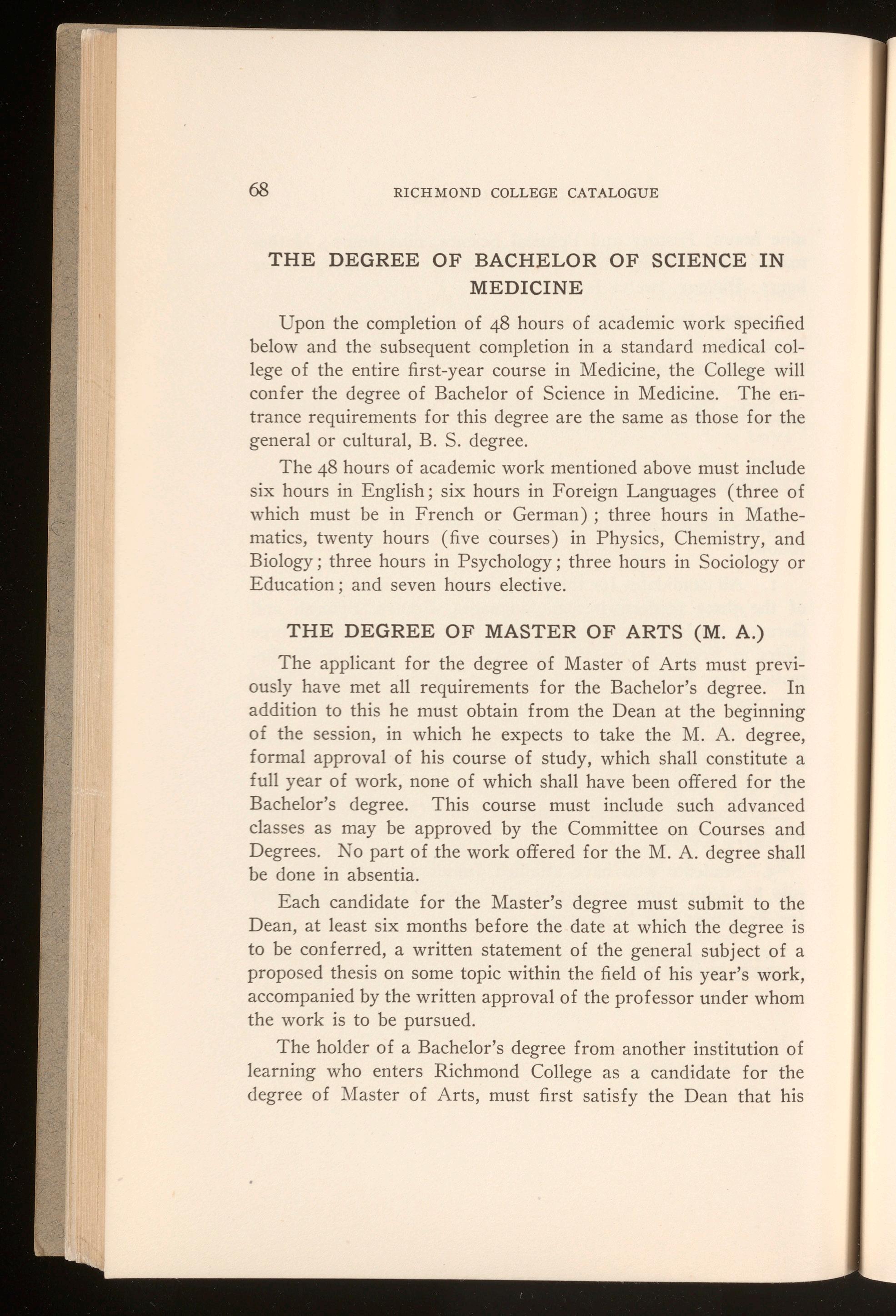
Upon the completion of 48 hours of academic work specified below and the subsequent completion in a standard medical college of the entire first-year course in Medicine, the College will confer the degree of Bachelor of Science in Medicine. The entrance requirements for this degree are the same as those for the general or cultural, B. S. degree.
The 48 hours of academic work mentioned above must include six hours in English; six hours in Foreign Languages ( three of which must be in French or German); three hours in Mathematics, twenty hours ( five courses) in Physics, Chemistry, and Biology; three hours in Psychology; three hours in Sociology or Education; and seven hours elective.
The applicant for the degree of Master of Arts must previously have met all requirements for the Bachelor's degree. In addition to this he must obtain from the Dean at the beginning of the session, in which he expects to take the M. A. degree, formal approval of his course of study, which shall constitute a full year of work, none of which shall have been offered for the Bachelor's degree. This course must include such advanced classes as may be approved by the Committee on Courses and Degrees No part of the work offered for the M. A. degree shall be done in absentia.
Each candidate for the Master's degree must submit to the Dean, at least six months before the date at which the degree is to be conferred, a written statement of the general subject of a proposed thesis on some topic within the field of his year's work, accompanied by the written approval of the professor under whom the work is to be pursued.
The holder of a Bachelor's degree from another institution of learning who enters Richmond College as a candidate for the degree of Master of Arts, must first satisfy the Dean that his
previous scholastic work is equivalent in amount and quality to that required for the Bachelor's degree in this institution. He will then be accepted as a candidate for the M. A. degree, on the conditions prescribed for graduates of this College.
All theses, accepted in partial fulfillment of the requirements for the degree of Master of Arts, must be typewritten on linen paper of good weight and quality, on only one side of the paper. The sheets must be of the standard letter size, 11 x 8¼ inches, and there must be a margin of not less than one inch on each side and at the top and bottom of the page. The sheets must be securely riveted in a manila cover, the cover being imprinted as the title page.
The completed thesis, presented for the Master's degree, must be deposited with the Dean not later than May 15th, and must be accompanied by a written statement of approval from the professor under whose direction the work was done. All theses, accepted in partial fulfillment of the requirements for the degree of Master of Arts, shall become the property of the College Library, and shall be kept there for reference uses. A carbon copy shall be presented to the professor who directed the work. A suggested form of title page may be seen on request of the Librarian.
Typical Courses leading to the degree of Bachelor of Arts.
FIRST YEAR SECONDYEAR THIRD YEAR FOURTHYEAR
Eng. I Eng. 2
Eng. 3
Eng. 5 Latin I Frch 3 Spanish I Spanish 2
Math. I Hist. 1 Phys. 2 Phys. 3
Frch. 2 Bible 2
Chem. I Psycho!. I Phys. I Social. Pol. Sci.
Eng. 1

Hist. 1
Hist. 2
Pol. Sci.
Math. I Eng. 2 Grk. 3 Grk. 4
Frch. 2 Grk. 2
Phys. I Bible 2
Psycho!. I Eng. 3
Chem. I Eco. Grk. I Social. Ger. 1 Educ.
Eng. 1 Eng. 2
Eng. 3
Eng. 5
Math. I Math. 2 Math. 3 Pol. Sci. 1
Phys. 1 Chem. I Frch 3 Biol. 1
Latin I Frch 2
Spanish I Educ.
Hist. 1 Bible 2 Socio!.
Typical Courses leading to the degree of Bachelor of Science.
FIRST YEAR SECONDYEAR
Phys. I Math. 2
Math. I Chem. 2
Eng. I Eng. 2 Frch. 2 Spanish I Eco. Psych.
Chem. 1 Chem. 2
Phys. I Biol. 1
Math. I Math. 2
Eng. 1 Frch. 2
Typical Course preparatory to
FIRST YEAR
Chem. I Phys. 1 Frch. 2 Eng .. I

THIRD YEAR FOURTHYEAR
Phys. 2 Phys. 3
Math. 3 Chem. 2
Biol. I Eng. 3
Spanish 2 Socio!.
Chem. 3 Biol. 3
Biol. 2 Phys. 2
Spanish 1 Eng. 3
Eng. 2 Pol. Sci. Eco. Psych.
Medicine.
SECONDYEAR
Chem. 2 Biol. 1 Eng. 2 Psych. Eco.
Typical Course preparatory to Engineering.
FIRST YEAR
Eng. I Math. I Phys. 1 Frch. 2 Social.
SECONDYEAR
Math. 2 Phys. 2
Chem. I Span. I Eco.

The regular laboratory hours for Physics, Chemistry, Biology, and Psychology are as follows:
Physics I (a)-Tues. and Thurs., 9 to II and 2 to 4.
Chemistry I (a)-Tues. and Thurs., 9 to II and 2 to 4.
Biology I (a)-Tues. and Thurs., II :20 to 1 :10 and 2 to 4.
Psychology I (a)-Mon. 2 to 5.
It is expected that all laboratory work in these courses will be done in the assigned hours.
Laboratory hours for advanced courses in Biol., Chem., Phys. will be assigned at the opening of the session.
Examinations are held according to the block system, that is, all courses which meet at the same hour Monday, Wednesday and Friday, have their examinations at the same time, and similarly for courses meeting at other hours on these days, and on Tuesday, Thursday and Saturday. A detailed schedule for examinations on any term is posted by the Dean several weeks before the examinations begin.
The dates of term examinations may be found in the College Calendar, page 3.
Jeter Hall consists of a group of five non-communicating buildings under one roof. The five sections are designated by the letters A, B, C, D and E. Thomas Hall has four sections. The construction is of brick and stone with steel frame encased in concrete. The floors are reinforced concrete, overlaid with cypress. The partitions are hollow tile, and the stairways have steel frame with slate treads. The casements are of bronze. Toilets and baths are finished throughout in marble, with the best modern fixtures. The building is lighted with electricity and heated with hot water. Attention has everywhere been paid to safety, health, and comfort. The two dormitory groups cost about $200,000.
The prices named below include rent of room for nine months, light, heat, water, and servants' attendance, but do not include furniture. All rooms are provided with wardrobe closets built into the wall. It is understood that a single occupant of any room intended for two students shall be responsible for the full rent of the room. All men are urged to arrange for roommates, or to engage single rooms.
Rooms Intended for Two Students

$ 70.oo-A1, C-30.
$ 80.00-A-4, A-5, A-9, B-1, C-1, C-12a, C-28, D-5.
$ 85.00-A-8, B-5.
$ 90.00---A-14, A-15, C-4, C-16, C-37, C-38, D-10.
$100.oo-A-12a, B-4, C-10, C-22, C-34.
$110.00-A-2, A-3, B-2, B-3, B-6, B-7, B-8, C-8, C-11, C-17, C-20, C-33, C-35, D-3, D-8.
$115.00-A-6, A-7, C-s, C-6, C-9, C-18, C-21, C-23.
Rooms Intended for One Student
$45.00--D-4.
$50.00---C-2, C-3, C-12, C-25, D-9.
$55.00--A-11, C-14, C-15, C-24, C-26, C-27, C-31.
$60.00-C-19, C-32, C-36, C-39.
$65.00---A-10, A-12, A-16, A-17, C-7, C-29, D-1, D-2, D-6, D-7.
$ 70.00-E- I I.
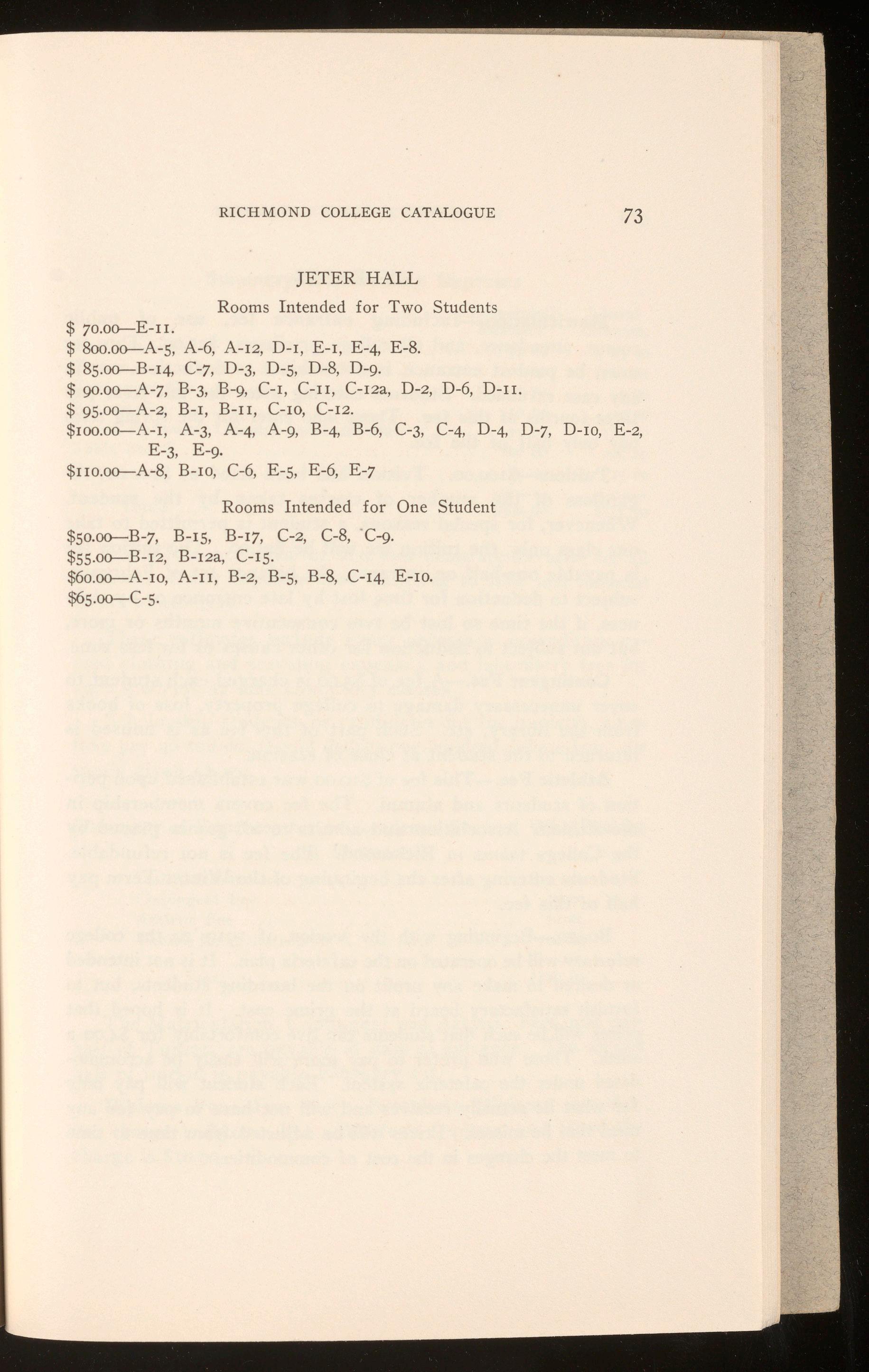
Rooms Intended for Two Students
$ Soo.00-A-5, A-6, A-12, D-1, E-1, E-4, E-8.
$ 85.00-B-14, C-7, D-3, D-5, D-8, D-9.
$ 90.00-A-7, B-3, B-9, C-1, C-11, C-12a, D-2, D-6, D-11.
$ 95.00-A-2, B-1, B-11, C-10, C-12.
$100.00-A-1, A-3, A-4, A-9, B-4, B-6, C-3, C-4, D-4, D-7, D-10, E-2, E-3, E-9.
$110.00-A-8, B-10, C-6, E-5, E-6, E-7
Rooms Intended for One Student
$50.00-B-7, B-15, B-17, C-2, C-8, C-9.
$55.00-B-12, B-12a, C-15.
$60.00-A-10, A-11, B-2, B-5, B-8, C-14, E-10.
$65.00-C-5.

RICHMOND COLLEGE CATALOGUE
Matriculation.-Including entrance fee, use of public rooms, attendance, and all college privileges, $25.00. This fee must be paid at entrance, is not subject to deduction, nor in any case refunded. Students entering after the fall term pay three-fourths of this fee. Those who enter for the spring term pay only half of the fee.
Tuition.-$100 .00. Tuition has been fixed at $100.00, regardless of the number of classes taken by the student. Whenever, for special reasons, a student is permitted to take one class only, the tuition fee will be $25.00. The tuition fee is payable one-half on entrance, the balance 1st of February, subject to deduction for lime lost by late entrance or by sickness, if the time so lost be two consecutive months or more, but not subject to deduction for other causes or for 1-esstime.
Contingent Fee.-A fee of $5.00 is charged each student to cover unnecessary damage to college property, loss of books from the library, etc. Such part of this fee as is unused is returned to the student at close of session.
Athletic Fee.-This fee of $10.00 was established upon petition of students and alu~ni. The fee covers membership in the Athletic Association and admits to all games played by the College teams in Richmond. The fee is not refundable. Students entering after the beginning of the Winter Term pay half of this fee.
BoARD.-Beginning with the session of 1919-'20 the college refectory will be operated on the cafeteria plan. It is not intended or desired to make any profit on the boarding students, but to furnish satisfactory board at the prime cost. It is hoped that prices will be such that students can live comfortably for $4.00 a week. Those who prefer to pay more will easily be accommodated under the cafeteria system. Each student will pay only for what he actually receives and will not have to pay for any meal that he misses. Prices will be adjusted from time to time to meet the changes in the cost of commodities.
Economical Estimate. Liberal Estimate.
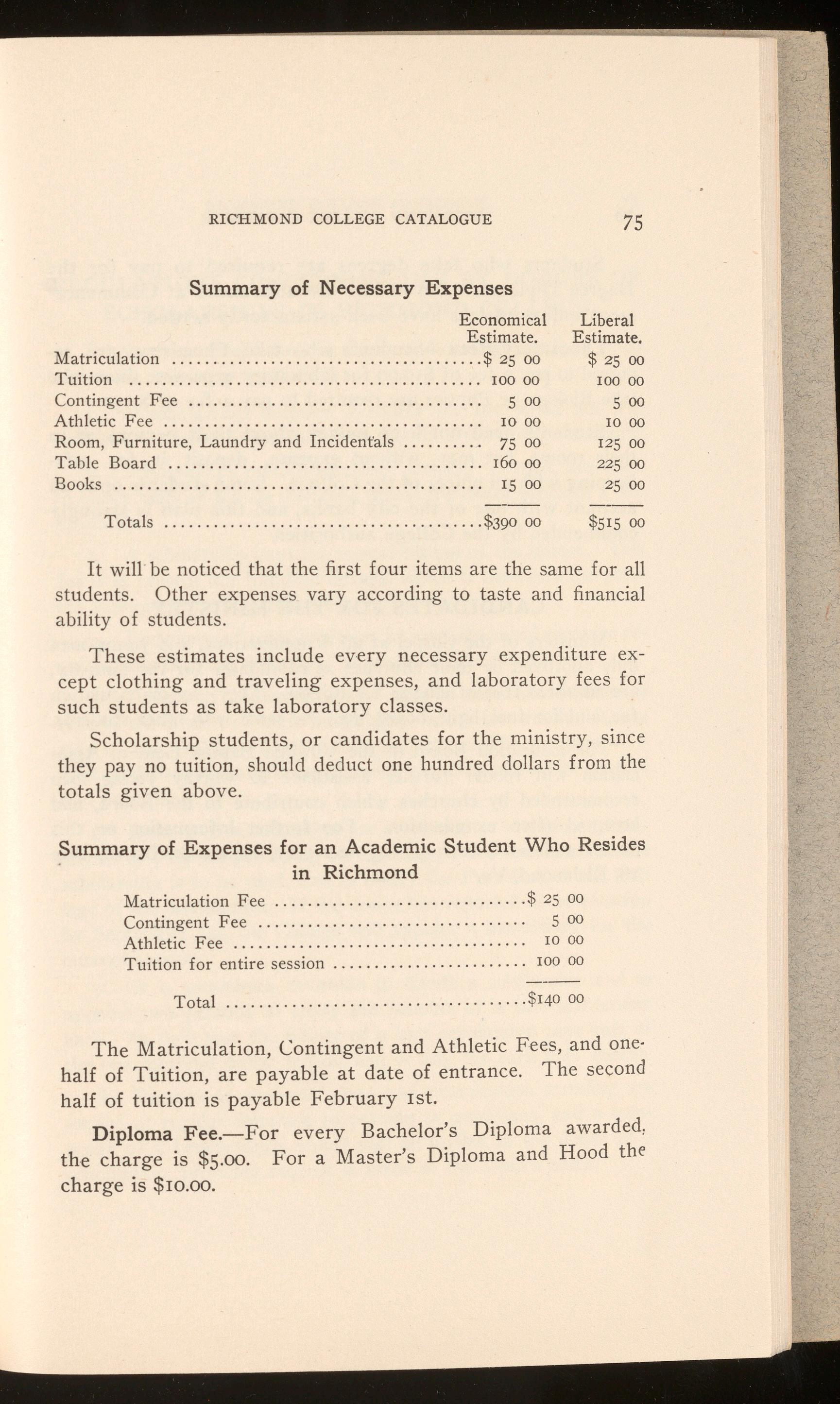
Room, Furniture, Laundry and Incident'als
It will be noticed that the first four items are the same for all students. Other expenses vary according to taste and financial ability of students.
These estimates include every necessary expenditure except clothing and traveling expenses, and laboratory fees for such students as take laboratory classes.
Scholarship students, or candidates for the ministry, since they pay no tuition, should deduct one hundred dollars from the totals given above.
The Matriculation, Contingent and Athletic Fees, and onehalf of Tuition, are payable at date of entrance. The second half of tuition is payable February 1st.
Diploma Fee.-For every Bachelor's Diploma awarded, the charge is $5.00. For a Master's Diploma and Hood the charge is $rn.oo.
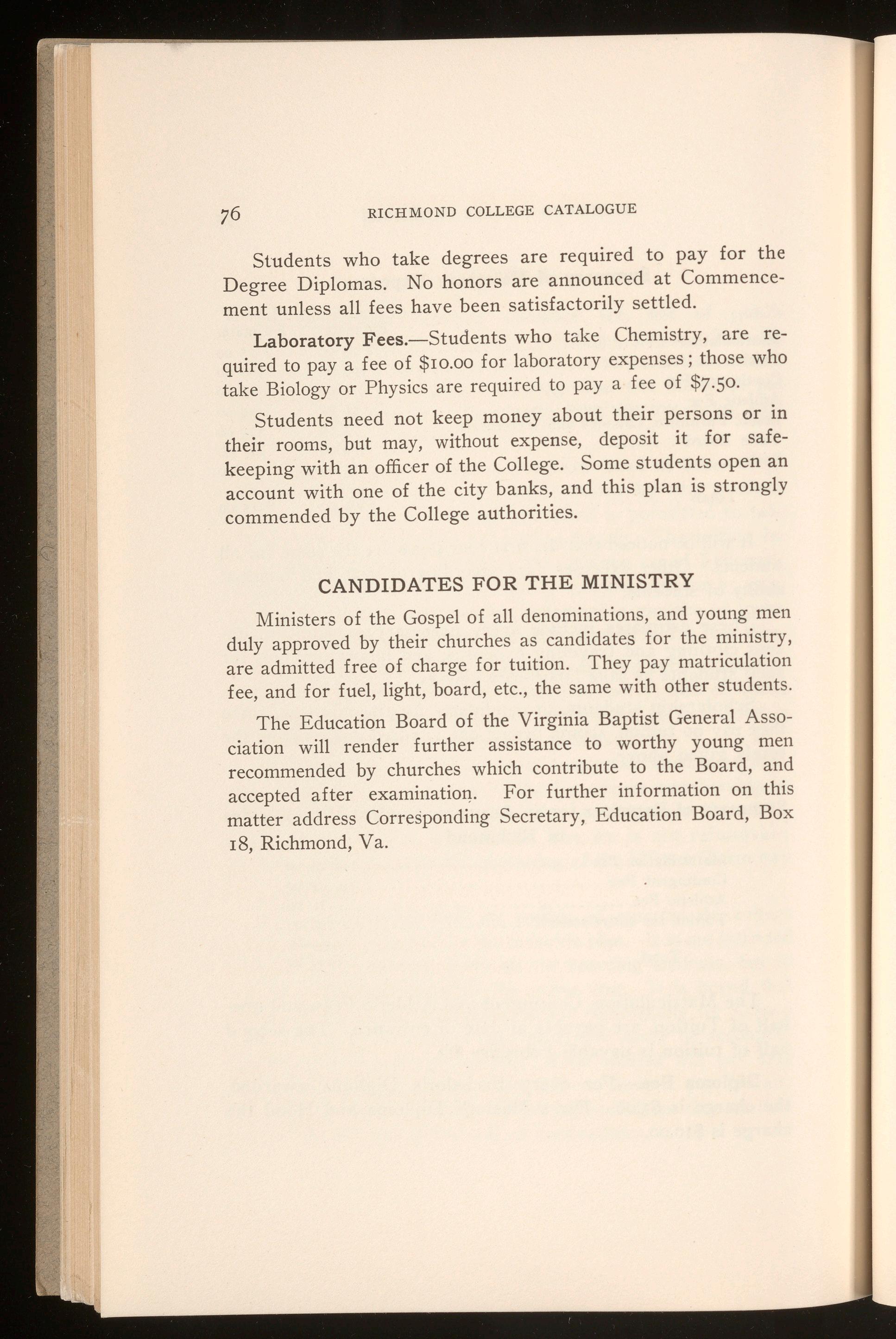
Students who take degrees are required to pay for the Degree Diplomas. No honors are announced at Commencement unless all fees have been satisfactorily settled.
Laboratory Fees.-Students who take Chemistry, are required to pay a fee of $10.00 for laboratory expenses; those who take Biology or Physics are required to pay a fee of $7.50.
Students need not keep money about their persons or in their rooms, but may, without expense, deposit it for safekeeping with an officer of the College. Some students open an account with one of the city banks, and this plan is strongly commended by the College authorities.
Ministers of the Gospel of all denominations, and young men duly approved by their churches as candidates for the ministry, are admitted free of charge for tuition. They pay matriculation fee, and for fuel, light, board, etc., the same with other students.
The Education Board of the Virginia Baptist General Association will render further assistance to worthy young men recommended by churches which contribute to the Board, and accepted after examinatio~. For further information on this matter address Corresponding Secretary, Education Board, Box 18, Richmond, Va.
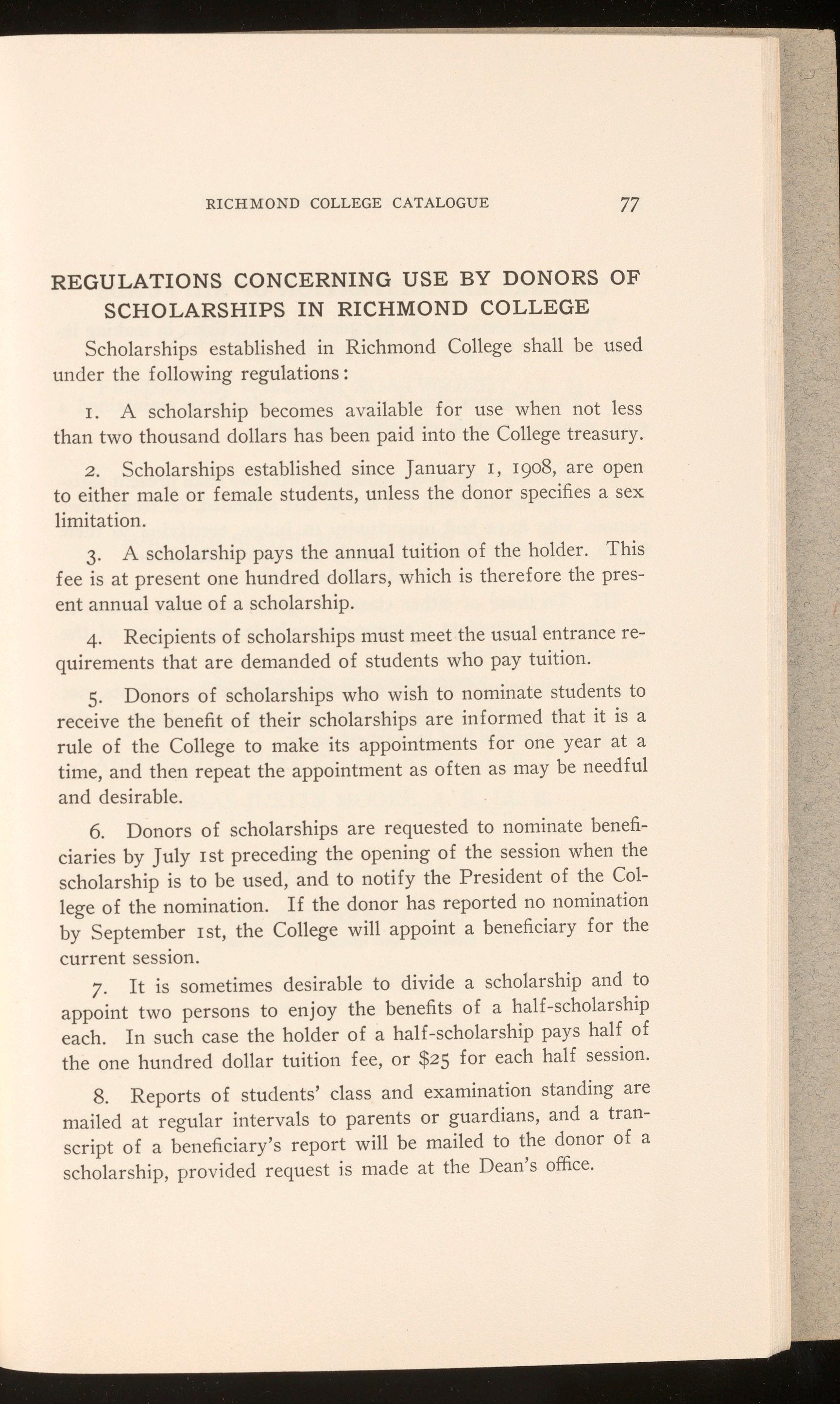
Scholarships established in Richmond College shall be used under the following regulations:
I. A scholarship becomes available for use when not less than two thousand dollars has been paid into the College treasury.
2. Scholarships established since January I, 1908, are open to either male or female students, unless the donor specifies a sex limitation .
3. A scholarship pays the annual tuition of the holder. This fee is at present one hundred dollars, which is therefore the present annual value of a scholarship.
4. Recipients of scholarships must meet the usual entrance requirements that are demanded of students who pay tuition.
5. Donors of scholarships who wish to nominate students to receive the benefit of their scholarships are informed that it is a rule of the College to make its appointments for one year at a time, and then repeat the appointment as often as may be needful and desirable.
6. Donors of scholarships are requested to nominate beneficiaries by July 1st preceding the opening of the session when the scholarship is to be used, and to notify the President of the College of the nomination. If the donor has reported no nomination by September 1st, the College will appoint a beneficiary for the current session.
7. It is sometimes desirable to divide a scholarship and to appoint two persons to enjoy the benefits of a half-scholarship each. In such case the holder of a half-scholarship pays half of the one hundred dollar tuition fee, or $25 for each half session.
8. Reports of students' class and examination standing are mailed at regular intervals to parents or guardians, and a transcript of a beneficiary's report will be mailed to the donor of a scholarship, provided reque st is made at the Dean's office.

The committee in charge has general instructions, in making its award of all Aid Funds, to give the preference:
I. To applicants already at College, who have maintained a good standing, both in character and study.
II. To other fully prepared applicants who shall present satisfactory testimonials from the school last attended, or from other persons who have had opportunity to judge, certifying to their health, attainments, habits of study and moral character.
III. To those of either class who give reasonable assurance that they will complete a course of study leading to one of the degrees of the College.
The recipients of aid are expected to prove, as students, not only above censure in all respects, but actively helpful to the College by example and by earnest work.
RICHMOND COLLEGE CATALOGUE
FREDERICK WILLIAM BOATWRIGHT, LL. D.
PRESIDENT
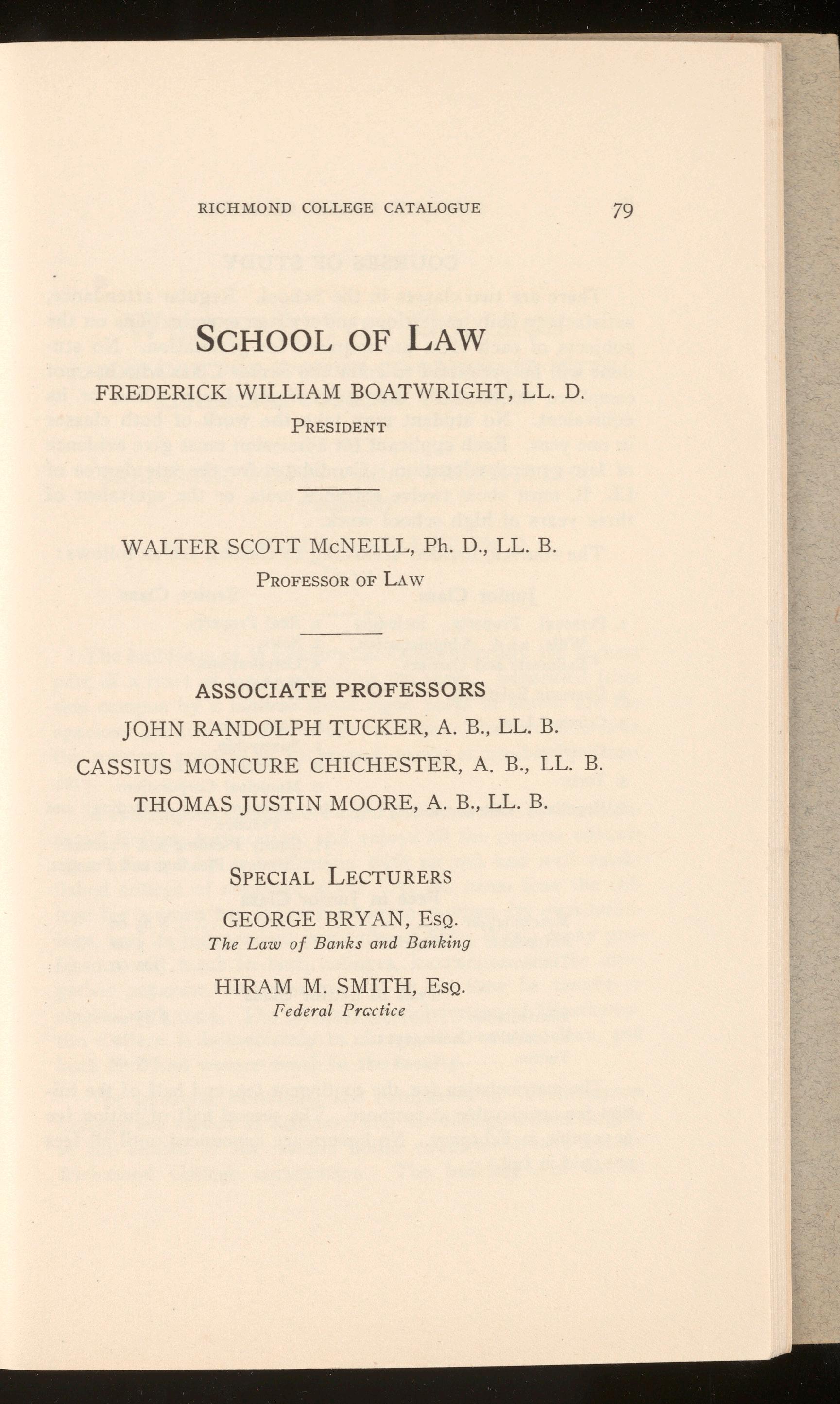
WALTER SCOTT McNEILL, Ph.D., LL. B.
PROFESSOR OF LA w
ASSOCIATE PROFESSORS
JOHN RANDOLPH TUCKER, A. B., LL. B.
CASSIUS MONCURE CHICHESTER, A. B., LL. B.
THOMAS JUSTIN MOORE, A. B., LL. B.
SPECIAL LECTURERS
GEORGE BRYAN, EsQ. The Law of Banks and Banking
HIRAM M. SMITH, EsQ. Federal Pmctice
There are two classes in the School. Regular attendance, satisfactory daily recitations and written examinations on the subjects of each class are required for graduation. No student will be permitted to enter the Senior Class who has not completed satisfactorily th e work of the Junior Class, or its equivalent. No student may take the work of both classes in one year. Each applicant for admission must give evidence of fair general education. Candidates for the law degree of LL. B. must show twelve entrance units, or the equivalent of three years of high school work.
The courses, divided according to classes, are as follows :
1. Personal Property , includin g Wills an d Admini stration , Bailments and Carriers
2. Domestic Relations.
3. Criminal Law .
4 Contracts.
5. Torts.
6 Negotiable Instruments.
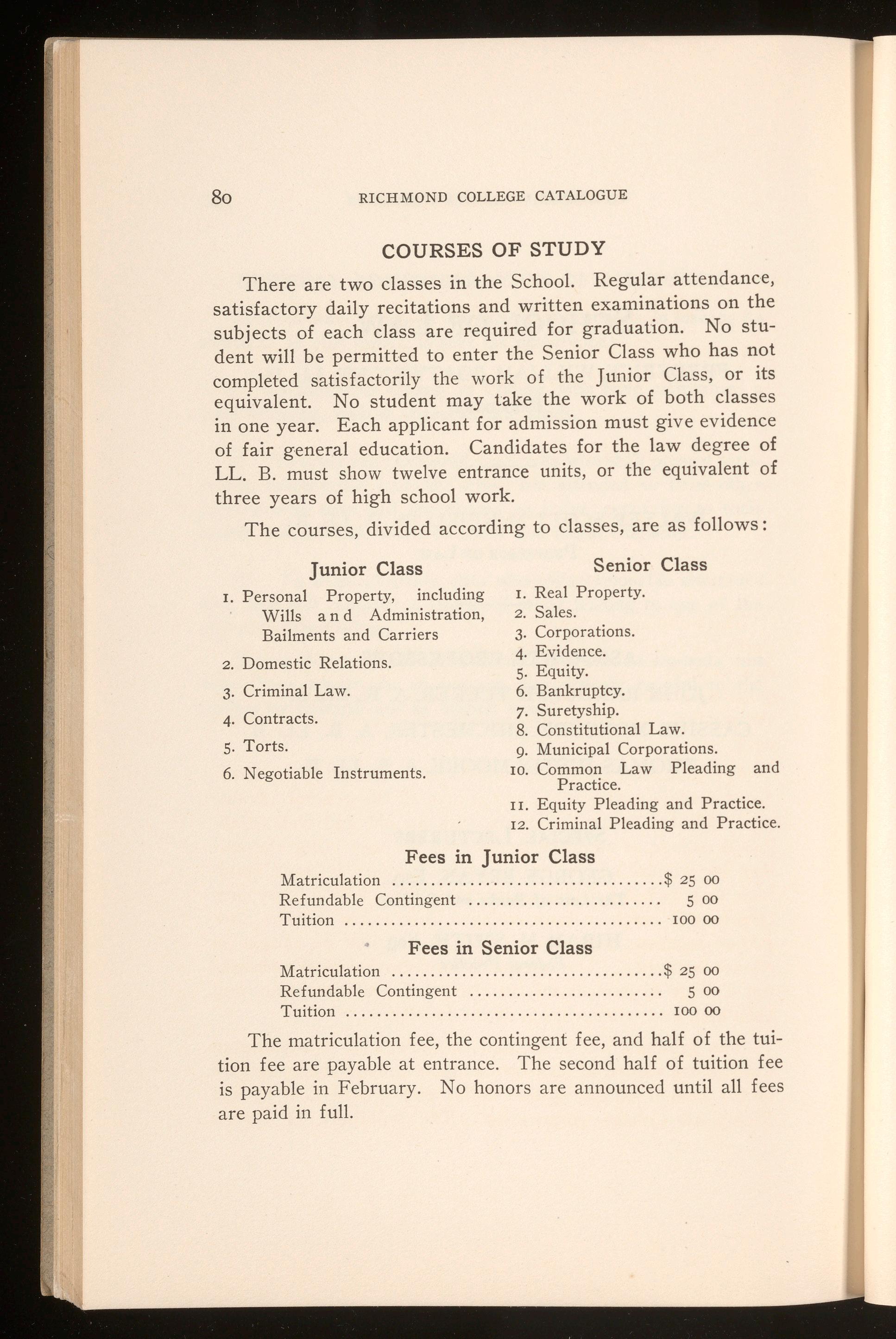
1. R ea l Property.
2. Sal es
3. Corporations.
4. Evid ence.
5. Equity.
6. Bankruptcy.
7. Suretyship.
8 Constitutional Law.
9 Municipal Corporations.
IO. Common Law Pleading and Practice.
11. Equity Pleading and Practice.
12. Criminal Pleading and Practice.
e !~ndable Contingent
Matriculation
!~ndable Contingent
The matriculation fee, the contingent fee, and half of the tuition fee are payable at entrance. The second half of tuition fee is payable in February No honor s are announced until all fees are paid in full.
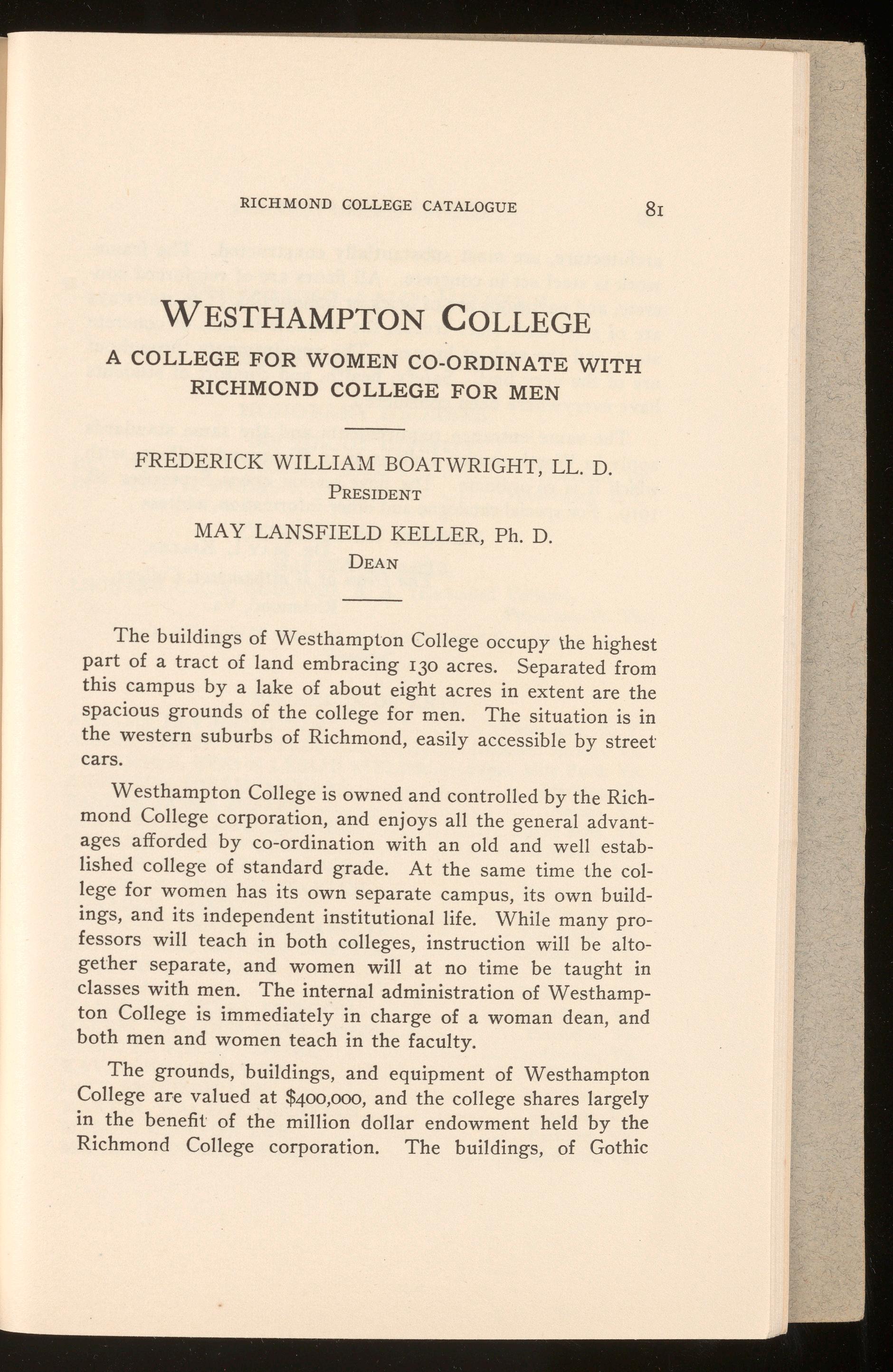
RICHMOND COLLEGE CATALOGUE
A COLLEGE FOR WOMEN CO-ORDINATE WITH RICHMOND COLLEGE FOR MEN
FREDERICK WILLIAM BOATWRIGHT, LL. D. PRESIDENT
MAY LANSFIELD KELLER, Ph.D. DEAN
The buildings of Westhampton College occupy \he highest part of a tract of land embracing 130 acres. Separated from this campus by a lake of about eight acres in extent are the spacious grounds of the college for men. The situation is in the western suburbs of Richmond, easily accessible by street cars.
Westhampton College is owned and controlled by the Rich- mond College corporation, and enjoys all the general advantages afforded by co-ordination with an old and well established college of standard grade. At the same time the college for women has its own separate campus, its own buildings, and its independent institutional life. While many pro- fessors will teach in both colleges, instruction will be altogether separate, and women will at no time be taught in classes with men. The internal administration of Westhampton College is immediately in charge of a woman dean, and both men and women teach in the faculty.
The grounds, buildings, and equipment of Westhampton College ar -e valued at $400,000, and the college shares largely in the benefit of the million dollar endowment held by the Richmond College corporation. The buildings, of Gothic

architecture, are most substantially constructed. The framework is steel set in concrete. All floors are of reinforced concrete, and partitions are of brick or hollow tile. The stairways are of steel with slate treads, the window frames of concrete stone and the sash of bronze. The appointments throughout are of the very best. Safety, health, and comfort of students have everywhere been considered.
The same entrance requirements and the same standards apply in Westhampton College as in Richmond College, with which it is co-ordinate. The next session opens September r8, 1919. For special catalogue and other information, address.
DR. MAY L. KELLER , The D ean of Westhampton Callege, Richmond, Va.

RICHMOND COLLEGE CATALOGUE
Degrees Conferred June, 1918
HONORARY DEGREES
DOCTOR OF DIVINITY
REV. WILLIAM LOCKHART BALL ................. Richmond, Va.
REV. JOHN E. BRIGGS ........ ..... . .... ......... Washington, D. C.
MASTER OF ARTS
LEONARD CECIL HUBBARD, B. A. (Richmond College), Princ eton, W. Va.
Thesis: "Francis H. Pierpont and the Restored Government of Virginia"
BACHELOR OF ARTS
ABRAMS, RAY HAMILTON .................... Patchogue, N, Y. ADAMS, PHILIP CHAPPELL ................... Cluster Springs, Va. ANDERSON, BYRON LESLIE FIELDS ... Seven Mile Ford, Va. ANDERSON, HIRAM DOUGLAS ........................ Clarkton, Va. BARNES, JAMES FOSTER .............................. Amelia, Va. BEAZLEY, ROLAND JENNINGS Upper Zion, Va. BEASLEY, TITUS WALKER ........ ...... Hollywood , Va. CHEATHAM, ALBERT CORNELIUS ................. Baltimore, Md. COLEMAN, RICHARD TAYLOR .................. Richmond, Va. DONAHUE , JAMES HENRY ......................... Richmond, Va. DUNFORD, FRANK BERNARD, JR. .............. Richmond, Va. ENTZMINGER, RICHARD GRIFFITH Greenville, S. C. FOX, PERCY RYLAND ............................... Jerrell, Va. GLASS, MAX ...................................... Richmond, Va. HAMILTON, PERRY ELWOOD Lynchburg, Va. HARRIS , MALCOLM HART JAMES ................. Pendleton, Va. HIBBITTS, PHILIP JEROME ........................... Grundy, Va. KAY, ASHBY WELDON .............................. Sparta, Va. LACY, RHODERIC LEE ............................... Scottsburg, Va. MARTIN, WALTER FRANKLIN Glasgow, Va. MASON, CLINTON LEE Parksley, Va. MILLER, EDWARD WALTER Richmond, Va.
RICHMOND COLLEGE CATALOGUE
SEWARD, BLANTON PAGE ... .... Isle of Wight, Va.
SPICER, MEADE THOMPSON, JR. Richmond, Va.
THOMAS, ANDREW JOHNSON .... .. .. .. ........ Talladega, Ala.
TUNE, WILLIAM ORRIN . Paces, Va WILLIS, JERE MALCOLM HARRIS . ........ . .. .. Fredericksburg, Va. WRENN, JAMES ERNEST .. Richmond, Va
BACHELOR OF SCIENCE
BOWLES, LEFTWICH SHEPHERD .. ... . ............ . Chest er, Va. HOOVER, EUGENE CARL Carloover, Va. RICHESON, ALLIE WILSON Blanton, Va.
BACHELOR OF SCIENCE IN MEDICINE
SHUMATE , JOHN KENLEY Peari sburg, Va
BACHELOR OF LAWS
KIDD , JOHN CLAUDIUS . .. Crewe, Va.
OMOHUNDRO, JOHN BURRELL . Richmond , Va
PALMER , RICHARD OTIS : . · ......... Urbanna, Va.
TATE , VERNOY BROWNIE ... .. Coburn, Va
WILSON, ROBERT HOWARD . ....... ...... ... . ...... . Honak er, Va.
Prizes Awarded June, 1918
Medalists in D epartm ents
Crump Prize (Mathematic s )
Tanner Medal (Greek)
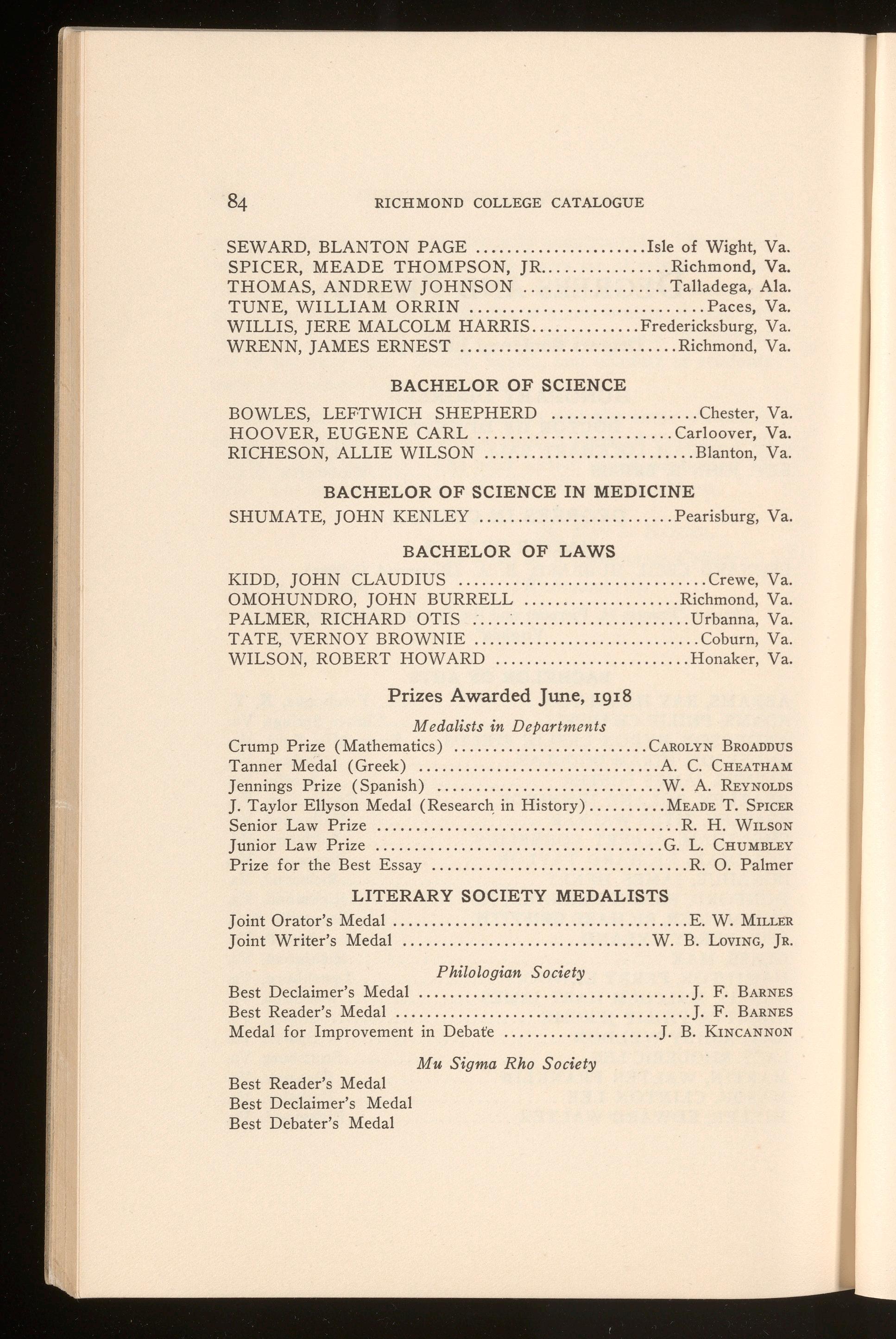
... CAROLYNBROADDUS
A . C. CHEATHAM
Jennings Prize (Spanish) .. W. A REYNOLDS
J. Taylor Ellyson Medal (Research _in History) ..... .... MEADET. SPICER
Senior Law Prize .... R. H WILSON
Junior Law Prize .
.. .. G. L. CHUMBLEY Prize for the Best Essay .
....... R. 0. Palmer
Joint Orator's Medal . .. E.W. MILLER
Joint Writer's Medal W B. LOVING,JR
Philologian Society
Best Declaimer's Medal . J. F. BARNES
Best Reader's Medal . J. F. BARNES Medal for Improvement in Debat'e . J. B. KINCANNON
Best Reader's Medal
Best Declaimer's Medal
Best Debater's Medal
Mu Sigma Rho Society

CLARK, WILLIAM JOHN (B. A., California College; B. D. Newton Theological Seminary, Mass.), Richmond, Va.
Class of 1919
CHAPPELL, RALPH RAYMOND .................. Richmond, Va. FEILD, JAMES WYATT ............................ Emporia, Va. GARNETT, ALFRED WILLIS ........................... Rapidan, Va. GOODE, BENJAMIN CLIFFORD ........................ Henry, Va. LEONARD, BERNARD WALTER Richmond, Va. LOVING, WILLIAM BOYCE, JR. Hinton, W. Va. NEWMAN, EMANUEL ............................ Richmond, Va. NICHOLAS, HENRY LEWIS ............... Madison Heights, Va. NORTHEN, LLEWELLYN COLUMBUS .......... Emmerton, Va. O'BRIEN, ALFRED ............................. Appomattox, Va. RUCKER, EDMUND HARRISON .................. Richmond, Va. RYLAND, ROBERT TEMPLE ..................... Walkerton, Va. RYLAND, WILBUR HARDMAN ....................... Urbanna, Va. SIMPSON, HERVEY PIERCE Salem, Va. STEPHENS, ROBERT NATHANIEL, JR. .............. Quinque, Va. TILLER, WILLIAM LINCUS ............................... Duty, Va. TRIBBLE, HAROLD WAYLAND ...................... Lake City, Fla. TRUNDLE, OTHO CLARK . .. . .. Gaithersburg, Md. TURNER, GRIVER MILTON ................... Stone Mountain, Va. WHITFIELD, JAMES MOREHEAD, JR Richmond, Va. WICKER, JAMES CALDWELL ........................ Richmond, Va.
Class of 1920
BEAZLEY, WYATT SANFORD ....................... Richmond, Va. BERRY, WILLIAM ROSCOE Richmond, Va. BOLTON, NORMAN MILTON ......................... Fincastle, Va. BRANN, BERNARD ANDREW .......................... Village, Va. BRIEL, GEORGE BERNHART ....................... Richmond, Va. BULLARD, RICHARD HIRST ....................... West Point, Va. CAMPBELL, THOMAS HEALY ........................ Tazewell, Va.
86
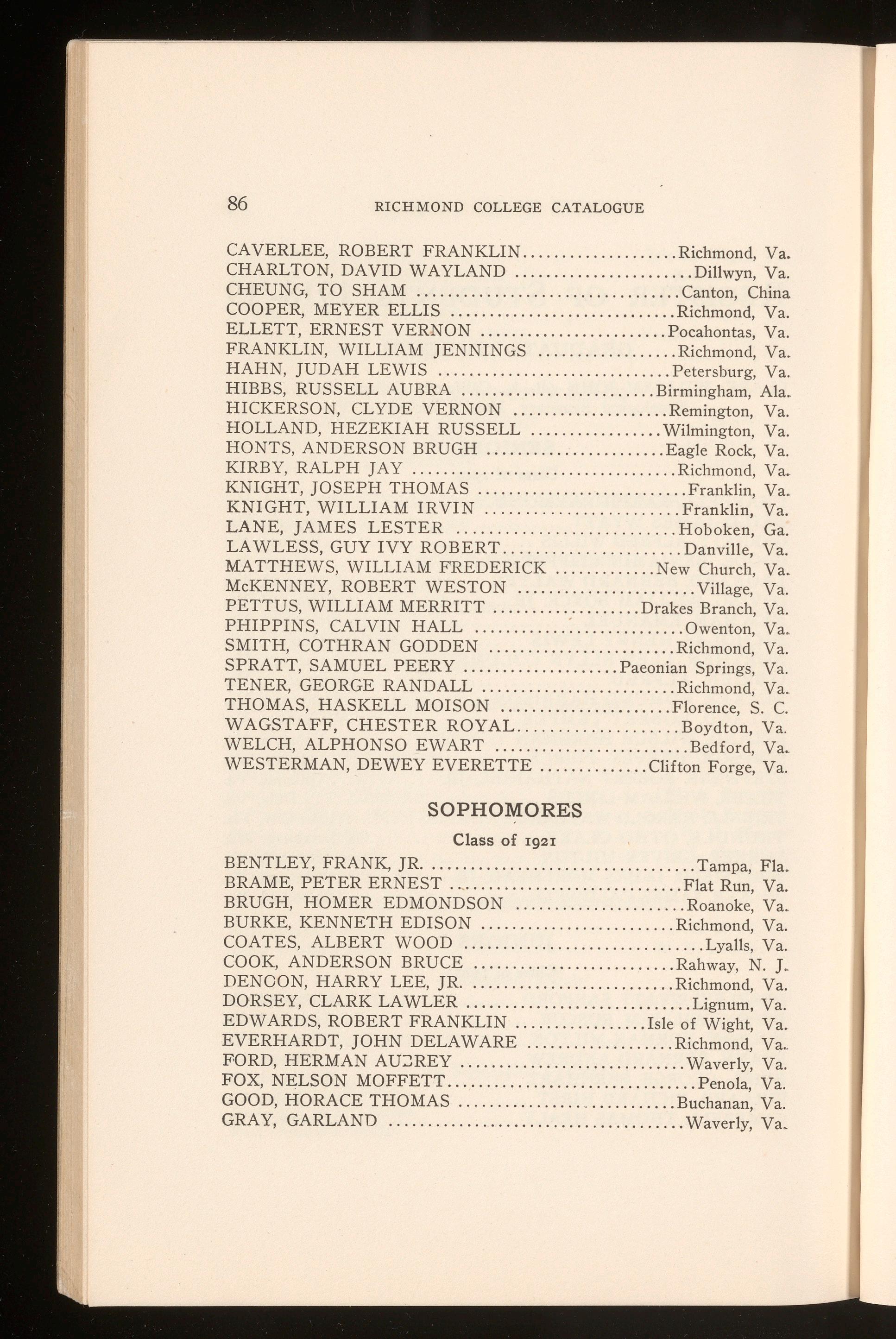
RICHMOND COLLEGE CATALOGUE
CAVERLEE, ROBERT FRANKLIN .................... Richmond, Va.
CHARLTON, DAVID WAYLAND ....................... Dillwyn, Va.
CHEUNG, TO SHAM .................................. Canton, China
COOPER, MEYER ELLIS ............................. Richmond, Va.
ELLETT, ERNEST VERNON ........................ Pocahontas, Va.
FRANKLIN, WILLIAM JENNINGS Richmond, Va.
HAHN, JUDAH LEWIS .............................. Petersburg, Va.
HIBBS, RUSSELL AUBRA ......................... Birmingham, Ala
HICKERSON, CLYDE VERNON .................... Remington, Va.
HOLLAND, HEZEKIAH RUSSELL ................. Wilmington, Va.
HONTS, ANDERSON BRUGH ....................... Eagle Rock, Va.
KIRBY, RALPH JAY .................................. Richmond, Va.
KNIGHT, JOSEPH THOMAS ........................... Franklin, Va
KNIGHT, WILLIAM IRVIN ........................ Franklin, Va.
LANE, JAMES LESTER ............. Hoboken, Ga.
LAWLESS, GUY IVY ROBERT ...................... Danville, Va.
MATTHEWS, WILLIAM FREDERICK ............. New Church, Va.
McKENNEY, ROBERT WESTON .. ... .................. Village, Va.
PETTUS, WILLIAM MERRITT ................... Drakes Branch, Va.
PHIPPINS, CALVIN HALL ............ : .............. Owenton, Va .
SMITH, COTHRAN GODDEN ........................ Richmond, Va. SPRATT, SAMUEL PEERY .................... Paeonian Springs, Va.
TENER, GEORGE RANDALL ......................... Richmond, Va
THOMAS, HASKELL MOISON ...................... Florence, S. C. WAGSTAFF, CHESTER ROYAL. ....... .......... Boydton, Va
WELCH, ALPHONSO EWART ......................... Bedford, Va. WESTERMAN, DEWEY EVERETTE .............. Clifton Forge, Va.
Class of 1921
BENTLEY, FRANK, JR. .................................. Tampa, Fla. BRAME, PETER ERNEST .. ............................. Flat Run, Va. BRUGH, HOMER EDMONDSON ..... ............... Roanoke, Va. BURKE, KENNETH EDISON ......................... Richmond, Va. COATES, ALBERT WOOD ............................... Lyalls, Va. COOK, ANDERSON BRUCE .......................... Rahway, N. J DENOON, HARRY LEE, JR. .......................... Richmond, Va. DORSEY, CLARK LAWLER ............................. Lignum, Va. EDWARDS, ROBERT FRANKLIN ................. Isle of Wight, Va. EVERHARDT, JOHN DELAWARE ................... Richmond, Va .. FORD, HERMAN AU:JREY ............................. Waverly, Va. FOX, NELSON MOFFETT ................................ Penola, Va. GOOD, HORACE THOMAS ................ ........... Buchanan, Va. GRAY, GARLAND ...................................... Waverly, Va.
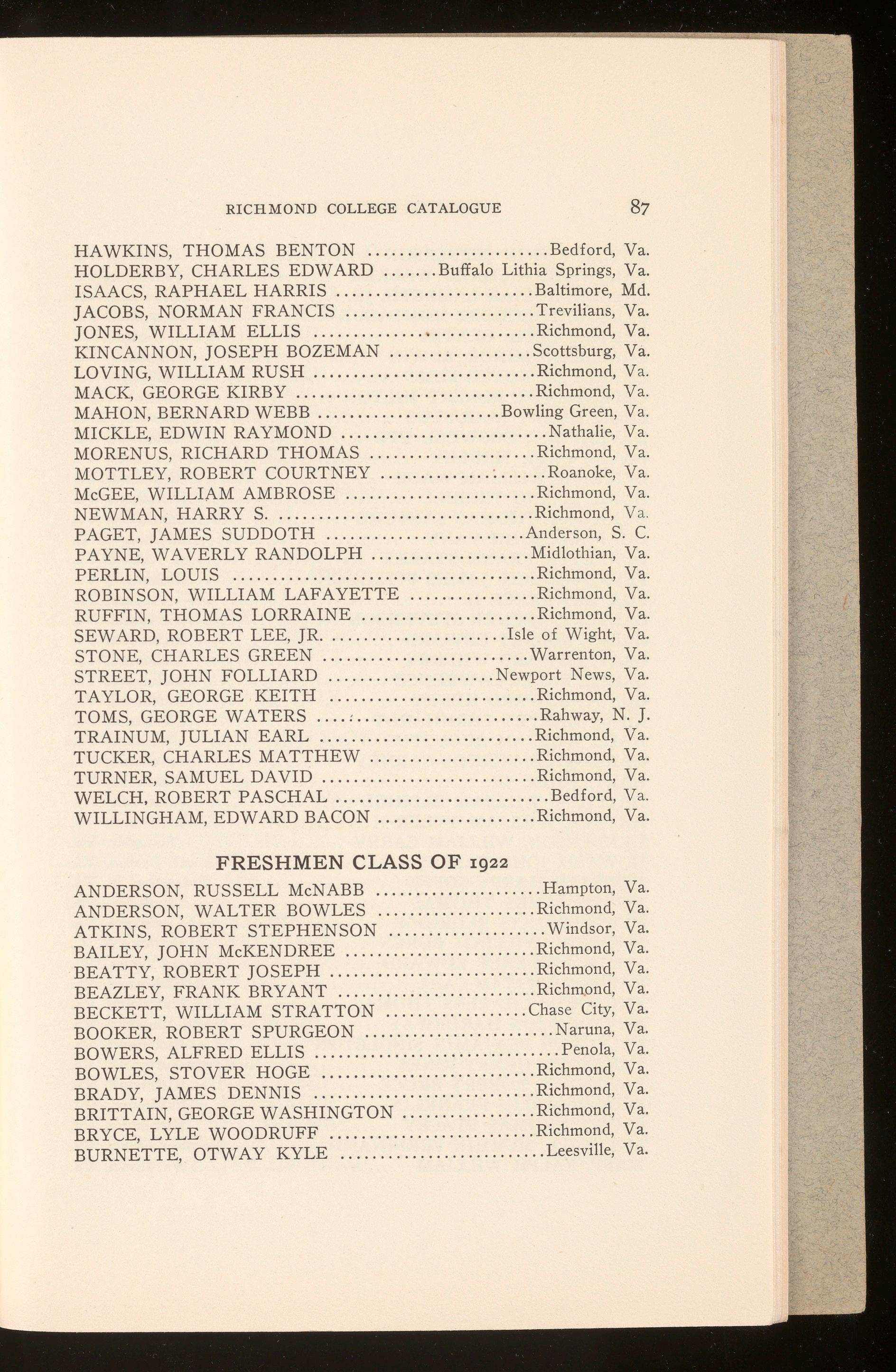
RICHMOND COLLEGE CATALOGUE 87
HAWKINS, THOMAS BENTON ....................... Bedford, Va. HOLDERBY, CHARLES EDWARD Buffalo Lithia Springs, Va. ISAACS, RAPHAEL HARRIS ......................... Baltimore, Md. JACOBS, NORMAN FRANCIS ........................ Trevilians, Va. JONES, WILLIAM ELLIS ............................ Richmond, Va. KINCANNON, JOSEPH BOZEMAN .................. Scottsburg, Va. LOVING, WILLIAM RUSH ............................ Richmond, Va.
MACK, GEORGE KIRBY .............................. Richmond, Va. MAHON, BERNARD WEBB ....................... Bowling Green, Va. MICKLE, EDWIN RAYMOND .......................... Nathalie, Va. MORENUS, RICHARD THOMAS ..................... Richmond, Va. MOTTLEY, ROBERT COURTNEY .............. : ...... Roanoke, Va. McGEE, WILLIAM AMBROSE ........................ Richmond, Va. NEWMAN, HARRY S . .. Richmond, Va. PAGET, JAMES SUDDOTH .........................
Anderson , S. C. PAYNE, WAVERLY RANDOLPH ... ... . Midlothian, Va. PERLIN, LOUIS .......................... ....... .... . Richmond, Va. ROBINSON, WILLIAM LAFAYETTE ................ Richmond, Va. RUFFIN, THOMAS LORRAINE . . ..... Richmond, Va. SEWARD, ROBERT LEE, JR. ...................... Isle of Wight, Va. STONE, CHARLES GREEN ...... . Warrenton, Va. STREET, JOHN FOLLIARD ..................... Newport News, Va. TAYLOR, GEORGE KEITH .......................... Richmond, Va. TOMS, GEORGE WATERS .... : ....................... Rahway, N. J. TRAINUM, JULIAN EARL ........................... Richmond, Va. TUCKER, CHARLES MATTHEW ..................... Richmond, Va. TURNER, SAMUEL DAVID ........................... Richmond, Va. WELCH, ROBERT PASCHAL . ... ....................... Bedford, Va. WILLINGHAM, EDWARD BACON ...... Richmond, Va.
ANDERSON, RUSSELL McNABB . ... .... Hampton, Va. ANDERSON, WALTER BOWLES .................... Richmond, Va. ATKINS, ROBERT STEPHENSON .................... Windsor , Va. BAILEY, JOHN McKENDREE ...... ............ Richmond, Va. BEATTY, ROBERT JOSEPH ............. Richmond, Va. BEAZLEY, FRANK BRYANT ......................... Richmond, Va. BECKETT, WILLIAM STRATTON .................. Chase City, Va. BOOKER, ROBERT SPURGEON ........................ Naruna, Va. BOWERS, ALFRED ELLIS ............................... Penola, Va. BOWLES, STOVER HOGE ........................... Richmond, Va. BRADY, JAMES DENNIS . ........ ... Richmond, Va. BRITTAIN, GEORGE WASHINGTON ................. Richmond, Va. BRYCE, LYLE WOODRUFF .......................... Richmond, Va. BURNETTE, OTWAY KYLE .......................... Leesville, Va.
88
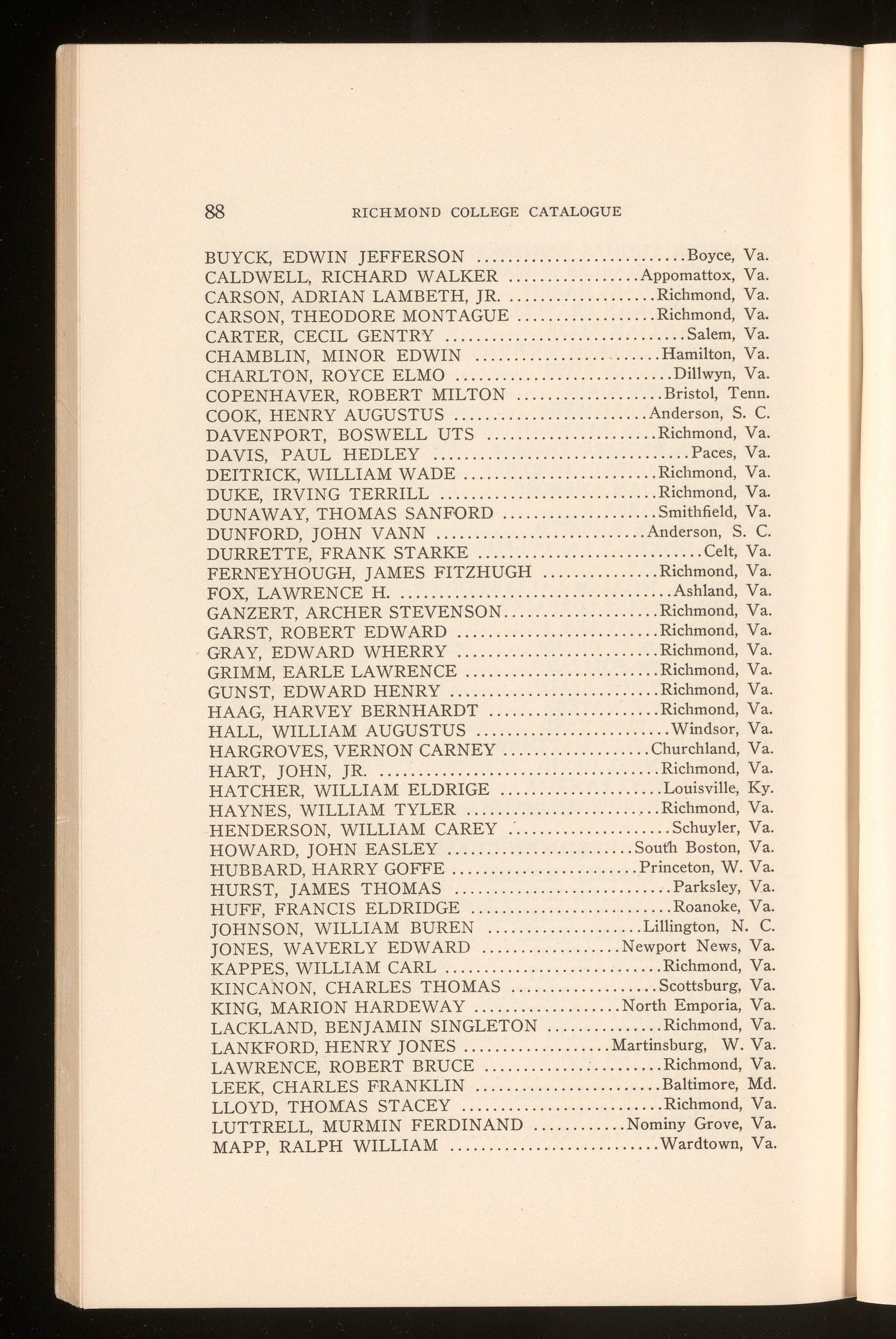
RICHMOND COLLEGE CATALOGUE
BUYCK, EDWIN JEFFERSON ........................... Boyce, Va. CALDWELL, RICHARD WALKER ................. Appomattox, Va. CARSON, ADRIAN LAMBETH, JR. ................... Richmond, Va. CARSON, THEODORE MONTAGUE .... ......... Richmond, Va. CARTER, CECIL GENTRY .... ...... ...... . . ..... Salem, Va. CHAMBLIN, MINOR EDWIN ................. . ...... Hamilton, Va. CHARLTON, ROYCE ELMO ............................ Dillwyn, Va. COPENHAVER, ROBERT MILTON .... ......... . Bristol, Tenn. COOK, HENRY AUGUSTUS ..... .................... Anderson, S. C. DAVENPORT, BOSWELL UTS ...................... Richmond, Va. DAVIS, PAUL HEDLEY ................................. Paces, Va. DEITRICK, WILLIAM WADE ......................... Richmond, Va. DUKE, IRVING TERRILL .......... .. .... .. Richmond, Va. DUNAWAY, THOMAS SANFORD .............. Smithfield, Va. DUNFORD, JOHN VANN ................ . .. Anderson, S. C. DURRETTE, FRANK STARKE ... . .............. ......... Celt, Va. FERNEYHOUGH, JAMES FITZHUGH ............... Richmond, Va. FOX, LAWRENCE H ..... .................. .......... Ashland, Va. GANZERT, ARCHER STEVENSON .................... Richmond, Va. GARST, ROBERT EDWARD .......................... Richmond, Va. GRAY, EDWARD WHERRY ........ ................ Richmond, Va. GRIMM, EARLE LAWRENCE ......................... Richmond, Va. GUNST, EDWARD HENRY . ...... .... Richmond, Va. HAAG, HARVEY BERNHARDT ...................... Richmond, Va. HALL, WILLIAM AUGUSTUS ......................... Windsor, Va. HARGROVES, VERNON CARNEY .................. Churchland, Va. HART, JOHN, JR. .................................... Richmond, Va. HATCHER, WILLIAM ELDRIGE ..................... Louisville, Ky. HA YNES, WILLIAM TYLER .... .. Richmond, Va. HENDERSON, WILLIAM CAREY .'.................... Schuyler, Va. HOWARD, JOHN EASLEY ........................ Sout'h Boston, Va. HUBBARD, HARRY GOFFE ........................ Princeton, W. Va. HURST, JAMES THOMAS ... ....... .. Parksley, Va. HUFF, FRANCIS ELDRIDGE . . . ......... Roanoke, Va. JOHNSON, WILLIAM BUREN ......... Lillington, N. C. JONES , WAVERLY EDWARD .................. Newport News, Va. KAPPES, WILLIAM CARL ............................ Richmond, Va. KINCANON, CHARLES THOMAS ................... Scottsburg, Va. KING, MARION HARDEWAY ................... North Emporia, Va. LACKLAND, BENJAMIN SINGLETON ...... . ... Richmond, Va. LANKFORD, HENRY JONES . ... Martinsburg, W. Va. LAWRENCE, ROBERT BRUCE ....................... Richmond, Va. LEEK, CHARLES FRANKLIN ........................ Baltimore, Md. LLOYD, THOMAS STACEY ... ....................... Richmond, Va. LUTTRELL, MURMIN FERDINAND Nominy Grove, Va. MAPP, RALPH WILLIAM ......... Wardtown, Va.
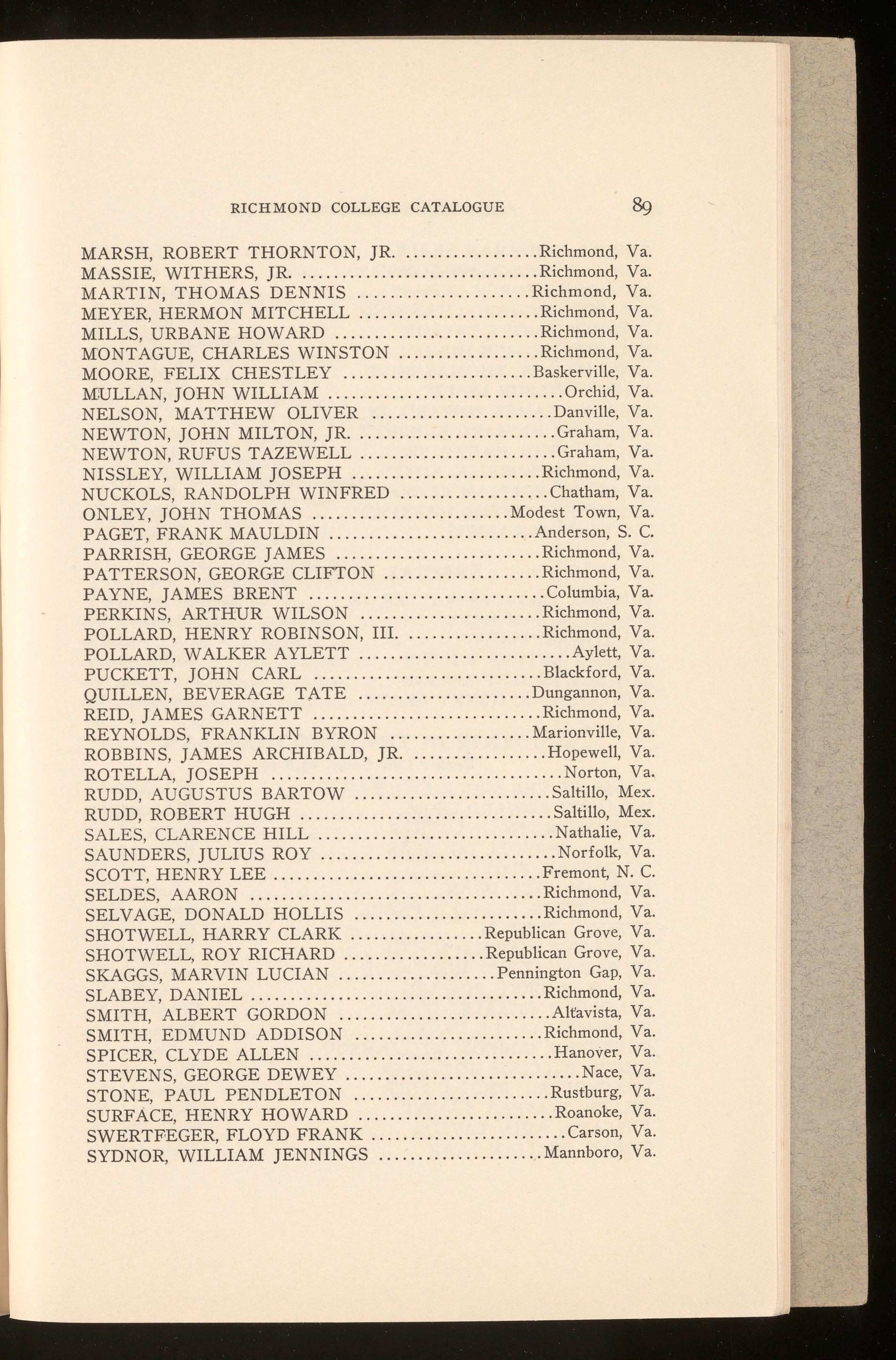
RICHMOND COLLEGE CATALOGUE 8g
MARSH, ROBERT THORNTON, JR. ................. Richmond, Va.
MASSIE, WITHERS, JR. .............................. Richmond, Va.
MARTIN, THOMAS DENNIS ..................... Richmond, Va.
MEYER, HERMON MITCHELL ....................... Richmond, Va. MILLS, URBANE HOWARD .......................... Richmond, Va. MONTAGUE, CHARLES WINSTON .................. Richmond, Va. MOORE, FELIX CHESTLEY ........................ Baskerville, Va.
M:ULLAN, JOHN WILLIAM .... .. ...... ..... Orchid, Va. NELSON, MATTHEW OLIVER ....................... Danville, Va. NEWTON, JOHN MILTON, JR. ......................... Graham, Va. NEWTON, RUFUS TAZEWELL ......................... Graham, Va. NISSLEY, WILLIAM JOSEPH ........................ Richmond, Va.
NUCKOLS, RANDOLPH WINFRED ................... Chatham, Va. ONLEY, JOHN THOMAS ......................... Modest Town, Va. PAGET, FRANK MAULDIN .......................... Anderson, S. C. PARRISH, GEORGE JAMES .......................... Richmond, Va. PATTERSON, GEORGE CLIFTON .................... Richmond, Va.
PAYNE, JAMES BRENT .............................. Columbia, Va. PERKINS, ARTHUR WILSON ....................... Richmond, Va.
POLLARD, HENRY ROBINSON, III. ................. Richmond, Va. POLLARD, WALKER AYLETT .... ...... .. ...... Aylett, Va.
PUCKETT, JOHN CARL ............. .. ........ Blackford, Va.
QUILLEN, BEVERAGE TATE ...................... Dungannon, Va.
REID, JAMES GARNETT ............................. Richmond, Va. REYNOLDS, FRANKLIN BYRON ............ Marionville, Va. ROBBINS, JAMES ARCHIBALD, JR. ................. Hopewell, Va. ROTELLA, JOSEPH ..................................... Norton, Va. RUDD, AUGUSTUS BARTOW ......................... Saltillo, Mex. RUDD, ROBERT HUGH .. ..... ........ Saltillo, Mex. SALES, CLARENCE HILL .............................. Nathalie, Va. SAUNDERS, JULIUS ROY .............................. Norfolk, Va. SCOTT, HENRY LEE .................................. Fremont, N. C. SELDES, AARON .......................... .. ......... Richmond, Va. SELVAGE, DONALD HOLLIS ................... Richmond, Va. SHOTWELL, HARRY CLARK .......... Republican Grove, Va. SHOTWELL, ROY RICHARD .................. Republican Grove, Va. SKAGGS, MARVIN LUCIAN .................... Pennington Gap, Va. SLABEY, DANIEL ..................................... Richmond, Va. SMITH, ALBERT GORDON ... . ....................... Alfavista, Va. SMITH, EDMUND ADDISON ................. Richmond, Va. SPICER, CLYDE ALLEN ............................... Hanover, Va. STEVENS, GEORGE DEWEY ........ ......... Nace, Va. STONE, PAUL PENDLETON ......................... Rustburg, Va. SURFACE, HENRY HOWARD ......................... Roanoke, Va. SWERTFEGER, FLOYD FRANK . ........... Carson, Va. SYDNOR, WILLIAM JENNINGS ..................... Mannboro, Va.
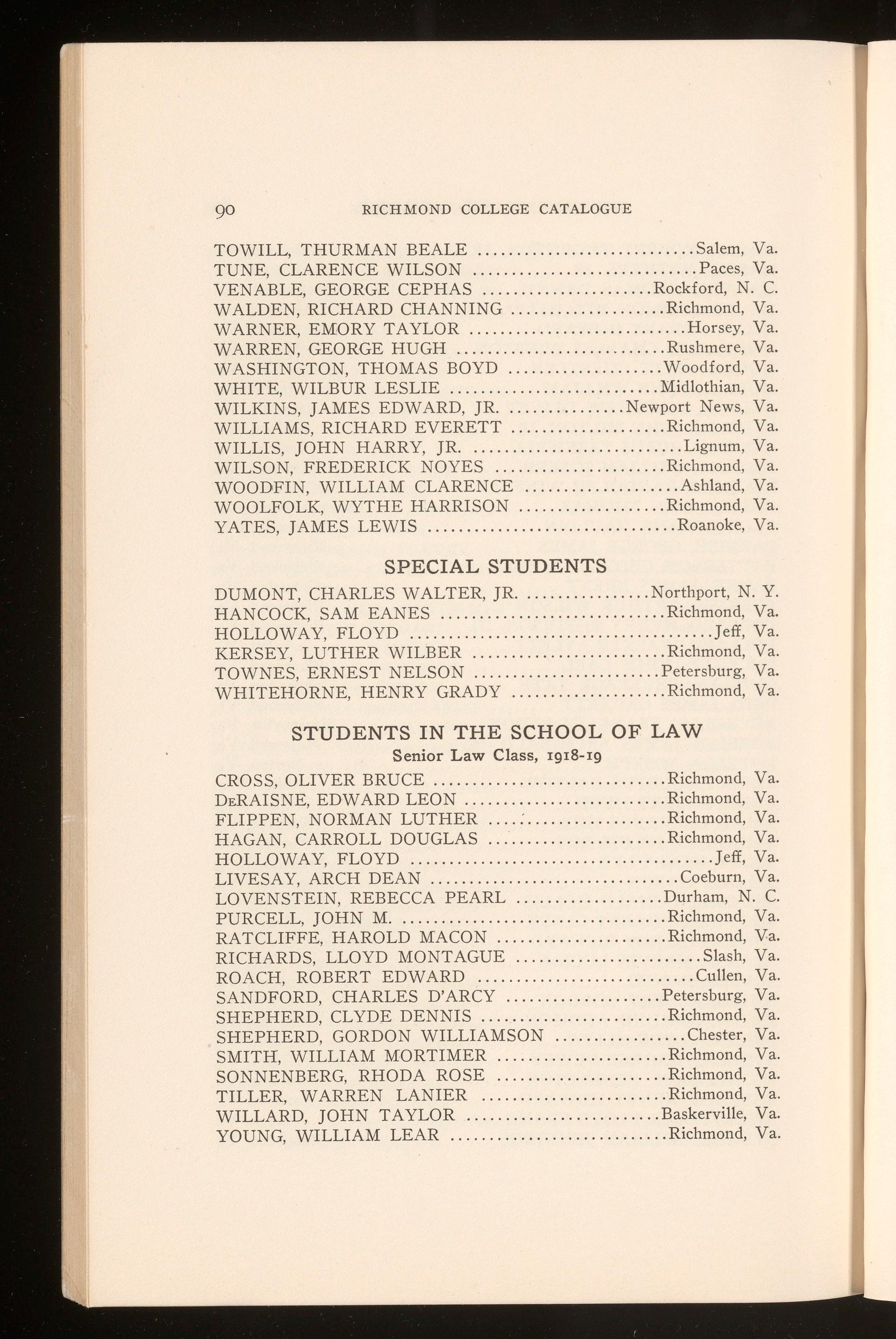
RICHMOND COLLEGE CATALOGUE
TOWILL, THURMAN BEALE ............................ Salem, Va.
TUNE, CLARENCE WILSON ............................. Paces, Va.
VENABLE, GEORGE CEPHAS ...................... Rockford, N. C. WALDEN, RICHARD CHANNING Richmond, Va. WARNER, EMORY TAYLOR ............................ Horsey, Va.
WARREN, GEORGE HUGH ........................... Rushmere, Va. WASHINGTON, THOMAS BOYD .................... Woodford, Va.
WHITE, WILBUR LESLIE ........................... Midlothian, Va.
WILKINS, JAMES EDWARD, JR. ............... Newport News, Va. WILLIAMS, RICHARD EVERETT .................... Richmond, Va. WILLIS, JOHN HARRY, JR. ........................... Lignum, Va.
WILSON, FREDERICK NOYES ...................... Richmond, Va.
WOODFIN, WILLIAM CLARENCE Ashland, Va. WOOLFOLK, WYTHE HARRISON ................... Richmond, Va. YATES, JAMES LEWIS ................................ Roanoke, Va.
DUMONT, CHARLES WALTER, JR. ................ Northport, N. Y. HANCOCK, SAM EANES ............................. Richmond, Va. HOLLOWAY, FLOYD ....................................... Jeff, Va. KERSEY, LUTHER WILBER ......................... Richmond, Va. TOWNES, ERNEST NELSON ........................ Petersburg, Va. WHITEHORNE, HENRY GRADY .................... Richmond, Va.
STUDENTS IN THE SCHOOL OF LAW
Senior Law Class, 1918-19
CROSS, OLIVER BRUCE .............................. Richmond, Va. DERAISNE, EDWARD LEON .......................... Richmond, Va. FLIPPEN, NORMAN LUTHER .... : Richmond, Va. HAGAN, CARROLL DOUGLAS Richmond, Va. HOLLOWAY, FLOYD ....................................... Jeff, Va. LIVESAY, ARCH DEAN ................................ Coeburn, Va. LOVENSTEIN, REBECCA PEARL Durham, N. C. PURCELL, JOHN M ................................... Richmond, Va. RATCLIFFE, HAROLD MACON ...................... Richmond, Va. RICHARDS, LLOYD MONTAGUE ........................ Slash, Va. ROACH, ROBERT EDWARD ............................ Cullen, Va. SANDFORD, CHARLES D'ARCY .................... Petersburg, Va. SHEPHERD, CLYDE DENNIS ........................ Richmond, Va. SHEPHERD, GORDON WILLIAMSON Chester, Va. SMITH, WILLIAM MORTIMER ...................... Richmond, Va. SONNENBERG, RHODA ROSE ...................... Richmond, Va. TILLER, WARREN LANIER ........................ Richmond, Va. WILLARD, JOHN TAYLOR ......................... Baskerville, Va. YOUNG, WILLIAM LEAR ............................ Richmond, Va.
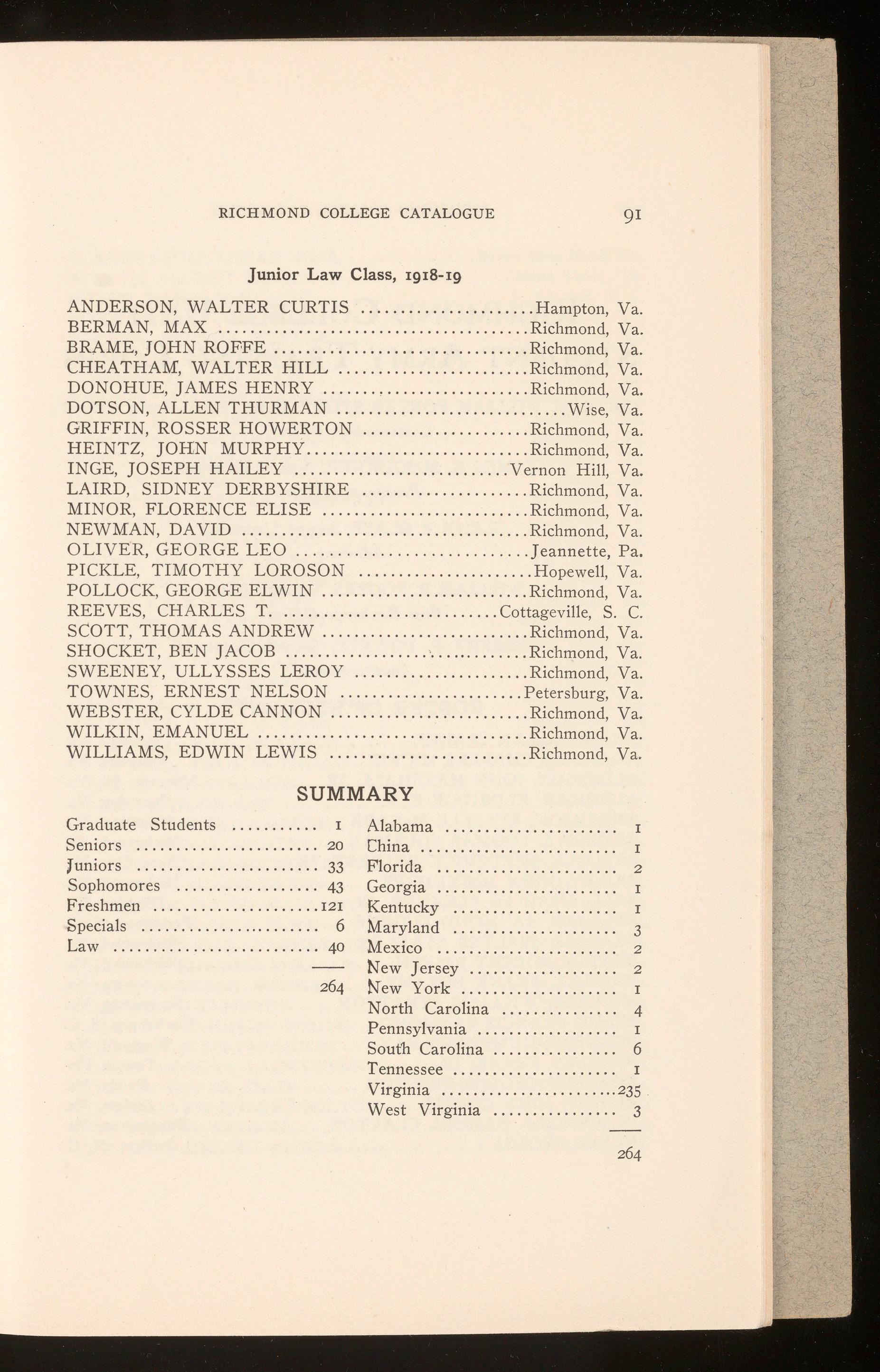
ANDERSON, WALTER CURTIS ...................... Hampton, Va. BERMAN, MAX ....................................... Richmond, Va.
BRAME, JOHN ROFFE ................................ Richmond, Va.
CHEATHAM, WALTER HILL ........................ Richmond, Va.
DONOHUE, JAMES HENRY .......................... Richmond, Va.
DOTSON, ALLEN THURMAN ............................. Wise, Va.
GRIFFIN, ROSSER HOWERTON ..................... Richmond, Va.
HEINTZ, JOHN MURPHY ............................ Richmond, Va.
INGE, JOSEPH HAILEY Vernon Hill, Va.
LAIRD, SIDNEY DERBYSHIRE ..................... Richmond, Va.
MINOR, FLORENCE ELISE .......................... Richmond, Va. NEWMAN, DAVID .................................... Richmond, Va.
OLIVER, GEORGE LEO .......................... Jeannette, Pa.
PICKLE, TIMOTHY LOROSON ...................... Hopewell, Va.
POLLOCK, GEORGE ELWIN .......................... Richmond, Va.
REEVES, CHARLES T. . ........ ............. Cottageville, S. C. SCOTT, THOMAS ANDREW Richmond, Va.
SHOCKET, BEN JACOB ........................... Richmond, Va.
SWEENEY, ULLYSSES LEROY ...................... Richmond, Va.
TOWNES, ERNEST NELSON ....................... Petersburg, Va.
WEBSTER, CYLDE CANNON Richmond, Va. WILKIN, EMANUEL .................................. Richmond, Va. WILLIAMS, EDWIN LEWIS ......................... Richmond, Va.
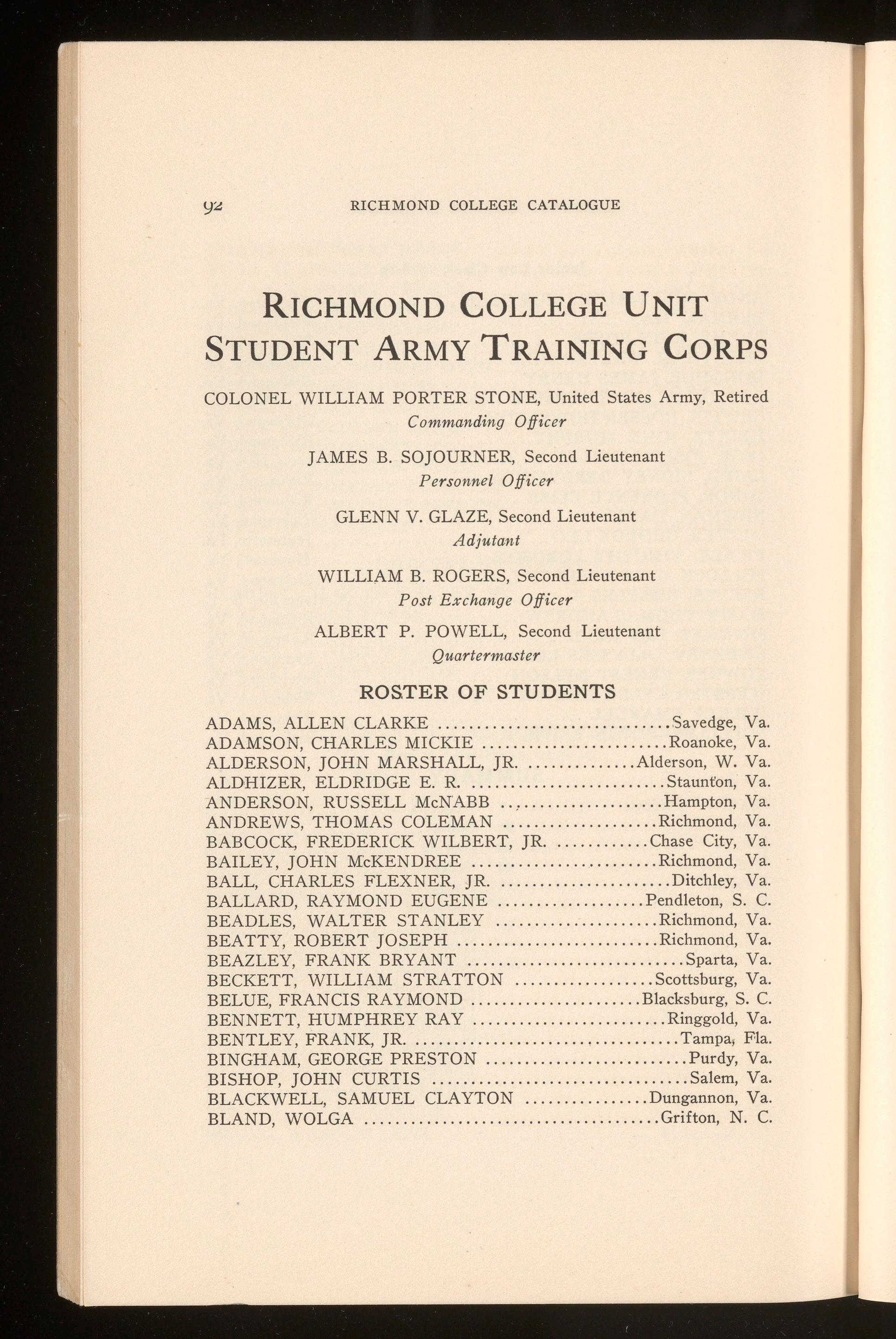
RICHMOND COLLEGE CATALOGUE
COLONEL WILLIAM PORTER STONE, United States Army, Retired Commanding Officer
JAMES B. SOJOURNER, Second Lieutenant Personnel Officer
GLENN V. GLAZE, Second Lieutenant Adjutant
WILLIAM B. ROGERS, Second Lieutenant Post Exchange Officer
ALBERT P. POWELL, Second Lieutenant Quartermaster
ADAMS, ALLEN CLARKE .............................. Savedge, Va. ADAMSON, CHARLES MICKIE ........................ Roanoke, Va.
ALDERSON, JOHN MARSHALL, JR. .............. Alderson, W. Va.
ALDHIZER, ELDRIDGE E. R. ......................... Staunt'on, Va. ANDERSON, RUSSELL McNABB , .................. Hampton, Va. ANDREWS, THOMAS COLEMAN .................... Richmond, Va. BABCOCK, FREDERICK WILBERT, JR. ............ Chase City, Va. BAILEY, JOHN McKENDREE Richmond, Va. BALL, CHARLES FLEXNER, JR. ...................... Ditchley, Va. BALLARD, RAYMOND EUGENE ........... ........ Pendleton, S. C. BEADLES, WALTER STANLEY Richmond, Va. BEATTY, ROBERT JOSEPH .......................... Richmond, Va.
BEAZLEY, FRANK BRYANT ............................ Sparta, Va. BECKETT, WILLIAM STRATTON .................. Scottsburg, Va. BELUE, FRANCIS RAYMOND ..... Blacksburg, S. C. BENNETT, HUMPHREY RAY ......................... Ringgold, Va. BENTLEY, FRANK, JR. .......... ....................... Tampa 1 Fla. BINGHAM, GEORGE PRESTON .......................... Purdy, Va. BISHOP, JOHN CURTIS ................................. Salem, Va. BLACKWELL, SAMUEL CLAYTON ................ Dungannon, Va. BLAND, WOLGA ...................................... Grifton, N. C.

RICHMOND COLLEGE CATALOGUE 93
BLANKENSHIP, OSCAR NEAL ............... . Seven Mile Ford, Va. BOELTE, AUGUST ERNEST ....................... News Ferry, Va.
BONEY, DAVID McKINNIE ........................... Kinst'on, N. C.
BONHAM, CLINTON STEELE .................... Princeton, W Va. BOOKER, RUSSELL EUBANK ..... ..... ................. Healys, Va. BOUGHAM, HENRY WOOD .... ... ................ West Point, Va. BOWERS, ALFRED ELLIS .............................. Penola , Va.
BOWLES, CHARLES CHAMPIN ..................... Glen Allen, Va. BRADY, JAMES DENNIS ............................ Richmond, Va. BRADSHAW, WILLIAM DANIEL .................... Burkeville, Va.
BRITTAIN, GEORGE WASHINGTON ....... ... .. Richmond , Va.
BROADDUS, FRANK ......... . ..... ........ Bagby, Va.
BROADDUS, RICHARD FRANKLIN .... . .. Newtown, Va. BROOKS, OVERTON ..................................... Sparta, Va.
BROWN, JAMES HAMPTON ........................... Midland, Va. BROWN, OSCAR CLARENCE ........................ Big Island, Va.
BRUGH, HOMER EDMONDSON .................. .... Roanoke, Va.
BRYCE, LYLE WOODRUFF ..................... .... Richmond, Va. BULLARD, RICHARD HIRST ........... ........ West Point , Va. RUNDICK, RYLAND McKENLEY ................. Modest Town, Va. BURACKER, JOSEPH AMISS . ........................... Luray , Va.
BUYCK , EDWIN JEFFERSON .............. ............ .. Boyce, Va.
CACHELIN, BURWELL HATCHER .................... Norfolk, Va. CALDWELL, THOMAS EARL ...................... Appomatt'ox, Va. CALDWELL, RICHARD EARL ......... ............ Appomattox, Va. CAMPBELL, THOMAS HEALY .................. Tazewell, Va. CARR, DAVID COLEMAN .............................. Holland , Va. CARR, FITHUGH LEE ................................. Waverly, Va. CARSON, VIRGIL LAMBETH ..................... Spout Spring, Va. CARTER, CECIL GENTRY .............................. Salem, Va. CARTER, COLVIN HERBERT ... .... ....... Kilmarnock , Va. CHAMBLIN , MINOR EDWIN .......................... Hamilton, Va CHARLTON, DAVID WAYLAND ....................... Dillwyn, Va. CHARLTON, ROYCE ELMO ........................... Dillwyn, Va. CHASE, FRANCIS SEABURY, JR. ..... ...... . .. White Stone, Va CHESTER, EDWARD WILLIAM ........... ........ Richmond, Va. COCKS, JOHNSON MORGAN ....................... Disputanta, Va. COLEY, LEW KENNEDY .............................. Gate City, Va. COLONA, FRANKLIN WHITE ....................... Parksley , Va. COLEMAN, JOHN FRANKLIN ........................ Saint Just, Va. COMBS, MORGAN LAFAYETTE ....................... Grundy, Va. COOPER, MEYER ELLIS .. .......... ............. Richmond, Va. COPENHAVER, ROBERT MILTON ...................... Bristol, Va. COX, ERNEST NELSON ............................. Lane View, Va. CREAMER, MELVIN JOSEPH ... .................... Richmond, Va.
94

RICHMOND COLLEGE CATALOGUE
DABNEY, SHEPHERD CARLYLE ....................... Guinea, Va
DAVIS, JAMES ROBERT ............................... Danville, Va.
DAVIS, PAUL HADLEY ................................... Paces, Va.
DIETRICK, ALFRED FREDERICK ................... Richmond, Va.
DIETRICK, WILLIAM WADE ........................ Richmond, Va.
DOWDY, RICHARD HAYNIE .................... South Boston, Va.
DRINARD, JAMES ELLIOTT ........................ Richmond, Va.
DUDLEY, GUY RUCKER .............................. Danville, Va.
DUNCAN, THOMAS EUGENE ................ Mouth of Wilson, Va.
DUNFORD, JOHN VANN ............................ Anderson, S. C.
DURHAM, THOMAS SAMUEL ........................ Bestland, Va.
DURRETTE, FRANK STARKE ............................. Celt, Va.
DUVAL , ASCHAM JAMES .......................... Rhoadsville, Va.
EANES , RUSSELL WALKER ......................... Richmond, Va.
EDWARDS, GARDNER TYLER ........................ Franklin, Va.
ELLER, EDWIN CICERO .............................. Bina, Va.
EVERHADT, ]OWN DELAWARE ..................... Richmond, Va.
FEILD, JAMES DAVID BROWN ..................... West Point, Va.
FERRELL, THORNTON JEFFERSON ..................... Paces, Va. FRANKLIN, WILLIAM JENNINGS .................. Richmond, Va.
GARNER, ROLAND WILLIS ...... . ..................... Callao, Va.
GARST, ROBERT EDWARD .......................... Richmond, Va.
GARY, BENJAMIN WALTER ...................... West Point, Va.
GAW, ROBERT STRIBLING ..................... Charlottesville, Va.
GIBSON, EDWIN JOSEPH .............................. Coeburn, Va.
GIBSON, FREDERICK GRAY .......................... Lebanon, Va.
GOOD, HORACE THOMAS ........................... Buchanan, Va.
GORDON, PAUL IRVING ............................ Richmond, Va.
GRAV ATT, WILLIAM BROADDUS . , .................... Gether, Va.
GRIFFIN, GUY WALLACE ........................... Holmhead, Va. GRIFFIN, ROSSER HOWERTON .................... Richmond, Va.
GRIMM, EARL LAWRENCE .......................... Richmond, Va. HAFLING, FREDERICK JOSEPH ..................... Richmond, Va.
HALL, WILLIAM AUGUSTUS ......................... Windsor, Va. HARGROVES, VERNON CARNEY .................. Churchland, Va.
HARRISON, EUGENE ANDERSON ................. Richmond, Va.
HART, JOHN, JR ........... ........................ Richmond, Va.
HATCHER, WILLIAM ELDRIDGE .................... Louisville, Ky. HAWKINS, THOMAS BENTON ........................ Bedford, Va. HAYCOCK, CHARLES .................................. Pinners, Va. HAYDEN, BENJAMIN FRANKLIN Weems, Va. HIBBITTS, WAYNE CORDELL ........................ Grundy, Va. HICKERSON, CLYDE VERNON Remington, Va. HITT, MILTON GRIMSLEY ........................... Castleton, Va.
HOLDERBY, CHARLES EDWARD ........ Buffalo Lithia Springs, Va.
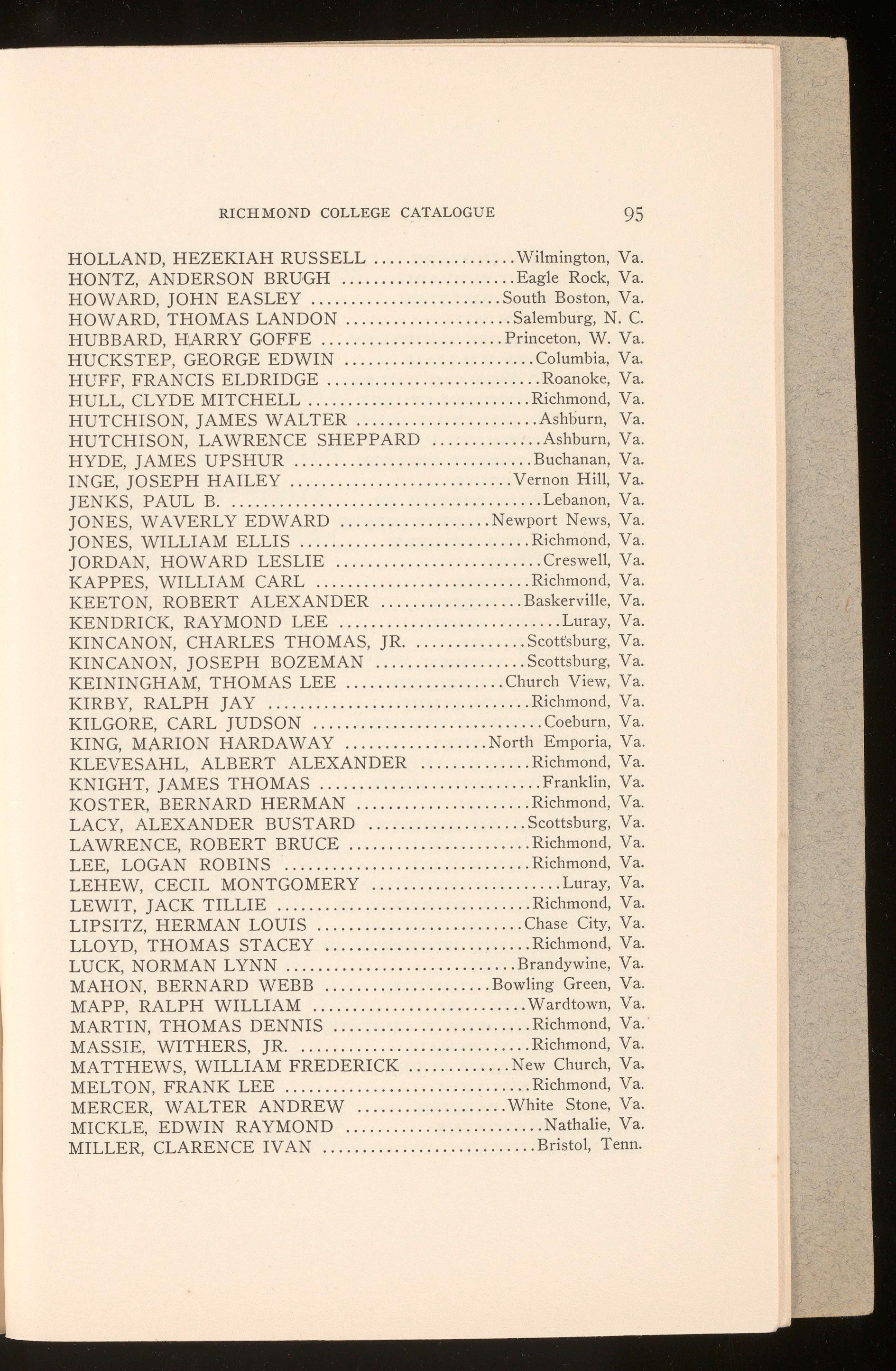
RICHMOND COLLEGE CATALOGUE 95
HOLLAND, HEZEKIAH RUSSELL .................. Wilmington, Va. HONTZ, ANDERSON BRUGH .... .. .... Eagle Rock, Va.
HOWARD, JOHN EASLEY ........................ South Boston, Va. HOWARD, THOMAS LANDON ..................... Salemburg, N. C. HUBBARD, HARRY GOFFE ........ Princeton, W. Va. HUCKSTEP, GEORGE EDWIN .... .... ........... Columbia, Va. HUFF, FRANCIS ELDRIDGE ........................... Roanoke, Va.
HULL, CLYDE MITCHELL ....... .............. . Richmond, Va. HUTCHISON, JAMES WALTER . ..... ....... Ashburn, Va. HUTCHISON, LAWRENCE SHEPPARD .............. Ashburn, Va. HYDE, JAMES UPSHUR ........... ... Buchanan, Va. INGE, JOSEPH HAILEY ............................ Vernon Hill, Va. JENKS , PAUL B............. ................... Lebanon, Va. JONES, WAVERLY EDWARD ................... Newport News, Va. JONES, WILLIAM ELLIS ............................. Richmond, Va. JORDAN, HOWARD LESLIE . .... ... Creswell, Va. KAPPES, WILLIAM CARL ........................... Richmond, Va. KEETON, ROBERT ALEXANDER .................. Baskerville, Va. KENDRICK, RAYMOND LEE ............. . .... Luray, Va. KINCANON, CHARLES THOMAS, JR. .............. Scottsburg, Va. KIN CANON, JOSEPH BOZEMAN ................... Scottsburg, Va. KEININGHAM, THOMAS LEE .................... Church View, Va. KIRBY, RALPH JAY ................................. Richmond , Va. KILGORE, CARL JUDSON ............................. Coeburn, Va. KING, MARION HARDAWAY .................. North Emporia, Va. KLEVESAHL, ALBERT ALEXANDER .. Richmond, Va. KNIGHT, JAMES THOMAS ......... .. ... . Franklin, Va. KOSTER, BERNARD HERMAN ...................... Richmond, Va. LACY , ALEXANDER BUSTARD .................... Scottsburg, Va. LAWRENCE, ROBERT BRUCE ....................... Richmond, Va. LEE, LOGAN ROBINS .. . ... .... . .... Richmond, Va. LEHEW, CECIL MONTGOMERY ........................ Luray, Va. LEWIT, JACK TILLIE ................................ Richmond, Va. LIPSITZ, HERMAN LOUIS ................ .... . Chase City, Va. LLOYD, THOMAS STACEY .......................... Richmond, Va. LUCK, NORMAN LYNN ............... Brandywine, Va. MAHON, BERNARD WEBB ..................... Bowling Green, Va. MAPP, RALPH WILLIAM ........................... Wardtown, Va. MARTIN, THOMAS DENNIS ..... . ................... Richmond, Va. MASSIE, WITHERS, JR. ............................. Richmond, Va. MATTHEWS, WILLIAM FREDERICK ............. New Church, Va. MELTON, FRANK LEE ............................... Richmond, Va. MERCER, WALTER ANDREW ........ . ... ... White Stone, Va. MICKLE, EDWIN RAYMOND ......................... Nathalie, Va. MILLER , CLARENCE IVAN ........................... Bristol, Tenn.
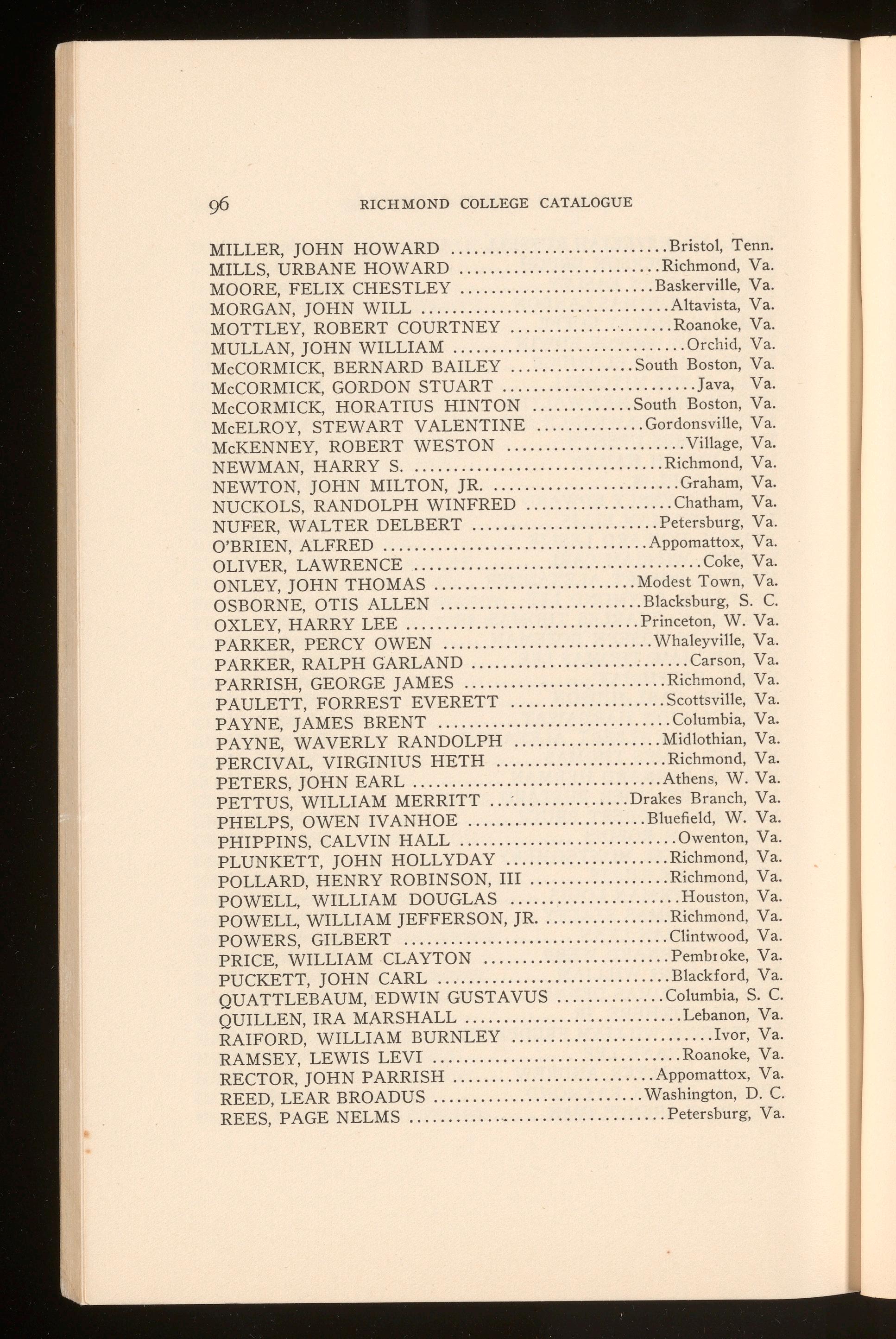
RICHMOND COLLEGE CATALOGUE
MILLER, JOHN HOW ARD ............................ Bristol, Tenn.
MILLS, URBANE HOWARD .......................... Richmond, Va. MOORE, FELIX CHESTLEY ......................... Baskerville, Va. MORGAN, JOHN WILL ................................ Altavista, Va. MOTTLEY, ROBERT COURTNEY ..................... Roanoke, Va. MULLAN, JOHN WILLIAM ................ ........ . .... Orchid, Va. McCORMICK, BERNARD BAILEY ................ South Boston, Va. McCORMICK, GORDON STUART ......................... Java, Va. McCORMICK, HORATIUS HINTON ............. South Boston, Va. McELROY, STEWART VALENTINE .............. Gordonsville, Va. McKENNEY, ROBERT WESTON ....................... Village, Va. NEWMAN, HARRY S................................. Richmond, Va.
NEWTON, JOHN MILTON, JR. ... .................... Graham, Va. NUCKOLS, RANDOLPH WINFRED ................... Chatham, Va. NUFER, WALTER DELBERT ........................ Petersburg, Va. O'BRIEN, ALFRED .................................. Appomattox, Va. OLIVER, LAWRENCE ..................................... Coke, Va. ONLEY, JOHN THOMAS .......................... Modest Town, Va. OSBORNE, OTIS ALLEN .......................... Blacksburg, S. C. OXLEY, HARRY LEE .............................. Princeton, W. Va. PARKER, PERCY OWEN ........................... Whaleyville, Va.
PARKER, RALPH GARLAND ............................ Carson, Va.
PARRISH, GEORGE JAMES .......................... Richmond, Va. PAULETT, FORREST EVERETT .................... Scottsville, Va. PAYNE, JAMES BRENT .............................. Columbia, Va.
PAYNE, WAVERLY RANDOLPH ................... Midlothian, Va.
PERCIVAL, VIRGINIUS HETH ...................... Richmond, Va.
PETERS, JOHN EARL ................................ Athens, W. Va. PETTUS, WILLIAM MERRITT ... ·............... Drakes Branch, Va. PHELPS, OWEN IVANHOE ....................... Bluefield, W. Va. PHIPPINS, CALVIN HALL ............................ Owenton, Va.
PLUNKETT, JOHN HOLLYDAY ..................... Richmond, Va. POLLARD, HENRY ROBINSON, III .................. Richmond, Va. POWELL, WILLIAM DOUGLAS ...................... Houston, Va. POWELL, WILLIAM JEFFERSON, JR. ................ Richmond , Va.
POWERS, GILBERT .................................. Clintwood, Va.
PRICE, WILLIAM CLAYTON ........................ Pembroke, Va. PUCKETT, JOHN CARL .............................. Blackford, Va. QUATTLEBAUM, EDWIN GUSTAVUS .............. Columbia, S. C. QUILLEN, IRA MARSHALL ............................ Lebanon, Va. RAIFORD, WILLIAM BURNLEY .......................... Ivor, Va.
RAMSEY, LEWIS LEVI ................................ Roanoke, Va.
RECTOR, JOHN PARRISH .......................... Appomattox, Va.
REED, LEAR BROADUS ........................... Washington, D. C. REES, PAGE NELMS ............ ..................... Petersburg, Va.
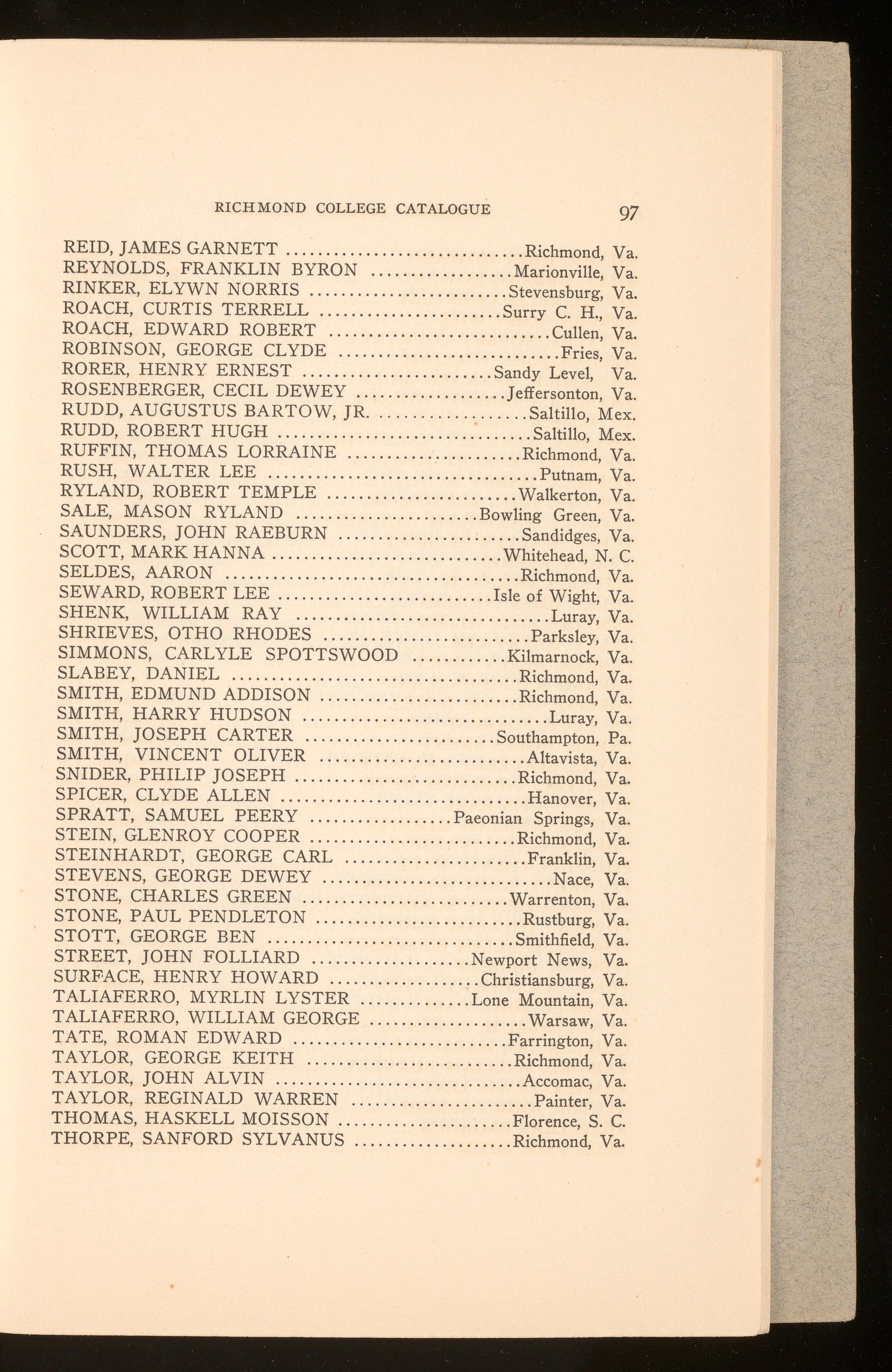
RICHMOND COLLEGE CATALOGUE 97
REID, JAMES GARNETT .............................. Richmond, Va. REYNOLDS, FRANKLIN BYRON .................. Marionville, Va. RINKER, ELYWN NORRIS ......................... Stevensburg, Va. ROACH, CURTIS TERRELL ....................... Surry C. H., Va. ROACH, EDWARD ROBERT ............................ Cullen, Va. ROBINSON, GEORGE CLYDE ............................ Fries, Va. RORER, HENRY ERNEST ........................ Sandy Level, Va. ROSENBERGER, CECIL DEWEY ................... Jeffersonton, Va. RUDD, AUGUSTUS BARTOW, JR. ............. Saltillo, Mex. RUDD, ROBERT HUGH ........................ .'....... Saltillo, Mex. RUFFIN, THOMAS LORRAINE ...................... Richmond, Va. RUSH, WALTER LEE .................................. Putnam, Va. RYLAND, ROBERT TEMPLE ........................ Walkerton, Va. SALE, MASON RYLAND ....................... Bowling Green, Va. SAUNDERS, JOHN RAEBURN ....................... Sandidges, Va. SCOTT, MARK HANNA .................. .......... Whitehead, N. C. SELDES, AARON ..................................... Richmond, Va. SEWARD, ROBERT LEE ........................... Isle of Wight, Va. SHENK, WILLIAM RAY ................................ Luray, Va. SHRIEVES, OTHO RHODES ... ............. ....... Parksley, Va. SIMMONS, CARLYLE SPOTTSWOOD Kilmarnock, Va. SLABEY, DANIEL ..... ..... ......................... Richmond, Va. SMITH, EDMUND ADDISON ......................... Richmond, Va . SMITH, HARRY HUDSON ............................... Luray, Va. SMITH, JOSEPH CARTER ........................ Southampton, Pa SMITH, VINCENT OLIVER .......................... Altavista, Va. SNIDER, PHILIP JOSEPH ............................ Richmond, Va. SPICER, CLYDE ALLEN ........... . ................... Hanover, Va. SPRATT, SAMUEL PEERY ... ..... Paeonian Springs, Va. STEIN, GLENROY COOPER ....................... . Richmond, Va. STEINHARDT, GEORGE CARL ....................... Franklin, Va. STEVENS, GEORGE DEWEY ............................. Nace, Va. STONE, CHARLES GREEN .......................... Warrenton, Va. STONE, PAUL PENDLETON .......................... Rustburg, Va . STOTT, GEORGE BEN .............. ................ Smithfield, Va. STREET, JOHN FOLLIARD .................... Newport News, Va. SURFACE, HENRY HOWARD ................... Christiansburg, Va. TALIAFERRO, MYRLIN LYSTER .............. Lone Mountain, Va. TALIAFERRO, WILLIAM GEORGE .................... Warsaw, Va TATE, ROMAN EDWARD ........................... Farrington, Va. TAYLOR, GEORGE KEITH .......................... Richmond, Va . TAYLOR, JOHN ALVIN ............................... Accomac, Va. TAYLOR, REGINALD WARREN ....................... Painter, Va. THOMAS, HASKELL MOISSON ...................... Florence, S. C. THORPE, SANFORD SYLVANUS .................... Richmond, Va.

RICHMOND COLLEGE CATALOGUE
THRIFT, JOHN HADDON ............................ Dinwiddie, Va.
THRIFT, STANLEY MELVIN ........................... Village, Va.
TILLER, JOHN KENNETH ........................... Richmond, Va.
TIMBERLAKE, BERT E. ................................. Atlee, Va.
TOMS, GEORGE WATERS ............................. Rahway, N. J.
TOWILL, THURMAN BEALE ........................... Salem, Va.
TRIBBLE, HAROLD WAYLAND ...................... Lake City, Fla
TUBB, ROLAND MEFFORD ...................... Bowling Green, Ky
TURNER, GROVER MILTON .................... Sfone Mountain, Va.
UMLAUF, JOHN AUSTIN ............................. Richmond, Va.
VADEN, THOMAS HUNT .............................. Chatham, Va.
VADEN, WILLIAM GARLAND ........................... Paces, Va.
VAUGHAN, PHILIP NEWTON .......................... Louisa, Va.
VIERS, TRIGG MILLER ............................... Lebanon, Va. WALDEN, CHARLES EDWARD ..................... Scottsburg, Va.
WALTON, RICHARD CHANNING .................... Richmond, Va. WARNER, EMORY TAYLOR ............................ Horsey, Va.
WARREN, HARRY OLIVER ........................ Martinsville, Va. WASHINGTON, THOMAS BOYD .................... Woodford, Va.
WATSON, WILLIAM ABNER, JR. Darlington Heights, Va.
WEINBERG, ARNOLD LEWIT ...................... Richmond, Va.
WESCOTT, GEORGE WISE ............................. Painter, Va.
WESTERMAN, DEWEY EVERETTE Clifton Forge, Va.
WETZLER, PAUL JAMES ............................. Waverley, Va.
WHITE, WILBUR LESLIE . ............ Midlothian, Va.
WHITFIELD, JAMES MOREHEAD .................. Richmond, Va.
WHITTED, CLARENCE ALVIS ....................... Scottsville, Va.
WILKERSON, JACOB CLINE .................... Bedford City, Va.
WILKIN, EMANUEL ............ : . ................... Richmond, Va.
WILLIAMS, ALLEN LEE ............... ............... Clover, Va.
WILLIAMS, PRESTON CABOT ................... Hayes Store, Va.
WILLIAMS, RICHARD EVERETT .................. Richmond, Va.
WILLIAMS, ROLAND EVERETTE BOOTHE ...... Meredithville, Va.
WILLIAMS, WILMER WINSTON ....................... Norfolk, Va. WILLIS, JOHN HARRY, JR. ............................ Lignum, Va.
WILLIS, JERE MALCOLM HARRIS .............. Fredericksburg, Va.
WILSON, FREDERICK NOYES ...................... Richmond, Va.
WINGFIELD, ALONZO HAMPDEN .................. Richmond, Va.
WOOD, ROBERT EARL .............................. Troutville, Va.
WOODFIN, WILLIAM CLARENCE .................... Ashland, Va.
WOODFOLK, WYTHE HARRISON .................. Richmond, Va.
WOODLAND, LUTHER MAJOR ...... . .................. Zanomi, Va.
WRIGHT, HORACE AUSTIN ......................... Richmond, Va.
YATES, JAMES LEWIS ............... _............... Roanoke, Va.

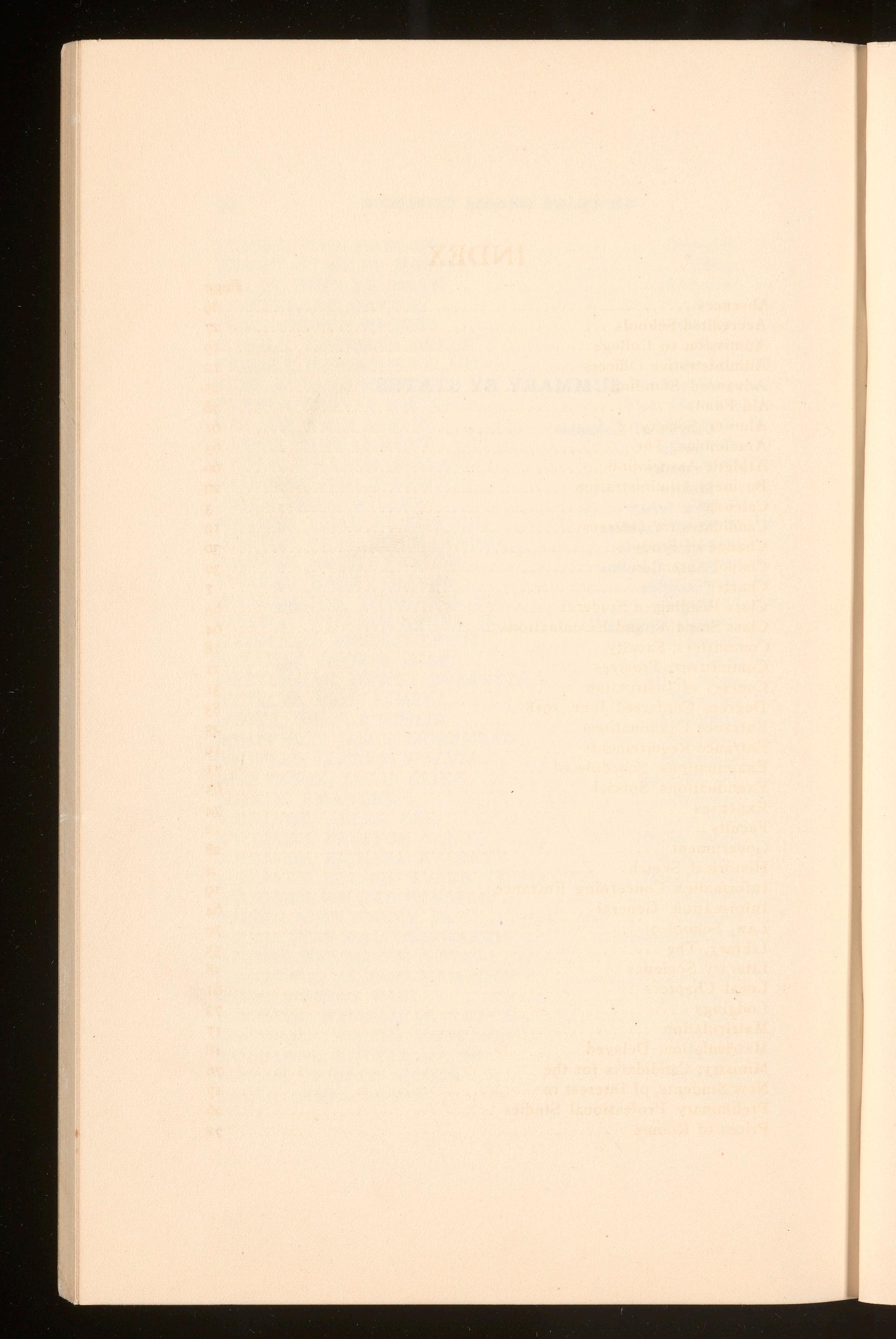
Absences
Accredited Schools ....
Admission to College
Administrative Officers .....................
Advanced Standing
Aid Funds .................
Alumni, Society of ............................................
Arachnidae, The ..............................................
Athletic Association
Business Administration
Candidates for Degrees ........................................
Change of Study ..............................................
Chapel Assembly ..............................................
Charter ........
Class Reading of Students .....................................
Class Standing and Examinations ......
Committees, Faculty .. .................................... Committees, Trustees .........................................
Courses of Instruction ..............................
Degrees Conferred June, 1918 ................................. Entrance Examinations ........................................ Entrance Requirements ........................................
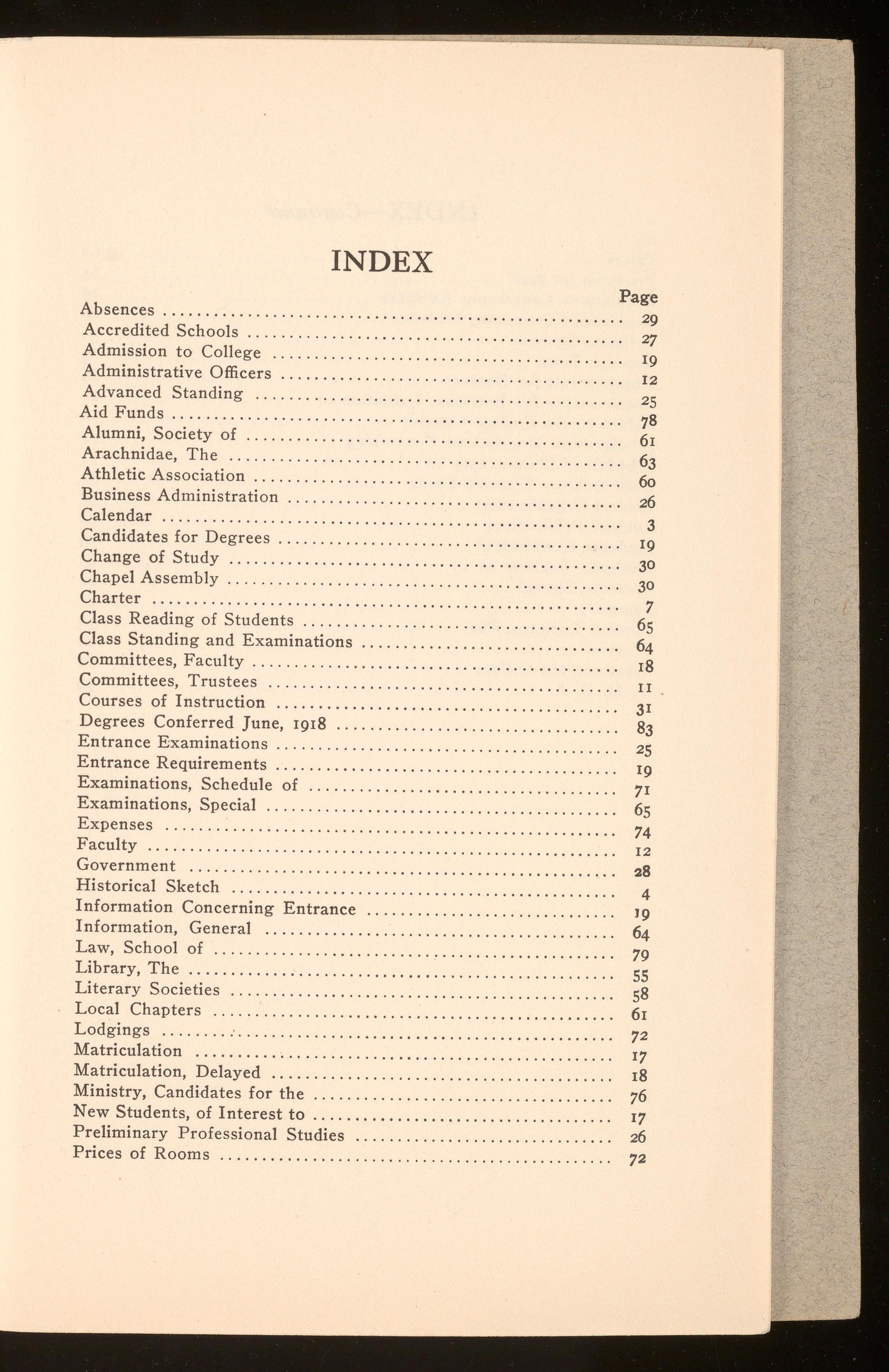
Matriculation .................................................
Matriculation, Delayed ........................................ Ministry, Candidates for the
New Students, of Interest to ...................................
Preliminary Professional Studies ..............................
